

How do You Define a Budget Traveler?
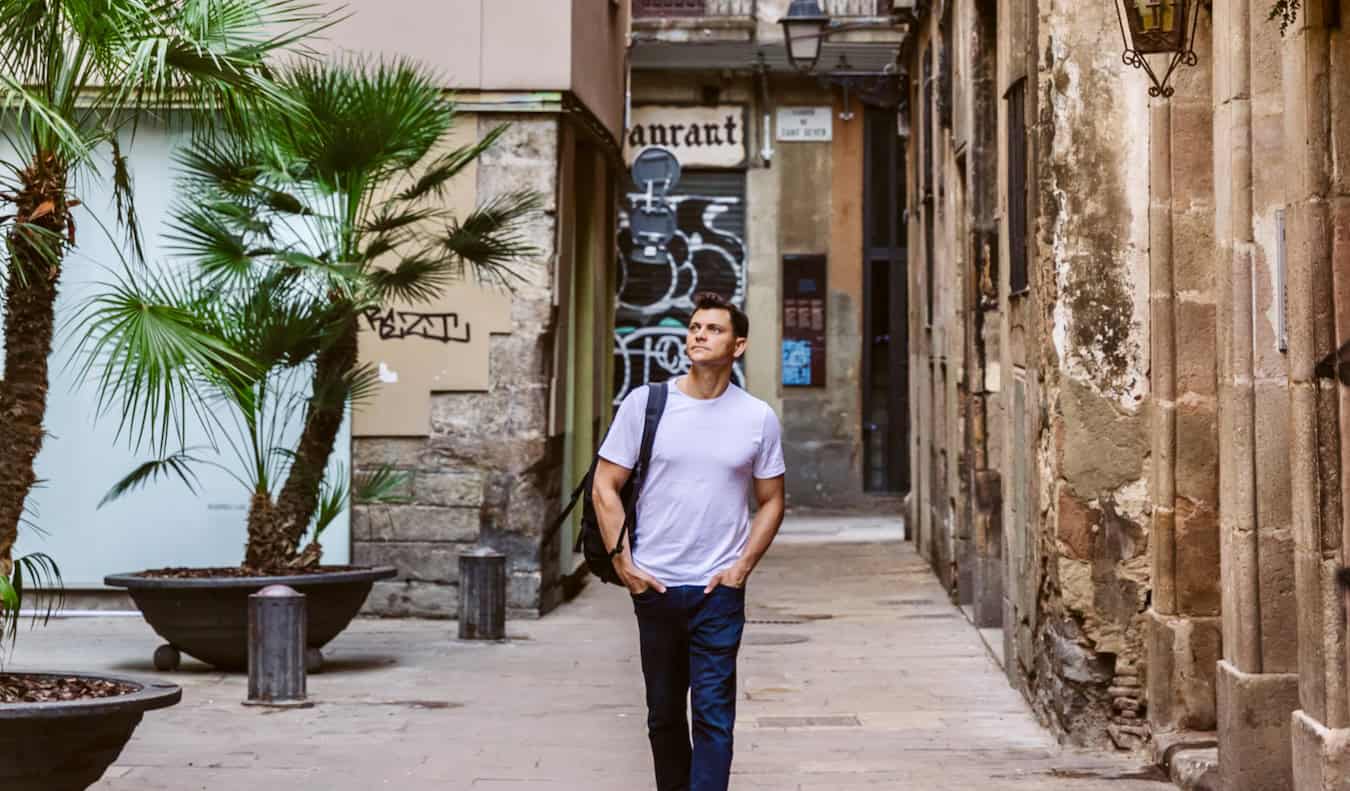
After over a decade of traveling the world on a budget , I’ve met a lot of long-term travelers. Most are amazing, insightful, generous, and open-minded people. They’ve taught me a lot about the world and myself.
Unfortunately, within the long-term travel community, there seem to be some travelers who make travel out to be a competition. Maybe you’ve seen it during your travels. These travelers seem to support an unspoken one-upsmanship about who can visit a place while spending the least amount of money.
To them, it’s a badge of honor to say, “ Well, I did France for X dollars cheaper than you ,” as though the cheaper you go, the more authentic your experience is.
I’ve seen this attitude expressed on my site when I share my cost-of-traveling posts. There are always a few people who say things like, “ Well, I think you overspent because I did it for half the price .”
I’ve never understood this cheapness competition.
To me, being a backpacker or budget traveler has nothing to do with how much money you spend. Rather, it has everything to do with how you spend it. Just as you don’t have to have deep pockets or a trust fund to afford to travel, you also don’t have to live on a shoestring to call yourself a budget traveler.
One of my biggest pet peeves is this obsession with cheapness that I see among a lot of travelers. I’ve never understood why a person would live like a pauper while saving money for a trip , only to then go on that trip and still live like a pauper.
If you only have a small amount of money to spend, better to take a shorter trip doing all the activities you want than constantly saying, “ I would love to do that, but I can’t afford it ” on your long trip.

To me, traveling is about being frugal — not cheap.
It’s about not wasting money on frivolous stuff. Not snacking or buying a million tacky souvenirs or going out and getting drunk every night. It’s about knowing when and where to spend your money, no matter how much you happen to have.
Can places be visited for dirt cheap? Sure. You can be like this guy who mooched off Europeans for 12 months and thereby only spent $5,000 USD . He spent so little by squatting, hitchhiking, never going out, not visiting one museum, and getting free stuff from people.
That’s a great way to travel cheap. I’m sure the locals really appreciated him giving back to the community the way he did. But beyond that, if you camp, cook all your own meals, don’t drink, or never do anything extra that costs money, you can always go somewhere and spend very little.
But I don’t see the point.
Why go somewhere if you’re not going to actually enjoy what that place has to offer?
That’s not to say you have to constantly splash out, but if you aren’t going to learn about the history or see the sights or engage with the people, then why even bother going?
Whenever I visit a place and then do a budget guide for it, I always admit that I overspent. Without a doubt, you can always visit a place cheaper than I did. I overspend because travel is my everyday life, and I like to treat myself once in a while. It’s why I include not only what I spent, but also discuss why I overspent and how much that country should really cost.
My destination guides reflect my idea of what a budget traveler is: someone who spends money smartly, not cheaply. They’re for the traveler who wants to go away, perhaps doesn’t have a lot of money, but still wants to enjoy lots of activities.
I didn’t visit Italy to skip the nice meals and gelato.
I didn’t go to Bordeaux to turn down a wine tour .
I didn’t spend over a year saving money so I could cook cheap dinners every night in a hostel kitchen.
I didn’t go to Australia dreaming of the Outback to turn around and say, “ No, that trip is a bit out of my budget. Maybe another time .”
I remember when I first went overseas. I did everything as cheaply as I could. I skipped doing a lot of things I would have loved to do in the name of “budget travel.” I never took that cooking class in Italy, never went diving in Thailand , never did a wine tour in Australia, and never went inside the Tower of London.
I regret those decisions to this day.
I said I’d do them next time, when I had money.
But you know what? Next time has yet to come. Other things have gotten in the way.
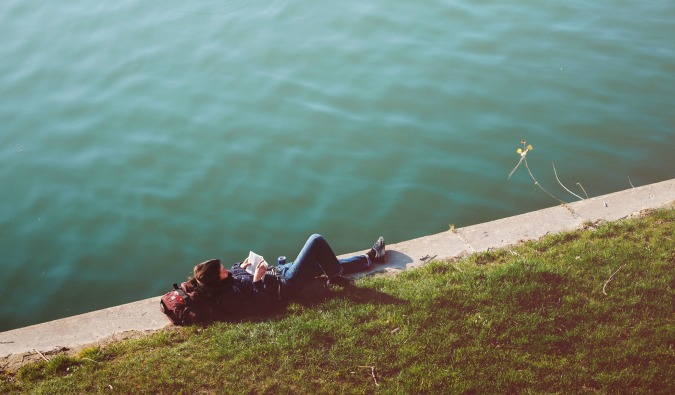
Everyone has his or her own view of what a budget traveler is. To magazines like Budget Travel and Travel and Leisure , or even writers like Rick Steves, “budget” means $120+ USD hotels and $40 USD meals. I read those magazines and look at their prices and go, “ How is THAT budget travel? That is expensive! ” But I guess for their readers who have a bit more money and are most likely solidly middle to upper-middle class, those prices are budget.
At the same time, some people will look at my budget guides and say, “ How is THAT budget? ”
There are always ways to do places cheaper if you’re willing to make the sacrifices. Personally, I don’t mind camping, tenting, and cooking my own meals — when I’m in the wilderness. But as part of a day-to-day travel lifestyle? It’s not for me. And based on my experience, I don’t think it’s realistic for the majority of travelers out there.
One of my biggest budget tips is to know what you want to spend money on before your trip, and then use that as a basis for forming your budget. That way, you don’t overspend while on the road, because you prepared as much as possible. You won’t come home early because you got blindsided by costs.
If you’re aware of your costs, you can better plan your budget and then be frugal with your money — without being cheap. Because you won’t get a second chance as often as you think you will. Spend your money on those great activities you’ve dreamed about instead of skipping them just because they come with a price tag.
Travel isn’t some race to the bottom. You aren’t a better traveler because you went to France and decided not to spend any money.
That doesn’t make you a budget traveler.
I think that just makes you cheap.
At the end of the day, I think the conversation we have within the budget travel community needs to shift from prioritizing “cheapness” to prioritizing “frugality.” A traveler who spends his money wisely, no matter how much he spends, is a budget traveler.
Book Your Trip: Logistical Tips and Tricks
Book Your Flight Find a cheap flight by using Skyscanner . It’s my favorite search engine because it searches websites and airlines around the globe so you always know no stone is being left unturned.
Book Your Accommodation You can book your hostel with Hostelworld . If you want to stay somewhere other than a hostel, use Booking.com as it consistently returns the cheapest rates for guesthouses and hotels.
Don’t Forget Travel Insurance Travel insurance will protect you against illness, injury, theft, and cancellations. It’s comprehensive protection in case anything goes wrong. I never go on a trip without it as I’ve had to use it many times in the past. My favorite companies that offer the best service and value are:
- SafetyWing (best for everyone)
- InsureMyTrip (for those 70 and over)
- Medjet (for additional evacuation coverage)
Want to Travel for Free? Travel credit cards allow you to earn points that can be redeemed for free flights and accommodation — all without any extra spending. Check out my guide to picking the right card and my current favorites to get started and see the latest best deals.
Need Help Finding Activities for Your Trip? Get Your Guide is a huge online marketplace where you can find cool walking tours, fun excursions, skip-the-line tickets, private guides, and more.
Got a comment on this article? Join the conversation on Facebook , Instagram , or Twitter and share your thoughts!
Disclosure: Please note that some of the links above may be affiliate links, and at no additional cost to you, I earn a commission if you make a purchase. I recommend only products and companies I use and the income goes to keeping the site community supported and ad free.
Related Posts
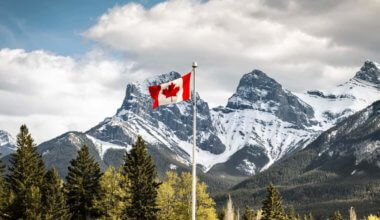
GET YOUR FREE TRAVEL STARTER KIT
Enter your email and get planning cheatsheets including a step by step checklist, packing list, tips cheat sheet, and more so you can plan like a pro!

Winter is here! Check out the winter wonderlands at these 5 amazing winter destinations in Montana
- Plan Your Trip
- Budget Travel
How Do You Define A Budget Traveler? I Have Some Thoughts.
Published: November 10, 2023
Modified: December 28, 2023
by Chrysler Zinn
Introduction
Traveling is a dream for many, but for those on a tight budget, it may seem like an unattainable luxury. However, being a budget traveler doesn’t mean sacrificing the joy of exploration and adventure. In fact, it opens up a world of exciting opportunities to experience new cultures, meet interesting people, and create lifelong memories, all while staying within your financial means.
In this article, we will explore what it means to be a budget traveler and discuss the characteristics that define this unique breed of adventurers. We will also delve into the practical tips on how to make the most of your budget while exploring new destinations, as well as the challenges faced by budget travelers and the benefits they reap.
Whether you are a seasoned budget traveler looking for inspiration or someone who has always dreamed of embarking on a budget-friendly adventure, this article will provide you with valuable insights and advice to help you embrace the buzz and excitement of exploring the world without breaking the bank.
Defining a Budget Traveler
Defining a budget traveler goes beyond just looking at the amount of money they are willing to spend on their travels. It encompasses a mindset and a way of approaching travel that is centered around making the most of limited resources. At its core, a budget traveler is someone who values experiences over material possessions, seeks out affordable alternatives, and embraces the thrill of exploring new destinations on a shoestring budget.
Unlike luxury travelers who prioritize comfort and lavish accommodations, budget travelers prioritize adventure, cultural immersion, and authentic experiences. They are willing to forgo fancy hotels and extravagant dining in favor of staying in budget-friendly accommodations like hostels, guesthouses, or even camping. This enables them to allocate their limited budget towards more meaningful experiences such as trying local street food, participating in local activities, or immersing themselves in the local culture.
But being a budget traveler is not just about saving money, it’s about being resourceful and strategic. It’s about finding the best deals on transportation, accommodations, and activities. It’s about researching and planning ahead to take advantage of discounts, promotions, and off-peak travel times. It’s about being flexible and open to serendipitous experiences and unexpected detours.
Ultimately, being a budget traveler is about embracing the adventure of traveling on a limited budget and approaching each trip with a mindset of curiosity, flexibility, and creativity.
Characteristics of a Budget Traveler
A budget traveler possesses certain key characteristics that set them apart from other types of travelers. These traits enable them to make the most of their limited resources while still experiencing the joys and wonders of travel. Here are some of the defining characteristics of a budget traveler:
- Resourcefulness: Budget travelers are masters of finding creative solutions to make their money stretch further. They research and utilize various money-saving techniques like booking flights during off-peak seasons, taking advantage of rewards programs, and using local transportation options instead of expensive taxis.
- Flexibility: Budget travelers are open to adjusting their plans to take advantage of the best deals. They are willing to be flexible with travel dates, destinations, and accommodations, allowing them to snatch up last-minute deals and discounted rates.
- Curiosity and Open-mindedness: Budget travelers have a genuine curiosity about the world and a willingness to embrace new experiences. They are open to immersing themselves in different cultures, trying local cuisine, and exploring hidden gems off the beaten path, rather than sticking to tourist traps and expensive attractions.
- Research Skills: Budget travelers understand the importance of thorough research. They spend time researching the best and most affordable accommodations, transportation options, and local activities to maximize their travel budget. They also gather information on free or low-cost attractions and events happening in their destination.
- Pack Light Mentality: Budget travelers know the value of packing light. By traveling with only essential items, they can avoid costly baggage fees and easily navigate public transportation, which is often more affordable than private alternatives.
- Appreciation for Local Experiences: Budget travelers value authentic experiences and interactions with locals. They seek out local markets, street food stalls, and community events, fostering connections with the local community and immersing themselves in the culture of their destination.
- Patience and Resilience: Budget travelers understand that not everything goes according to plan, especially when traveling on a tight budget. They approach challenges with patience and resilience, finding alternative solutions and making the best of unexpected situations.
By embodying these characteristics, budget travelers are able to make their travel dreams a reality, all while keeping their finances in check and gaining unique and enriching experiences along the way.
Practical Tips for Budget Traveling
Traveling on a budget doesn’t mean compromising on the quality of your experience. With some careful planning and smart decision-making, you can have a memorable and fulfilling trip without breaking the bank. Here are some practical tips for budget traveling:
- Research and Plan Ahead: Take the time to research destinations, accommodations, and transportation options. Look for budget-friendly accommodations such as hostels, guesthouses, or vacation rentals. Plan your itinerary in advance to make the most of your time and to avoid any last-minute expenses or disappointments.
- Travel During Off-Peak Seasons: Consider traveling during shoulder seasons or low tourist seasons. Prices for flights, accommodations, and attractions are often lower during these periods, allowing you to save money while still enjoying the destination.
- Be Flexible with Dates and Destinations: Stay flexible with your travel dates and be open to exploring lesser-known destinations. This will give you more options to find affordable flights and accommodations that fit within your budget.
- Make Use of Budget Airlines: Look for budget airlines that offer discounted fares. Be sure to compare prices and check for additional fees before making your booking. Keep in mind that budget airlines may have stricter baggage policies, so pack light to avoid extra charges.
- Cook Your Own Meals: Dining out for every meal can quickly become expensive. Consider staying in accommodations with kitchen facilities and prepare your own meals. This allows you to experience local grocery stores and markets while saving money on food.
- Use Public Transportation: Utilize local public transportation whenever possible. It is often more affordable compared to taxis or private transfers. Research transportation passes or cards that offer discounts on multiple journeys.
- Seek Out Free or Low-Cost Activities: Look for free or low-cost attractions and activities in your destination. Many cities offer free walking tours, public parks, and museums with discounted or free admission on certain days.
- Travel with a Group: Consider traveling with a group of friends or family members to split costs. Sharing accommodations, transportation, and group discounts can significantly reduce expenses.
- Embrace the Sharing Economy: Utilize sharing economy platforms like Airbnb, Couchsurfing, or car-sharing services to find affordable accommodations and transportation options. These platforms often offer competitive rates and opportunities to connect with locals.
- Track Your Expenses: Keep track of your spending during your trip to stay within your budget. Use expense-tracking apps or keep a journal of your daily expenditures. This will help you identify areas where you can cut back and ensure you stay on track financially.
By implementing these practical tips, you can stretch your travel budget further and have an incredible journey, filled with unforgettable experiences and memories without breaking the bank.
Challenges Faced by Budget Travelers
While budget travel offers incredible opportunities for adventure and exploration, it is not without its challenges. Being mindful of these challenges can help you better prepare and navigate your budget travel journey. Here are some common challenges faced by budget travelers:
- Limited Funds: The most obvious challenge budget travelers face is limited funds. Having a tight budget means you must carefully plan and prioritize your expenses, making choices about where to allocate your money for the most meaningful experiences.
- Accommodation Trade-Offs: Budget travelers often have to compromise on accommodation options. Staying in budget-friendly accommodations like hostels or guesthouses may mean sacrificing certain luxuries and conveniences associated with higher-priced hotels.
- Transportation Limitations: Limited funds may also restrict your transportation options. Budget travelers may need to rely on public transportation or slower modes of travel rather than more expensive and faster alternatives.
- Language and Cultural Barriers: Traveling on a budget often means venturing off the beaten path and immersing yourself in local cultures. However, this can also present challenges in terms of language barriers and cultural differences. Learning a few basic phrases and being open-minded can help overcome these challenges.
- Lesser Flexibility: While flexibility is a key characteristic of budget travelers, there may be instances where limited funds require more rigid travel plans. Last-minute changes and spontaneous detours may not always be feasible due to financial constraints.
- Sharing Spaces: Budget travelers often share spaces with others to cut costs. Whether it’s dormitory-style accommodations or communal kitchens, it requires patience and adaptability to coexist with strangers and respect their privacy and space.
- Unexpected Expenses: Despite careful planning, there may still be unexpected expenses that arise during your journey. From lost baggage fees to sudden medical emergencies, budget travelers must be prepared to handle unforeseen costs without derailing their entire trip.
- Risk of Overexertion: In an attempt to save money, budget travelers may find themselves constantly researching, organizing, and trying to find the best deals. This can lead to stress and overexertion, which may take away from the enjoyment of the travel experience.
- FOMO (Fear of Missing Out): The fear of missing out on certain experiences or attractions due to budget constraints can be a challenge for budget travelers. It requires accepting that you may not be able to do everything and focusing on the experiences you can afford.
- Longer Travel Time: Opting for cheaper transportation options may result in longer travel times. Budget travelers must be prepared for longer journeys and plan accordingly to ensure they make the most of their time in each destination.
While these challenges may exist, they also present opportunities for growth, learning, and a deeper appreciation for the journey. By adjusting your mindset and being prepared, you can overcome these challenges and embrace the rewards of budget travel.
Benefits of Budget Traveling
While budget traveling comes with its own set of challenges, there are numerous benefits that make it a worthwhile and rewarding experience. Here are some of the key benefits of budget traveling:
- Financial Freedom: The most obvious benefit of budget traveling is the financial freedom it offers. By being mindful of your expenses and making cost-saving choices, you can stretch your budget further and have the opportunity to travel more frequently or for longer durations.
- Authentic Experiences: Budget travelers often find themselves immersing in local cultures and experiencing destinations in a more authentic way. By staying in budget accommodations and exploring local food markets and public transportation, you have the chance to interact with locals, learn about their traditions, and gain a deeper appreciation for the destination.
- Flexibility and Spontaneity: Compared to meticulously planned luxury trips, budget travel allows for more flexibility and spontaneity. With fewer financial constraints, you can make impromptu decisions to visit nearby attractions, take detours, or extend your stay in a place that captures your heart.
- Self-Discovery and Personal Growth: Budget travel pushes you out of your comfort zone and challenges you to adapt to new situations. It builds resilience, problem-solving skills, and self-confidence as you navigate unfamiliar environments and interact with people from different backgrounds.
- Connecting with Like-Minded Travelers: Budget accommodations such as hostels often foster a sense of community, providing opportunities to connect with other travelers who share similar values and interests. This can lead to lifelong friendships and the exchange of valuable travel tips and stories.
- Appreciating the Simple Pleasures: Budget travel encourages you to find joy in the simple pleasures of life. Instead of focusing on material possessions, you appreciate the beauty of nature, the kindness of strangers, and the shared moments with locals and fellow travelers.
- Rediscovering Your Home Country: Budget travel doesn’t always mean traveling to far-flung destinations. It can also involve exploring hidden gems and lesser-known attractions within your own country. This allows you to develop a newfound appreciation for your homeland and discover places you may have overlooked.
- Creating Lasting Memories: In the end, budget travel is all about creating unforgettable memories and experiences that will stay with you for a lifetime. Whether it’s watching a breathtaking sunset, trying a new cuisine, or getting lost in the winding streets of a foreign city, the memories you make while budget traveling are priceless.
Budget traveling can be a transformative experience, offering a unique perspective on the world and the way we travel. It allows you to explore new horizons, develop a deeper understanding of different cultures, and gain a sense of gratitude for the opportunities that travel brings.
Budget traveling is not just a way to save money, but a mindset and approach that opens the door to incredible adventures and meaningful experiences. It is about finding creative solutions, embracing flexibility, and making the most of limited resources to explore the world in an affordable and meaningful way.
While budget travel comes with its fair share of challenges, such as limited funds and trade-offs, the benefits far outweigh the obstacles. Budget travelers have the opportunity to immerse themselves in local cultures, connect with like-minded individuals, and develop resilience and personal growth through their journey.
By implementing practical tips such as diligent research, flexibility with dates and destinations, and making use of budget-friendly options, you can embark on a budget travel adventure that is filled with authentic experiences and unforgettable memories.
So, whether you are exploring far-flung destinations or discovering hidden gems in your own backyard, embracing budget travel allows you to cultivate a deeper appreciation for the world, connect with diverse cultures, and create lasting memories that will enrich your life for years to come.
Remember, being a budget traveler is not just about saving money – it’s about embracing the adventure with an open mind, a sense of curiosity, and a willingness to step outside your comfort zone. Happy travels!

- Privacy Overview
- Strictly Necessary Cookies
This website uses cookies so that we can provide you with the best user experience possible. Cookie information is stored in your browser and performs functions such as recognising you when you return to our website and helping our team to understand which sections of the website you find most interesting and useful.
Strictly Necessary Cookie should be enabled at all times so that we can save your preferences for cookie settings.
If you disable this cookie, we will not be able to save your preferences. This means that every time you visit this website you will need to enable or disable cookies again.
Trending Stories
/images/2018/01/23/navina-side-hustle-mid_MPfEDfV.jpg)
The 15 Different Types of Budget Travelers (Which One Sounds Like You?)
Find out which budget traveler archetype matches your adventure style.
/images/2023/09/21/woman-with-backpack-at-train-station.jpeg)
This article was subjected to a comprehensive fact-checking process. Our professional fact-checkers verify article information against primary sources, reputable publishers, and experts in the field.
We receive compensation from the products and services mentioned in this story, but the opinions are the author's own. Compensation may impact where offers appear. We have not included all available products or offers. Learn more about how we make money and our editorial policies .
When planning a vacation, how important is the budget to you?
You may be someone who would love to travel more, but you’ll want to maximize your planning so you can travel for nearly free on points or miles.
Do you spend a lot of time finding ways to save money on big travel experiences, or are you more focused on sticking to weekend getaways?
Identifying what type of budget traveler you are could help you to better align your aspirations with your financial goals.
If you’re over 50, take advantage of massive travel discounts and trip-planning resources
Over 50 and love traveling? Join AARP today — because if you’re not a member, you could be missing out on huge travel perks. When you start your membership today, you can get discounts on hotels and resorts, airfare, cruises, car rentals, and more.
How to become a member today:
- Go here , select your free gift, and click “Join Today”
- Create your account (important!) by answering a few simple questions
- Start enjoying your discounts and perks!
An AARP membership not only unlocks discounts that could save you hundreds on your next trip, but you’ll also have access to deals on vacation packages, guided tours, and exclusive content to help plan your next getaway.
Important : Start your membership by creating an account here and filling in all of the information (do not skip this step!). Doing so will allow you to take up to 25% off your AARP membership, making it just $12 per year with auto-renewal.
Become an AARP member now
The domestic explorer budget traveler
/images/2023/09/21/man-gazing-summer-field-with-dog.jpeg)
You may be the type of budget traveler who wants to stay in the U.S., as the thought of paying for flights overseas could be out of your comfort zone.
If you’re all about those long weekends within driving distance, make sure you’re doing all you can to save money on gas.
If you like to take short domestic flights, you don’t need to focus on foreign transaction fees. Instead, check out one of the top-rated travel credit cards that offers rewards you can use in the U.S., whether that’s for the flight or for hotel stays.
Own a car? Here's 7 warning signs you're paying too much for car insurance.
The adventure-focused traveler
/images/2023/09/21/woman-kayaking-on-lake-jenny.jpeg)
Lavish meals and fancy tourism destinations are nothing to you compared to a good backpacking, kayaking, or rugged mountain path trip.
You like to camp in a tent, spend as little money as possible by bringing all the gear you need in as little backpack space as possible.
Maximize your savings by visiting the National Parks on free entrance days. Also, consider getting an Interagency Pass Program. If you frequently visit several federal agencies, it could save you a lot of money as it waives most day and entrance fees.
The endless traveler who sticks to a budget
/images/2023/09/21/asian-woman-pointing-at-credit-card.jpeg)
If you’re an endless traveler, meaning you spend a lot of time traveling but keep costs low, you fit into this area. You work to travel but with a financial savviness about you.
The best savings tool for those who travel often is a rewards travel credit card . Look for the lowest interest rate you qualify for that maximizes the types of trips you like to take.
Earn a $250 travel bonus with this incredible card
There's a credit card that's making waves with its amazing bonus and benefits. The Bank of America ® Travel Rewards credit card has no annual fee and you can earn 25,000 bonus points after spending $1,000 in purchases in the first 90 days of account opening .
You can earn additional points just by using this card for your everyday purchases — unlimited 1.5 points per $1 spent on all purchases. The 25,000 bonus points can be redeemed for a $250 statement credit toward travel or dining purchases.
If you want to travel and dine out more, the Travel Rewards card can help you get where you want to go.
The best part? There's no annual fee .
Click here to apply now.
The family traveler on a budget
/images/2023/09/21/family-with-luggage-trolley-at-airport.jpeg)
Your type of trip is to the amusement parks, perhaps just a few towns over for a totally fun gaming center, or, if you’re near the coast, a few days at the beach.
As a family traveler, you’re traveling with more people, and you may not be too focused on the perfect view from a top-of-the-line hotel.
If you’re a family traveler like this, consider visiting amusement parks early or late in the season when discounts are available, and look for two-for-one deals.
The frugal budget traveler
/images/2023/09/21/female-colleagues-enjoying-lunch-outdoors.jpeg)
Your goal is to spend the least amount possible in every situation. You pack your meals, don’t buy souvenirs, and keep things far more practical than tourism-focused.
As a frugal budget traveler, skip the credit cards and stick to a cash-only budget instead. But consider throwing in some extra money for something special to reward your hard work.
The traditional budget traveler
/images/2023/09/21/family-enjoying-beach-holiday.jpeg)
You may go on the same trip year after year and know exactly what to expect. When costs jump, you know it and look for a better deal.
But costs are rising, so expect to spend a bit more each year or consider changing your traditional vacation.
To make the most of these experiences on a budget, be flexible enough to stay a bit further away from those travel destinations you love.
For example, if your family always traveled to Myrtle Beach, check out the more affordable hotels in North Myrtle Beach for a similar experience.
Earn Points and Miles: Find the best travel credit card for nearly free travel
The never-eat-out traveler
/images/2023/09/21/senior-woman-eating-fruits-in-kitchen.jpeg)
As a never-eat-out traveler, you can't stand to pay $4 for a beverage or $20 for some pasta just because someone served it to you.
You like to travel, but you also like to pack lunches and eat breakfast in the hotel room. You may even prefer to cook dinner for your family.
To maximize your savings as this type of traveler, book with care. Skip the condo on the beach and look for one in the city to get the amenities you need for less.
Choose to rent a house where you can cook instead of booking a hotel if there’s a group of you.
The giving-back budget traveler
/images/2023/09/21/multi-ethnic-friends-enjoying-time-together.jpeg)
Your idea of a fabulous trip is one where you can give back, perhaps work through a mission program, or visit a location that needs help building homes.
You may be a part of an organization like Doctors Without Borders or Habitat for Humanity. You’re more interested in putting your money toward helping others, so you spend less on sightseeing and more on inexpensive meals.
If you’re the giving-back traveler, use your credit card for good. Some credit cards allow you to donate your points to charities you like to get behind. Charitable donation credit cards can be fulfilling and super easy to use.
The savvy senior budget traveler
/images/2023/09/21/senior-man-enjoying-natural-park-landscape.jpeg)
Perhaps you’re a bit older, and the type of trips you’re taking are a bit less adventurous than they used to be and more focused on frugal activities.
You’re all about finding the discounts at the restaurants, the senior discount for the early show, or choosing activities where there are more deals to be had.
To maximize savings opportunities, check out programs like AARP that offer help finding discounted travel resources if you become a member.
Unlock exclusive entertainment deals and VIP perks (without a credit card)
Ready to take your entertainment and travels to the next level? Experience the finer things in life with the SELECT card .
No, it's not a credit card, it’s an exclusive membership — and your passport to a world of elite benefits and unforgettable moments.
Imagine sipping complimentary cocktails in downtown Manhattan at KYU NYC or saving 20% on the best sushi in Hollywood Hills at Yamashiro.
Like to shop? Members receive VIP discounts like 15% off at Brooks Brothers, and up to 60% off at Tumi.
Enjoy special offers at luxury hotels like the Four Seasons and Omni Select. For example, you get 15% off at Hyatt Hotels worldwide.
But it’s not just about the hundreds (or thousands) you could save. There are so many features that make you feel like a VIP every day. Like SELECT’s white-glove concierge that assists with bookings, recommendations, or anything you need. And priority access to reservations to some of the year’s hottest events (many not open to the public).
Apply for the SELECT card today
The business traveler
/images/2023/09/21/business-woman-checking-in-at-hotel.jpeg)
The travel you do is often for business, from conventions to client meetings. You enjoy meals out, good quality hotels, sightseeing, and rides to and from the airport catered to you.
How are you a budget traveler? You’re doing it on the company’s dime, but that doesn’t mean you should overspend.
You can earn cash back on a business travel card, which could help support your business’s tax deductions later.
The advanced planner budget traveler
/images/2023/09/21/woman-planning-trip-using-tablet.jpeg)
You travel when there are deals and discounts. You’re not cheap about what you do, but you certainly expect a bargain.
Like heading to Orlando in the fall when discounted dining and hotels are available or a trip to Colorado in the spring when the hotels aren’t packed and offering deals.
If you’re an extravagant budget traveler like this, look for credit cards designed for those destinations, like a Disney-focused rewards card if you plan to spend a trip seeing the Mouse every year.
The Airbnb budget traveler
/images/2023/09/21/female-tourist-renting-apartment-on-vacation.jpeg)
Hotels? No way!
You’re after a great, affordable Airbnb that offers all the comforts of life wherever you travel. You want to relax around a fire, cook a meal, and enjoy a few drinks.
To maximize your savings, choose a longer stay (you’ll save more per night this way), look for newer or less reviewed properties starting at a lower rate, and take advantage of early bird discounts.
Grow Your $$: 11 brilliant ways to build wealth after 40
The travel-rewards budget traveler
/images/2023/09/21/man-booking-flight-online-using-card.jpeg)
Where are you heading for your trip? As a travel-rewards type of budget traveler, you’re after whatever deals the airlines or your credit card is offering to you.
Your goal is to travel to any location, no matter how far away, if you can get free airline miles or a discounted hotel to do so.
If that’s your goal, compare travel credit cards until you find those that offer the biggest bang for your buck based on the airlines you have available to you or the specific locations you like to visit.
The group budget traveler
/images/2023/09/21/hikers-hiking-mountain-at-sunset.jpeg)
Heading off with just one other person is nice enough, but you know you’ll reduce your costs when you can split them several ways.
That’s why you’re a group budget traveler, one that’s okay with sleeping in bunkbeds if it means your costs are lower for the trip.
To maximize savings, consider looking to VRBO and Airbnb instead of hotels for bigger discounts. You may even want to consider renting an RV with friends and splitting all the costs.
The stay-with-family traveler
/images/2023/09/21/happy-family-talking-while-having-lunch.jpeg)
Your vacations are to see family across the state (or even around the world). It’s not so much about seeing the sights as it is about spending time with the grandkids who live in another city or the cousins you only see once every few years.
Staying with family already saves you great money on hotels and perhaps a few meals. Maximize your budget more by checking out the best savings accounts to help you grow your money to use on your next trip.
Bottom line
/images/2023/09/21/woman-at-airport-with-suitcase.jpeg)
When it comes down to it, travel is exciting and a time you’ll likely spend a good amount of money.
If you’re dreaming about retiring early so you can travel more, make sure the credit card you offer fits your current lifestyle.
Maximize any rewards you get to keep your travel costs to a minimum. These travel planning secrets can give you more spending money down the road and the ability to build your savings now.
More from FinanceBuzz:
- 7 things to do if you’re barely scraping by financially.
- Are you a homeowner? Get a protection plan on all your appliances.
- 6 genius hacks Costco shoppers should know.
Easy-to-Earn Unlimited Rewards
Card Details
- $0 annual fee
- Simple, flat-rate rewards
- Flexible redemption options
- Up to 75% preferred Rewards bonus potential
- Earn unlimited 1.5 points per $1 spent on all purchases, with no annual fee and no foreign transaction fees and your points don't expire as long as your account remains open.
- 25,000 online bonus points after you make at least $1,000 in purchases in the first 90 days of account opening - that can be a $250 statement credit toward travel purchases.
- Use your card to book your trip how and where you want - you're not limited to specific websites with blackout dates or restrictions.
- Redeem points for a statement credit to pay for travel or dining purchases, such as flights, hotel stays, car and vacation rentals, baggage fees, and also at restaurants including takeout.
- 0% Intro APR for 15 billing cycles for purchases, and for any balance transfers made in the first 60 days. After the Intro APR offer ends, a Variable APR that’s currently 19.24% - 29.24% will apply. A 3% Intro balance transfer fee will apply for the first 60 days your account is open. After the Intro balance transfer fee offer ends, the fee for future balance transfers is 4%.
- If you're a Bank of America Preferred Rewards® member, you can earn 25%-75% more points on every purchase. That means instead of earning an unlimited 1.5 points for every $1, you could earn 1.87-2.62 points for every $1 you spend on purchases.
- Contactless Cards - The security of a chip card, with the convenience of a tap.
- This online only offer may not be available if you leave this page or if you visit a Bank of America financial center. You can take advantage of this offer when you apply now.
/images/2023/08/22/boa-travel-rewards-credit-card.png)
FinanceBuzz writers and editors score cards based on a number of objective features as well as our expert editorial assessment. Our partners do not influence how we rate products.
on Bank of America’s secure website
Intro Offer
Earn 25,000 online bonus points after you make at least $1,000 in purchases in the first 90 days of account opening - that can be a $250 statement credit toward travel purchases
Why we like it
The Bank of America ® Travel Rewards credit card is great for individuals who enjoy earning rewards and traveling.
Cardholders will enjoy the flexibility to redeem points with no blackout dates and receive a statement credit to pay for travel and dining purchases.
Earn 1.5X points on all purchases everywhere, every time.
/authors/sandy-baker-financebuzz_TjUAOJ3.jpg)
Author Details
Sandy Baker
NomadTreneur
What is budget travel?
adidaswilson
November 17, 2023

In a world filled with endless wanderlust and a desire to explore new horizons, budget travel has emerged as a popular and compelling way to satisfy our thirst for adventure without breaking the bank. But what exactly is budget travel? It’s not just about pinching pennies; it’s a mindset, a lifestyle, and a unique approach to experiencing the world. In this comprehensive guide, we will delve into the concept of budget travel, exploring its definition, principles, benefits, challenges, and providing practical tips for anyone looking to embark on their own budget-friendly adventure.
Defining Budget Travel
Budget travel, in its essence, is a style of travel where individuals or groups prioritize economic efficiency without compromising the quality of their travel experience. Unlike luxury travel, which often focuses on opulence, comfort, and extravagance, budget travel emphasizes resourcefulness, frugality, and the pursuit of authentic and immersive experiences. It’s about making the most of your resources, whether limited or abundant, to explore the world in a meaningful way.
Principles of Budget Travel
Cost-Conscious Planning:
Budget travelers carefully plan their trips to minimize expenses. This includes researching affordable destinations, booking flights during off-peak seasons, and hunting for budget-friendly accommodation options like hostels, guesthouses, or vacation rentals.
Prioritizing Experiences Over Possessions:
Instead of splurging on souvenirs or designer clothes, budget travelers allocate their funds to memorable experiences, such as exploring historical sites, savoring local cuisine, and engaging in cultural activities.
Flexibility and Adaptability:
Budget travel often requires adaptability to capitalize on unexpected opportunities or deals. Being open to change and adjusting plans can lead to cost savings and enriching experiences.
Local Interactions:
One of the core principles of budget travel is engaging with locals and immersing oneself in the local culture. This can lead to unique experiences and insider tips that are often free or low-cost.
Smart Transportation Choices:
Budget travelers opt for budget-friendly transportation options, such as using public transportation, walking, or cycling when possible. They may also consider ridesharing or carpooling for longer journeys.
Cooking and Self-Catering:
Preparing meals or snacks at accommodations with kitchen facilities can save a significant amount of money compared to dining out for every meal. Benefits of Budget Travel
Accessibility:
Budget travel makes it possible for a wider range of people to explore the world. It eliminates the financial barriers that often come with more extravagant forms of travel.
Authentic Experiences:
By immersing themselves in local culture and engaging with residents, budget travelers can experience the authentic essence of a destination, gaining insights that may not be available to luxury travelers.
Freedom and Independence:
Budget travelers have the freedom to customize their itineraries, change plans on a whim, and explore off-the-beaten-path destinations, all without the constraints of pre-packaged tours or rigid schedules.
Personal Growth:
Traveling on a budget often pushes individuals out of their comfort zones, fostering personal growth, self-reliance, and adaptability as they navigate unfamiliar environments and overcome challenges.
Challenges of Budget Travel
Limited Comfort:
Budget accommodations and transportation options may lack the comfort and amenities offered by luxury counterparts. Travelers should be prepared for more basic living conditions.
Sacrificing Convenience:
In some cases, budget travelers may need to sacrifice convenience for cost savings. This can mean longer travel times, less direct routes, or more challenging logistics.
Financial Uncertainty:
While budget travel is cost-effective, unexpected expenses can still arise. Travelers should have a financial safety net to handle emergencies.
Language Barriers:
Communicating in a foreign language can be challenging for budget travelers, especially in non-touristy areas where English may not be widely spoken. Learning basic phrases can help overcome this obstacle.
Safety Concerns:
Budget travelers may sometimes find themselves in less secure areas or situations. It’s essential to prioritize safety and be aware of one’s surroundings.
Practical Tips for Budget Travelers
Set a Realistic Budget:
Determine your budget for the entire trip, including accommodation, transportation, meals, and activities. Stick to it as closely as possible to avoid overspending.
Travel During Off-Peak Seasons:
Consider visiting destinations during their off-peak seasons to take advantage of lower prices on flights and accommodations. Use Travel Apps and Websites:
Utilize travel apps and websites to find deals on flights, accommodation, and activities. Platforms like Skyscanner, Airbnb, and Booking.com can help you discover budget-friendly options.
Embrace Public Transportation:
Opt for local buses, trams, or subways to get around cities. It’s often more affordable and offers a chance to experience daily life like a local. Stay in Budget Accommodations:
Choose budget-friendly accommodations such as hostels, guesthouses, or boutique hotels. Read reviews and research options to find ones that offer a good balance between price and quality.
Cook or Eat Street Food:
Save money on food by eating street food, visiting local markets, and occasionally cooking your meals if your accommodation allows it.
Seek Free or Low-Cost Activities:
Research free or low-cost attractions, museums, and events in your destination. Many cities offer cultural experiences that won’t strain your budget.
Travel Light:
Packing light can save you money on baggage fees and make it easier to use public transportation or walk to your accommodations.
Budget travel is not just a way to see the world on a shoestring budget; it’s a mindset that prioritizes experiences, adventure, and cultural immersion over material possessions and luxury. By following the principles of cost-conscious planning, prioritizing experiences, and embracing local culture, budget travelers can embark on memorable journeys that are accessible to all. While it comes with its challenges, with careful planning and adaptability, anyone can enjoy the rewards of budget travel and create lasting memories while exploring the world. So, pack your bags, plan your adventure, and embrace the thrills of budget travel as you set out to discover the wonders of our diverse planet.
Exploring the World on a Shoestring: Understanding the Essence of Budget Travel
Case Studies: Real-World Budget Travel Success Stories
To further illustrate the principles and benefits of budget travel, let’s delve into a few real-world success stories of budget travelers who have explored the world without breaking the bank.
The Hitchhiking Adventurer:
Meet Sarah, a budget traveler who embarked on a journey across Europe armed with her backpack and a passion for adventure. Sarah relied on hitchhiking as her primary mode of transportation, which not only saved her money but also allowed her to meet interesting locals along the way. She camped in free or low-cost campsites and embraced the beauty of the great outdoors. Sarah’s journey was a testament to the freedom and flexibility that budget travel offers, as she explored picturesque landscapes and made lifelong memories. The Backpacking Nomad:
Jack, a young backpacking enthusiast, spent a year traveling through Southeast Asia on a tight budget. He stayed in affordable hostels, enjoyed delicious street food, and explored ancient temples and lush jungles. Jack’s journey highlighted the value of immersing oneself in local culture, as he learned about traditional customs, local cuisines, and made friends with fellow travelers from around the world. His adventure was a testament to the personal growth and enriching experiences that budget travel can provide. The Volunteering Voyager:
Emily chose to combine her passion for travel with a desire to give back to communities in need. She volunteered at various organizations around the world, trading her skills and time for accommodation and meals. This allowed her to explore different cultures while making a positive impact on the lives of others. Emily’s journey exemplified the principle of prioritizing experiences over possessions, as she found fulfillment in helping others and forming lasting connections with locals.
Budget travel is more than just a cost-saving endeavor; it’s a transformative and rewarding way to explore the world. As we’ve explored in this article, the principles of budget travel include cost-conscious planning, prioritizing experiences, adaptability, local interactions, smart transportation choices, and self-catering. While budget travel comes with its set of challenges, from limited comfort to language barriers, it is accessible to anyone with the right mindset and preparation.
By setting a realistic budget, leveraging travel apps and websites, embracing public transportation, and seeking out free or low-cost activities, budget travelers can maximize their experiences without overspending. Real-world success stories like those of Sarah, Jack, and Emily demonstrate that budget travel can lead to unforgettable adventures, personal growth, and a deeper appreciation for the world’s diverse cultures.
So, whether you’re a seasoned budget traveler looking for your next adventure or someone considering their first budget-friendly journey, remember that the essence of budget travel lies in the pursuit of meaningful experiences, cultural immersion, and the joy of discovering the world while keeping your wallet intact. Pack your bags, plan your adventure, and embark on your own budget travel journey—it’s a decision you won’t regret, and the memories you create will last a lifetime.
most recent

North America
Best barber shops in toronto neighborhoods.

Best Places to Live in Southern Italy

1 Week Vietnam Itinerary
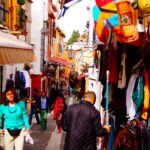
10 Day Itinerary Spain

Yanchep National Park Caves

Airbnb Review Example
nomadtreneur
PH +1 000 000 0000
24 M Drive East Hampton, NY 11937
© {{2023}} Nomadtreneur
- Credit cards
- View all credit cards
- Banking guide
- Loans guide
- Insurance guide
- Personal finance
- View all personal finance
- Small business
- Small business guide
- View all taxes
You’re our first priority. Every time.
We believe everyone should be able to make financial decisions with confidence. And while our site doesn’t feature every company or financial product available on the market, we’re proud that the guidance we offer, the information we provide and the tools we create are objective, independent, straightforward — and free.
So how do we make money? Our partners compensate us. This may influence which products we review and write about (and where those products appear on the site), but it in no way affects our recommendations or advice, which are grounded in thousands of hours of research. Our partners cannot pay us to guarantee favorable reviews of their products or services. Here is a list of our partners .
How to Travel on a Budget for Beginners

Many, or all, of the products featured on this page are from our advertising partners who compensate us when you take certain actions on our website or click to take an action on their website. However, this does not influence our evaluations. Our opinions are our own. Here is a list of our partners and here's how we make money .
Wondering how to travel on a budget? While it may seem like traveling is exclusive to those with cash to spare, you don’t have to overspend in order to get out of town. There are plenty of ways to travel on a budget — including using reward points or miles and traveling during ideal times— that can end up saving you a lot of money. Here's travel guide for beginners on a budget.
Start planning early
If this is your first big trip, odds are you’ve already started planning. That’s good — the sooner you start, the more time you have to save money . Travel prices rise and fall with demand, and the cycle fluctuates as your travel dates get closer.
Beginning your planning early gives you the best chance of finding discounted hotel rooms, cheaper flights and other less-expensive activities. Although you won’t find the cheapest prices far out in advance (as we mentioned, it’s a cycle) keeping an eye on rates will allow you to jump on them and book when they drop.
» Learn more: How to account for inflation in your travel budget
Book at the right time
This bears repeating. Why? Because when you book and when you travel can make a huge difference in the price of your vacation. This applies to flights and hotels.
Confused about when the "right time" to book will be? There are multiple free tools available online to help you.
One of the easiest to use is the price tracking tool available via Google Flights. This service lets you know how the fare you’re looking at purchasing compares with past pricing. It also lets you know if rates are high or low compared with average costs.
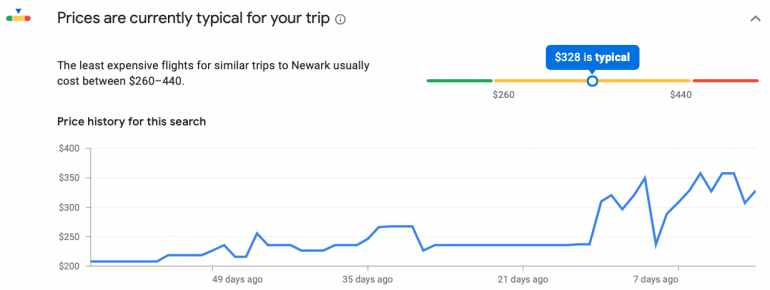
If the flight you’re considering does appear to be expensive, Google Flights also features a price tracker alert system that will email you when fares drop. You can toggle this feature on within the search bar.

According to Expedia, the best day of the week to buy your airline ticket is on Sunday.
Skip overpriced tours
There’s nothing like getting out into a new city to explore. But how much of that exploring can you do on your own? With the information available online, it’s simple and easy to conduct your own tour for free rather than paying for a guide.
If this doesn’t sound appealing to you, consider instead one of the many free tours that many major cities offer. These walking tours will give you tons of information about the area completely free of charge, though gratuities are welcomed.
Otherwise, apps such as Spotted By Locals , Tripadvisor and Rick Steves offer comprehensive information for many large cities. Often this is free, but sometimes you’ll need to pay a nominal fee.
Use reward points
One of our favorite ways to save money includes redeeming reward points for travel. Some of your biggest expenses, such as hotels and flights, can be wiped away by using reward points during your trip.
This type of travel takes planning; you’ll need to accrue enough points to make a travel redemption. Much of the time, this is accomplished through welcome bonuses earned when you open a travel credit card .
For example, a round-trip flight from Los Angeles to Paris costs $1,255 at the beginning of November 2022.
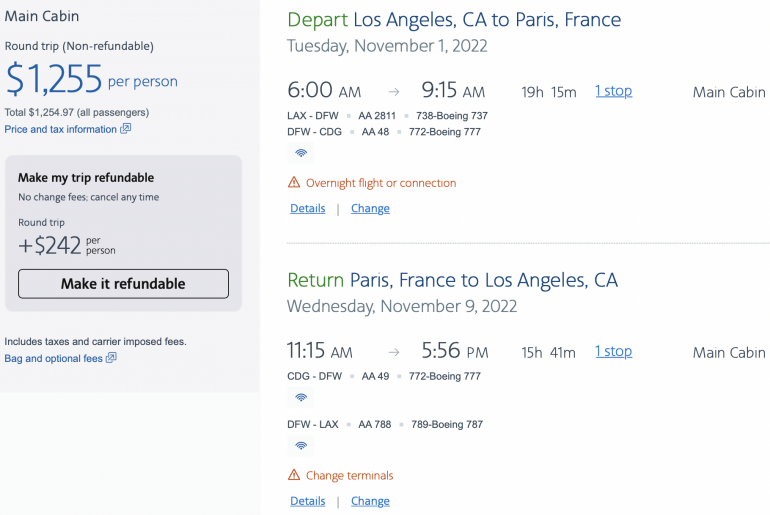
This same flight can be booked using 45,000 American Airlines miles .
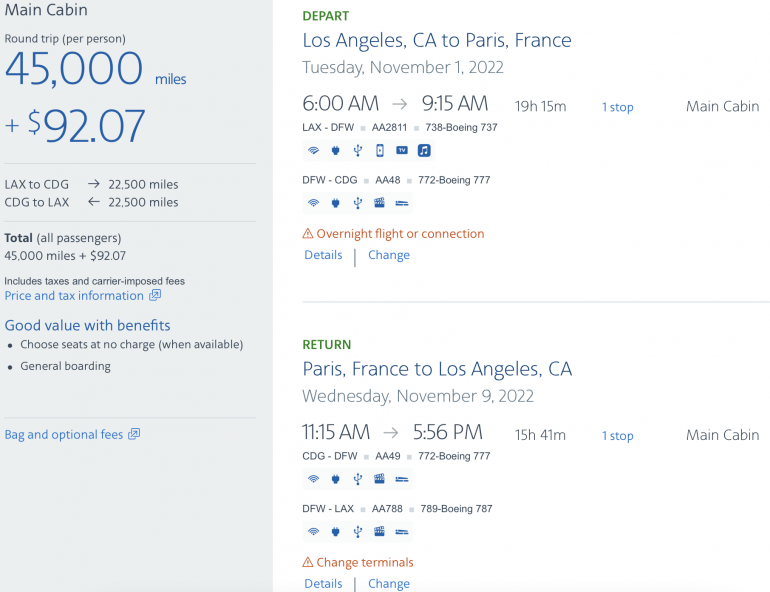
While 45,000 miles may seem like a lot, you can earn this amount of miles with ease. For example, you can earn more than enough miles needed for this flight with the AAdvantage® Aviator® Red World Elite Mastercard® welcome bonus: Earn 60,000 AAdvantage® bonus miles after making your first purchase and paying the $99 annual fee in full, both within the first 90 days. The first purchase could be a stick of gum or a cup of coffee — it doesn’t matter.
Many co-branded airline credit cards also offer perks like free checked bags and priority boarding, saving you time and money.
The same can be said of hotel credit cards . Most major hotel chains have co-branded credit cards, including Hilton , Marriott , IHG , Hyatt , Choice and Wyndham . These credit cards — and their sign-up bonuses — can go a long way toward cutting costs on your vacation.
Even better, many of these credit cards offer complimentary elite status . Elite status can grant you perks such as free breakfast, room upgrades, free WiFi and late checkout.
It’s a good idea to consider booking hotel rooms using points, especially for budget family travel. Sometimes hotels charge more for additional people in your room, but these costs won’t translate to reward redemptions. You’ll generally pay the same standard price as long as you can all safely occupy the room.
» Learn more: The best travel credit cards right now
Travel in the off-season
Along with using reward points, taking your trip during the offseason is another excellent way to save money. Each destination has a peak period of demand during which prices will be inflated.
This will include flights, hotels, tours and even dining, making traveling on a budget difficult. In Europe, the high season is in the summer, when most people come to visit.
During this time, flights will be at their most expensive. Remember the above example featuring that flight to Paris for $1,255? A similar flight during peak season will cost $2,070 round trip.
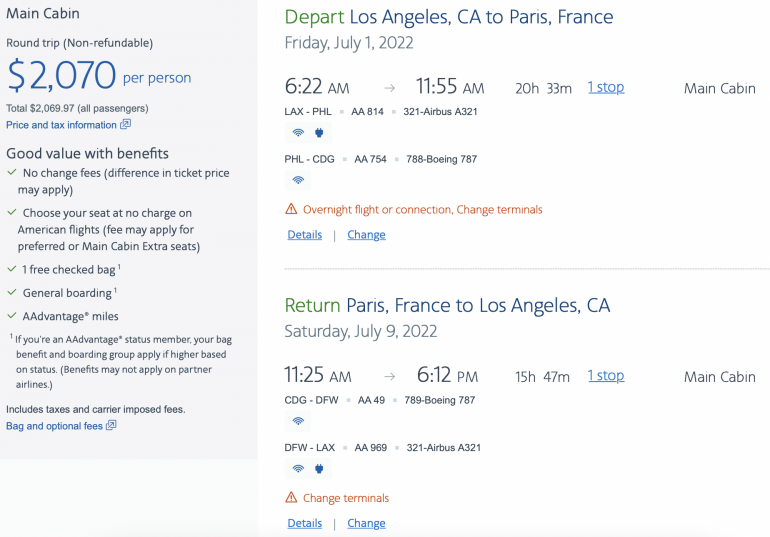
As you can see, even if you’re paying cash for your flights you’ll be saving over $800 by taking your trip when demand is lower.
» Learn more: Why "shoulder season" is the best time to travel
If you want to travel on a budget
Vacations don’t have to be expensive. Whether you’re a vacation veteran or a travel newbie, it’s easy to save on trips by starting planning early and keeping an eye on prices.
More importantly, taking advantage of reward points can significantly cut down on flight and hotel costs. Otherwise, traveling during the offseason can help drop expenses and allow you to travel on a budget.
How to maximize your rewards
You want a travel credit card that prioritizes what’s important to you. Here are some of the best travel credit cards of 2024 :
Flexibility, point transfers and a large bonus: Chase Sapphire Preferred® Card
No annual fee: Wells Fargo Autograph℠ Card
Flat-rate travel rewards: Capital One Venture Rewards Credit Card
Bonus travel rewards and high-end perks: Chase Sapphire Reserve®
Luxury perks: The Platinum Card® from American Express
Business travelers: Ink Business Preferred® Credit Card

on Chase's website
1x-5x 5x on travel purchased through Chase Travel℠, 3x on dining, select streaming services and online groceries, 2x on all other travel purchases, 1x on all other purchases.
60,000 Earn 60,000 bonus points after you spend $4,000 on purchases in the first 3 months from account opening. That's $750 when you redeem through Chase Travel℠.

1.5%-5% Enjoy 5% cash back on travel purchased through Chase Travel℠, 3% cash back on drugstore purchases and dining at restaurants, including takeout and eligible delivery service, and unlimited 1.5% cash back on all other purchases.
Up to $300 Earn an additional 1.5% cash back on everything you buy (on up to $20,000 spent in the first year) - worth up to $300 cash back!

on Capital One's website
2x-5x Earn unlimited 2X miles on every purchase, every day. Earn 5X miles on hotels, vacation rentals and rental cars booked through Capital One Travel, where you'll get Capital One's best prices on thousands of trip options
75,000 Enjoy a one-time bonus of 75,000 miles once you spend $4,000 on purchases within 3 months from account opening, equal to $750 in travel.


What is Budget Travel? Meaning, Origin, Popular Use, and Synonyms

What is Budget Travel?
Budget Travel refers to a style of travel where individuals or groups aim to minimize their expenses while exploring various destinations. The primary focus of budget travel is to make cost-conscious decisions without compromising the overall travel experience. This approach involves seeking affordable accommodation , using public transportation, finding budget-friendly dining options, and engaging in free or low-cost activities to maximize the travel budget.
Origins of the term Budget Travel
The concept of budget travel has existed for centuries, with travelers seeking ways to economize their journeys and extend their adventures with limited financial resources. However, the term “Budget Travel” gained prominence in the late 20th century, especially with the rise of independent travel and backpacking culture, where travelers sought to explore the world on a shoestring budget.
Where is the term Budget Travel commonly used?
The term “Budget Travel” is commonly used in the travel industry , including guidebooks, travel blogs, and travel agencies. It is prevalent among travelers who prioritize financial prudence and are seeking to make the most of their travel experiences without overspending.
Synonyms of the term Budget Travel
While “Budget Travel” is the widely recognized term, it is also known by the following synonyms:
- Economical Travel: Referring to the practical and cost-conscious approach to travel.
- Affordable Travel: Emphasizing the focus on affordability and value.
- Thrifty Travel: Describing the practice of traveling in a resourceful and economical manner.
4 Different Budget Traveler Types
Here’s a surprising fact: some of the most stunning destinations are also the most budget-friendly. From the vibrant streets of Vietnam to the serene beaches of Greece, affordable gems are waiting to be discovered.
I’ll guide you through savvy travel tips and secrets that’ll make your wanderlust a reality, not a bank-breaking fantasy. We’re talking about making the most of every dollar, without skimping on the experiences. Get ready to pack your bags and begin on an adventure that’s as kind to your wallet as it is exhilarating for your soul.
Understanding the Budget Traveler Mindset
As a budget traveler myself, I’ve learned it’s not just about saving money ; it’s about making the most out of every experience without being very costly. Traveling on a budget doesn’t mean you have to miss out on incredible experiences. It often means the opposite. You see, diving into cultures, exploring off-the-beaten paths, and connecting with locals isn’t typically found in the glossy pages of travel magazines—it’s discovered through the adventurous spirit of budget travel.
Embrace Local Experiences
One of the most enriching aspects of travel is immersing yourself in local cultures. I’ve found that staying in local guesthouses, eating at street food stalls, and using public transportation not only saves money but also opens up a world of authentic experiences. In Vietnam, for example, I spent mere dollars on a street food tour in Hanoi and learned more about the culture and cuisine than I could have at any high-end restaurant.
Finding the Road Less Traveled
Budget travelers have a knack for seeking out destinations that are not only cost-effective but also rich in culture and experience. Places like the mountains of Nepal or the beaches of Greece offer breathtaking experiences that don’t come with a high price tag. By avoiding tourist traps and embracing less popular destinations, I’ve uncovered hidden gems that are both affordable and unforgettable.
Making Connections That Last
Perhaps the most valuable aspect of budget traveling is the people you meet. Staying in hostels, joining local tours, or attending community events are fantastic ways to connect with fellow travelers and locals alike. These connections often lead to insider tips, shared meals, and sometimes, lifelong friendships.
For those interested in long-term budget travel , these connections become even more essential, providing support and community over extended periods
Summarizing, adopting a budget traveler mindset isn’t just about spending less; it’s about experiencing more. It’s about seeking adventure, connecting with cultures, and creating priceless memories. Through savvy planning, embracing local experiences, and remaining open to the unexpected, budget travel reveals a world of possibilities that enrich both the journey and the traveler.
1. Choosing Budget-Friendly Destinations
When it comes to stretching your dollars on the road, choosing the right destination makes all the difference. I’ve learned that finding a place where my budget goes further doesn’t mean I have to skimp on the experience. In fact, it’s quite the opposite. It means I get to dive deeper, stay longer, and explore more.
One of my top tricks for picking a budget-friendly destination is to look beyond the usual tourist hotspots. Instead of Paris, why not try the lavender fields and vineyards of Provence? Swap out a crowded beach in Spain for the lesser-known but equally stunning coastlines of Portugal’s Algarve region. These kinds of choices have not only saved me a ton, but they’ve also led me to some of the most unforgettable experiences of my life.
- Nepal : Beyond the allure of Mount Everest lies a country rich in culture and light on the wallet. From affordable trekking options to guesthouses and local eats, Nepal is a dream for the budget traveler.
- Bolivia : This South American country offers incredible bang for your buck. The Salt Flats, the Potosi mines, and Lake Titicaca are just a few highlights that won’t expensive.
- Vietnam : Known for its incredible cuisine, vibrant culture, and stunning landscapes, Vietnam remains incredibly affordable. You can enjoy a full meal for less than the price of a coffee back home.
Here’s a little chart based on my own experiences in these countries, to give you a taste of what your daily budget could look like:
Remember, part of the adventure is in the unexpected. Finding those local spots, those deliciously cheap eats, and those free or low-cost attractions can significantly enhance your travel experience. It’s not always about the cheapest options but finding value and making the most of every dollar.
2. Accommodation Hacks for Budget Travelers
Finding a place to crash that doesn’t expensive is one of my top priorities when I’m mapping out my trips. I’ve picked up a few tricks along the way that I’m eager to share. From hostels to unique lodgings, there’s a world of options out there that go beyond your typical hotel stay.
Stay in Hostels : Hostels aren’t just for the young or the solo traveler; they’re a goldmine for anyone looking to stretch their dollars. Many offer private rooms plus dormitory-style accommodations, making them suitable for various types of travelers. What I love about hostels, besides the price point, is the community vibe. There’s always someone in the common area planning their next adventure, and it’s the perfect place to pick up tips or even find travel companions.
Embrace Local Homestays : On a trip to Vietnam, I stayed with a local family for a few nights, and it was an eye-opening experience. Not only was it affordable, but the cultural immersion and the homemade meals were priceless. Services like Airbnb and Couchsurfing make finding these gems easier than ever. Plus, your hosts can provide invaluable insights into the local area.
Consider Off-Season Travel : Accommodation prices can fluctuate wildly depending on the time of year. Traveling during the off-season can lead to significant savings and a more authentic experience without the crowds. For instance, visiting the Greek islands in the early fall or late spring can slash your lodging costs in half while still allowing you to enjoy good weather and open attractions.
Being smart about where you stay can make a huge difference in your travel budget. By thinking outside the traditional hotel box and considering options like hostels, homestays, and timing your travels, you can save a bundle and enrich your journey at the same time. Remember, it’s all about immersing yourself in the local culture and finding those under-the-radar spots that make traveling so rewarding.
3. Transportation Tips to Save Money
When it comes to stretching that travel budget, every choice matters, especially with transportation. Let me share some gems I’ve discovered on my journeys that can save you a hefty sum and add to your adventure.
Embrace Public Transport
I know what you’re thinking, “Public transport? On vacation?” But hear me out. Buses, trains, and even ferries offer a window to the everyday lives of locals that you just don’t get from a taxi window. Not to mention, it’s significantly cheaper . In cities like Bangkok or Berlin, I’ve navigated the public transport systems and not only saved money but also stumbled upon places I wouldn’t have found otherwise.
The Magic of Ride-Sharing
With the rise of apps like Uber and Lyft, catching a ride has never been easier or, in some cases, cheaper. But the real game-changer for budget travelers is carpooling options—services like BlaBlaCar connect you with drivers who have empty seats on your route. It’s a win-win: you save money, and you might make a new friend.
Biking or Walking Tours
Whenever I hit a new city, I look for bike rental shops or free walking tours. Not only is this incredibly budget-friendly , but it also offers an immersive experience. There’s something about wandering through narrow alleys on foot or pedaling down bustling streets that connects you to a place in a way no bus tour ever could.
Off-Peak Travel Perks
Timing can make a big difference in transportation costs. For instance, traveling overnight on a train or bus can save you a night’s accommodation. Plus, off-peak hours often mean lower fares and less crowded transport, making for a more comfortable journey.
Throughout my travels, I’ve found that each mode of transportation brings its own set of adventures and savings. Opting for less conventional methods not only benefits your wallet but also enriches your travel experience. Whether it’s sharing stories with a local on a train ride through the countryside or cycling through hidden city paths, these moments build a rich world of memories that make each trip unforgettable.
4. Embracing Local Culture on a Budget
I’ve always believed the essence of travel lies in immersing yourself in the local culture. It’s not just about ticking off tourist spots from your list, but also about feeling the heartbeat of the place. And the good news? You don’t have to spend a fortune to do so. Over the years, I’ve gathered a few tips and tricks that have allowed me to dive deep into local cultures without being very costly.
Get Involved in Local Festivals and Events
One of my favorite ways to feel the pulse of a place is to attend local festivals and events. These gatherings are often free or have a minimal entry fee, making them perfect for budget travelers. They offer a unique glimpse into the traditions, food, and communal spirit of the area. I remember stumbling upon a small-town festival in Italy where the warmth and vibrancy of the locals turned it into one of my most cherished travel memories.
Volunteering can be a wonderful avenue not just for contributing positively to a place, but also for experiencing its culture firsthand. I’ve volunteered in a few countries, and it’s given me insights and connections I could never have made otherwise. Projects can range from community development, and wildlife conservation, to teaching English. Websites like Workaway or WWOOF host listings that exchange work for accommodation and sometimes meals, making it an attainable option for those on a budget.
Take Local Cooking Classes
Food is a universal language and a delicious entry point into a new culture. Taking a local cooking class has allowed me to bring a piece of my travels back home. These classes give you the chance to learn about the ingredients, and culinary traditions, and maybe even share a meal with a local family. It’s an intimate experience that’s often possible to book through hostels or local tourism boards at a reasonable cost.
Learn the Language
Even a few basic phrases can transform your travel experience. Locals appreciate the effort, and it often leads to more meaningful interactions and discoveries. I’ve had doors opened, both literally and metaphorically, simply because I tried to speak in the local tongue. There are plenty of free apps and online resources to learn the basics before you arrive or while on the go.
By embracing these approaches, you not only save money but also enrich your travel experiences in ways that stay with you long after you’ve returned home.
Frequently Asked Questions
How can budget travelers immerse themselves in local cultures.
Budget travelers can immerse themselves in local cultures by attending local festivals and events, volunteering for unique insights, taking local cooking classes to learn about culinary traditions, and learning the local language for more meaningful interactions.
Are there ways to experience local cultures for free?
Yes, many local festivals and events are free to attend. Additionally, volunteering opportunities can offer deep cultural immersion without any cost, providing both unique insights and a chance to give back to the community.
Can learning the local language enhance my travel experience?
Learning the local language, even just a few basic phrases, can significantly enhance your travel experience. It helps in fostering more meaningful interactions with the locals and offers a deeper understanding of the culture.
Why is it important to immerse oneself in local cultures while traveling?
Immersing oneself in local cultures while traveling enriches the travel experience beyond just sightseeing. It leads to the creation of lasting memories, builds connections with the places visited, and offers a more profound understanding and appreciation of diverse ways of life.
Similar Posts

Dried soup mixes recipes for quick and delicious meals
For the millennial adventurers who thrive on exploring the world and its diverse cultures, discovering unique local cuisines is part of the journey. The joy of travel doesn’t have to end once you return home; you can recreate the flavors of your adventures with homemade dry soup mix recipes. Not only are they a nod…

The Most Useful Travel Websites
Just dropped a treasure trove of over 100 travel websites and apps to supercharge your next trip!

Discovering the best trip planning apps for stress-free travel
In the era of digital nomads and adventure seekers, the need for efficient travel planning has never been more vital. Whether you’re looking to immerse yourself in cultural hotspots, capture stunning photography, or find off-the-beaten-path destinations, having the best trip planning app at your fingertips is essential. These apps not only help streamline your travel…
First Time Nudist Guide: Tips for First-Timers
Discover essential tips for first-time nudists, from packing lists to etiquette. Embrace the naturist lifestyle with confidence and enjoy social opportunities!

Ultimate guide to party travel tours: Top destinations and tips
Traveling is not just about seeing new places; it’s about experiencing them. And what better way to immerse yourself in a destination than by diving into its party scene? Whether you’re a solo adventurer or part of a group, there’s a certain thrill in joining party travel tours that promise nights of fun, new friendships,…

Are backpacks safe for travel: Pros, cons and tips
Traveling is about the adventure, the stories, and the unforgettable experiences. As a wanderlust-driven individual between the ages of 25 and 40, you understand the importance of traveling light and secure, especially when it comes to your belongings. With the rise of travel, the question often arises: are backpacks safe for travel? In this article,…
Here’s How to Travel if You’re on a Budget
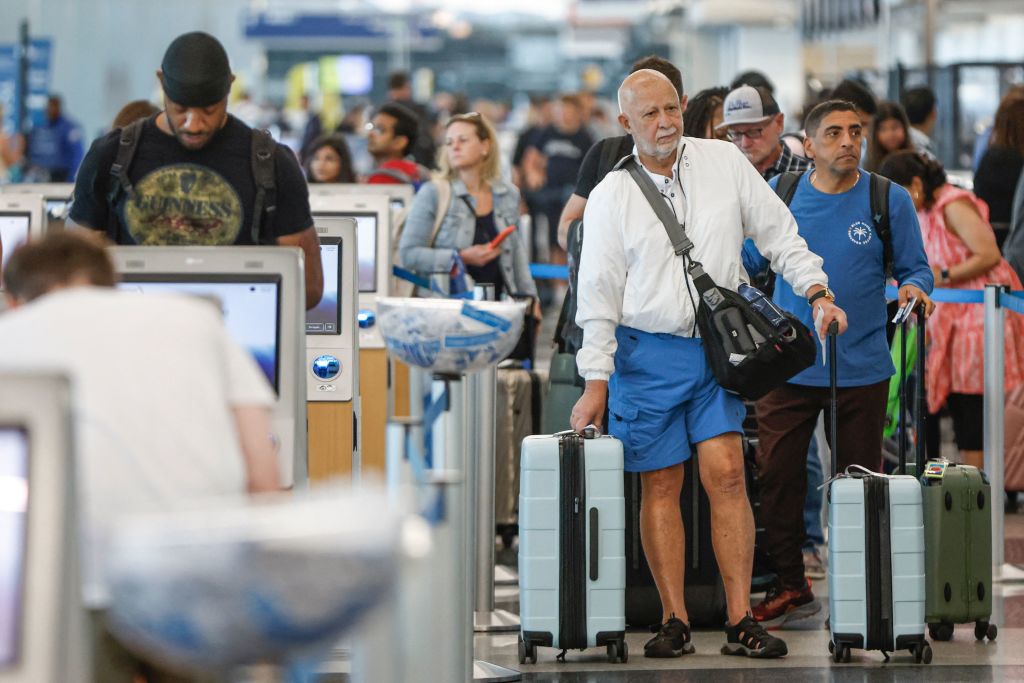
For travelers, planning a vacation doesn’t have to mean breaking the bank.
More than half of Gen Z adults are frequent travelers, taking at least three annual trips for leisure, according to data research group Morning Consult . And many of these travelers come from households that are less financially affluent—meaning they are not letting lower funds limit their travel excursions to one summer vacation a year.
Experts say that numerous apps and third party sites make traveling on a budget possible; it’s just a matter of knowing how to best use these resources to meet financial constraints while checking off must-haves when visiting particular locations.
“First, you’ve got to know how you're going to attack the beast,” says Jo Franco, a host of the Netflix travel show World's Most Amazing Vacation Rentals and CEO of her journaling company JoClub . “What are the things [you] want to see and experience, what lights [you] up, and pick one daily splurge.”
Here’s what experts told TIME about how to travel on a budget.
Know your limits before planning a trip
Experts say budgeting doesn’t have to limit a trip, but rather means travelers have to make adjustments when it comes to finding affordable options.
Travelers should first assess how much money they would like to spend on a particular vacation to best accommodate their financial constraints, Madison Lee, a 25-year-old travel content creator, tells TIME that can mean being open to a variety of travel dates, flying from a smaller airport, or traveling midweek as opposed to over a weekend. Traveling during the shoulder season of a particular location—typically spring and fall—is also more cost effective .
More From TIME
Before planning, travelers should determine whether they are constrained to vacation during a specific time of year, or if they have more flexibility. “Are you going to look for the destination first and find the cheapest flights, and then work backwards and plan it into your schedule? Or do you know that you only have these two weeks off and your time is limited to those two weeks,” asks Franco, who created travel-related YouTube content for more than a decade.
Travelers should keep in mind that a vacation will always be more expensive during national (and international) holidays. Franco warns that people should be aware of “phenomena travel,” which is when a certain event occurs in a city that draws in tourists and increases prices. “Not to say you shouldn't experience those things,” Franco says. “But if you're sticking to a budget and you're traveling for the sake of traveling and not necessarily to experience [something], then it would be good to research what happens in the locations during the year.”
It may also be ideal to choose a location that is less known, according to Lee. “Choosing countries where your currency goes further will allow you to experience amazing things for much less than you would in popular tourist destinations. Decide what you want to see on your trip: mountains, beaches, cities etc… then look at less visited places that have those qualities—Milos vs Santorini, Albania vs Croatia, Chiapas vs Yucatán,” she says.
Know what you want to get out of traveling
Franco suggests travelers ensure they know what they most want out of a particular location, whether that be visiting a particular museum, eating at a specific restaurant, or exploring nature. Analyzing their preferences should help them decide whether to splurge on an experience, or meal for the day.
For trips that are a week or longer, Franco suggests people only plan the first three days of their trip and leave the rest to fate. “When you travel on a budget, you're going to be in more communal places… you're going to meet more people,” Franco says. “The spontaneity that makes a trip special … usually happens when you meet somebody. They tell you about a place. You take their advice, you go to the place you end up having a magical time, or you meet a person that ends up becoming your travel companion and you sync up and you plan the rest of your trips.”
Waiting to arrive at a vacation spot can make the journey much more fun. If someone’s budget is really tight, Franco also suggests that it may be more worthwhile to go to the second most popular destination in a country rather than the first as it’s less costly.
Saving on hotels
Travelers can save on the most costly portions of their trip by being smart about their reservations.
Solo travelers should consider staying at a hostel, which also tends to offer community events or discounted activities in the area. They can also provide amenities like laundry machines or kitchens. Lee also mentions services like Couchsurfing , which allows guests to stay with locals while abroad. But, “if you're traveling in a big group it'll be cheaper to get Airbnb with multiple beds in the Airbnb and to get multiple hotel rooms,” Franco says. (Airbnb prices have seen increases over the past few years, though some experts say prices are expected to fall in 2023.)
Franco also suggests that users check out apps like Hotel Tonight or more popular websites like Booking.com, which also offers mobile deals for people. It may also be useful to look at companies that do bundle save options—which happen when someone books a flight, hotel, and car rental—on a site like Expedia or Priceline.
Experts warn, however, that people should consider the full scope of a vacation, which includes money for transportation to and from each location. “Staying outside of the city can sometimes look like it is saving you money, however, if transportation costs are expensive within that city, you might rack up more money on transportation cost s than you would spending a little bit extra on the accommodation,” Lee notes.
Saving on flights
Knowing when to book a flight is key to keeping prices low. Lee adds that airlines typically release new fares on Tuesdays and Wednesdays, so booking on those days can help travelers pick the best seats or save the most.
Cassy Martinez, a 31-year-old based out of Rio Grande, Texas founded Globethotter , an online travel community that hosts group trips in Europe and Mexico. Martinez recommends not waiting too long before booking their flight and stay. “I plan the group trips that I host nearly half a year in advance and do a lot of price estimates. I’ll often notice just five months later a significant spike, so you should really plan in advance."
Franco uses an app called Hopper for flights. The app informs buyers of the best time to book a flight based on historical pricing. Google Flights and Skyscanner are also great options, according to experts. For those who frequently travel, picking one airline and staying loyal to that company can help them rack up points to check bags, or get free upgrades. A travel credit card is also a must have for borrowers who want to use their points towards travel miles.
However, people should also be aware of flights that may be too good to be true. “Flights [may be] really cheap, but a lot of times you can only get one personal item on the plane,” Franco says. Travelers with extra luggage might also consider booking an overnight train or bus, which may extend the length of time to reach a destination, but is much more affordable.
“ Travel is what you make it,” says Martinez, “There is always something to match different people’s bank accounts and meet you where you are.”
More Must-Reads from TIME
- How Kamala Harris Knocked Donald Trump Off Course
- Introducing TIME's 2024 Latino Leaders
- George Lopez Is Transforming Narratives With Comedy
- How to Make an Argument That’s Actually Persuasive
- What Makes a Friendship Last Forever?
- 33 True Crime Documentaries That Shaped the Genre
- Why Gut Health Issues Are More Common in Women
- The 100 Most Influential People in AI 2024
Contact us at [email protected]

Budget Travel: What is it exactly?
The following piece is not a lesson on how to travel on a budget and save money, and although it will be moving along that line, it’s merely an indication of different takes various travellers can have about their own concept of budget, which is often a rather wide range variable that’s generally based on individual economical background, thrills sought and other circumstances.
In case you were interested in real numbers, rather than general info, I’ve prepared a post that lists all the basic expenses in most Latin American countries between Tierra del Fuego and Yucatán , which you can find here . However, because “budget” is such a vague term, let’s also look at the numerous variables when it comes to the understanding of the concept of an individual value first.
There’s budget and there’s budget
So what does budget-something really mean? Like in many other cases, context is obviously a king here as well. For instance when you say “US Defence Budget”, you’re not going to imagine a bunch of old rifles, few rusty planes and stuff like that. However, when you hear the term ‘Budget’ within the concept of travelling, you know that it could sometimes mean taking a rusty boat or a Roger Moore’s James Bond days kinda bus .

In other words, “budget travel” basically means spending only the necessary amounts of money to achieve your objective. It’s like taking a Ryanair flight. It will do the job of getting you from A to B, but it will be with no-frills unless you decide to pay extra. We all know that ‘budget’ within a traveller’s concept subs the term ‘cheap’ when it comes to travelling. Let’s be honest, it does. Budget travel just sounds nicer than cheap travel, the same way like ‘restroom’ sounds nicer than ‘toilet’…
The obvious fact is that everyone’s travels will eventually sum up to some sort of a budget, right? But we all like different things for which we’re willing to pay extra money. We all have different preferences, perspectives, values, standards, goals as well as bank accounts. The question, therefore, is: What are the areas you would or wouldn’t mind compromising on? This is the bottom line that divides all the segments of travellers as well as the travel-related guides and blogs.

Different ways of handling the money
What also varies is how an individual manages to handle his or her money. We have some precise budget planners that stick to it whatever the circumstances; some rather messy people when it comes to handling their money; some people with a gift to be able to survive anywhere.
Furthermore, there are also some opportunists who’ll try to save few bucks at other people’s expense and there are also some who are just lucky or good at improvising . The latter group is btw my favourite, as I consider such people as being the freest 🙂 There are endless combinations of who we are and ways how we finance our trips, including the one people often mistake for the definition of the budget travelling, which is looking after every penny .
Your standards vs saving the money
Are you willing to drop your standards or the general enjoyment to save up few pennies? It’s entirely up to you, I’m not judging, after all, it’s your holiday. My take however is: why would I bother looking after every penny spent on stuff I enjoy, especially when I know that in the bigger picture, such savings aren’t significant at all?
I personally like to travel (and live as a matter a fact) as hassle-free and dickhead-free as possible. Eventful and lazy at the same time. Money obviously does play a major role when deciding upon a destination, activities and so on but once I’m on the trip, their role in my decision making gets way smaller. Do you wanna know why?

Back to the budget travel: where’s worth saving and where’s better to forget about it?
True, one could save 1-2 quid by taking the public transport to a bus terminal in Hanoi or in Cartagena but it would take ages just to find out how to get there, not to mention the heat, the overcrowding and your heavy backpack you wearing. Plus when you finally get to the terminal, you’ll be most probably sweating like a pig and if some things went sideways, you’ll be also annoyed, right from the top of your upcoming 12 hour travelling day. Not overspending yes but saving at all costs? Why would I do that to save 1 or 2 quid?
Don’t get me wrong, I’ve tried that kind of saving in the past. But after doing so several times, I gradually grew to prefer paying a small commission to my hostel that would arrange the pickup and get me to the spot. With air-con included. Without changing the inner-city buses with all the luggage on me. I’m not saying that this is the universally right thing to do but it works just fine for me. In my humble opinion, that extra Euro or two spent could be worth it many times over 😉

Another way to save small money is if you’re strict with scammers. Like when the taxi driver with whom you agreed on the sum before the journey in rather sufficient English suddenly doesn’t understand any English at all, right after he breaks the deal, asking you for the extra $3 upon your arrival to the destination. Or when the Cambodian border officer asks you to pay $40 instead of $35 for your visas.
In the first case, you can argue, let it affect your mood and maybe the taxi driver will let you go after paying the originally agreed price, which I doubt because he’s got more time for that $3 than you. In the Cambodian border offices case, you’ll just waste your time because such overcharging is part of the national bribing system. He paid a huge bribe in the past to get this post and the extra $5 is a way to get it back and earn some profit.
I mean that it’s your time and you can choose what vibes you’ll let affect it with. Being able to switch perspectives (if that is possible) also helps. Sometimes it’s just a street scam, sometimes it’s a scam received from the officials (AKA corruption) but overall it is human nature. If you mentally zoom out, you’ll notice that it happens to us even in our everyday lives.

Normalised SCAM?
For example, certain companies in certain countries sometimes state their prices without VAT so their prices look less expensive. Furthermore, it’s not uncommon that some information is disclosed in a small print form because it might hide extra charges within. Or they get your money by charging for “extras” like priority boarding, extra legroom, baggage fees, and so on. Some airlines are charging for seats for heaven’s sake 😀
I mean it’s everywhere. Even the super-expensive “upper class” Apple does it with all the stupid extra dongles, hubs and other accessories you have to buy due to the well-calculated design of the original product. It’s just human nature. Make more profit.
BTW, I got rather fascinated by how inventive some people can get to get your money. I even began collecting various street scams. In case you were interested you can find them all here . But for now, let’s get back on the subject of budget travel and why I believe that looking after every penny isn’t really worth it.

Back to the Budget Travel: How much?
I wonder how much could you save up if you really tried to save up whenever it’s possible. You can, for example, sleep in a shithole for €5 or you can add the extra €2 and the level goes up tremendously so you get a great night sleep. Or you can get the cheapest wine on the menu, but the next one up is twice as good and only a quid more expensive, while the hangover also reflects the quality of the wine.
Except for the sometimes massive 100% differences in prices in low vs high seasons, it’s just how you deal with the clever/cruel design of the add-ons. When you count all the extra bucks you have saved against the time you spend sweating on the inner-city buses, sleeping in horrible hard beds with bugs, nursing hangovers from the cheap booze, arguing with taxi drivers who broke the deal and so on – is it really worth it for you?
Speaking for myself, the experience taught me that some minor updates are often worth it, especially if it’s only for a fraction of the original price. But where is the line where you just say: “That’s enough” before you spend another extra €2 to improve things even further and how much does it all add up to? It depends on many factors.

Get your priorities straight and keep it simple
I’ve learned to get my priorities straight and keep things simple. Stick with my decision, well that’s unless some new facts/opportunities surface. Overall, if you check the expected daily costs for various destinations on some websites, my daily expenses could go as much as €10 or even €20 higher than the usual “budget travel” limits on some occasions, but most of the time I would squeeze in because life always provides me with opportunities of not spending money on something else.
Without monetizing the advantages the occasional updates of picking a better wine or a more comfy bed come with, in a combination of sparing myself some other possible expenses by just not going for everything that’s available, I’d say that overall I spend a wee bit more than the budget-stating websites have for most destinations. I’d be let’s say 10-20% over of what they say but in the majority of cases, that is all well worth it for me.

At the end of the day, on a six-week trip – I’d say that the difference between saving up and paying a little extra would add up to a number that could be smaller than the money you’d spend on a proper night out in London for instance.
We all have different limits to various things and how far is one willing to go to save a quid is one of them. Don’t get me wrong, I’d still most likely drink more beers in Prague at £1,40 each than in London but it doesn’t mean that in London I’d stay dry if I felt like grabbing a pint. And I certainly wouldn’t drink excessively in Prague only because it’s cheap. You know what I mean, right?

A little thought for the very end
I’ve heard many First World long-term travellers, many of which keep talking about making the world a better place while abusing the fact that their economies allowed them to travel places complaining about prices in Chile, Argentina or Uruguay. Prices for the First World items, such as meals in restaurants or alcoholic beverages.
I admit, especially Chile and Uruguay surprised me badly regarding such expenses. However – not to sound too preachy – but I’ve checked the prices of the basic food items in supermarkets and they were equal or a tiny bit more expensive than in Europe. Then I googled the average salary of the locals. The staggering contrast between the prices and average earnings in the region sounded like a ticking time bomb to me and I wasn’t exactly wrong as it all later demonstrated itself in the news all over the world 😑
I know that some people just like to complain about things but to complain about the price of one’s mojito or the luxurious bus journey which is in fact a wee bit cheaper than its European equivalent is therefore rather – ehm – insensitive, if we take the bigger picture into consideration, especially if it’s coming from someone who wants to make the world a better place. I think. What’s your take on that?

Some practical info about travelling in Latin Americas
- Budget: in case you were interested, here ‘s an article listing the country-by-country basic expenses for a traveller in Latin America
- Safety: Few safety tips on how to secure your valuables, what to watch out for and more can be found here
- Transport: Information, safety and some other practical advice regarding public transport in Latin America can be found here
- ATM withdrawal charges: Some practical info, including the list of free-of-charge ATMs in Latin America, can be found here
- Border fees: To find out how much you will have to pay to enter or exit certain countries in Latin America, please click here
- Pre-trip preparations: Few things you can do ahead of time before you’ll become frantically busy prior to your departure are listed here
- Packing list: What to take with you for an extended trip as well as some security tips could be found here
- Cheap Flights: few tips on how to score a cheap/er flight, get a better seat on a plane, where to get a nap at a particular airport and so on
Latin locations covered
Santiago de Chile ► Valparaíso ► Santiago de Chile ► Punta Arenas – Ushuaia – Punta Arenas ► Puerto Natales – Torres del Paine – Puerto Natales ► El Calafate ( Perito Moreno Glacier , Arg) ► El Chaltén (Los Glaciares National Park) ► Chile Chico (Ch) – Puerto Rio Tranquillo ( Marble Caves ) ► Coyhaique – Puyuhuapi – ( Carretera Austral ) ► Puerto Chacabuco – Quellón/Castro ► Puerto Varas – San Carlos de Bariloche (Arg) ► Buenos Aires ► Colonia (Ur) ► Montevideo ► Punta del Diablo – Cabo Polonio ► Montevideo ► Salto ► Concordia (Arg) ► Puerto Iguazú ( Iguazú Falls ) ► Salta ► San Salvador de Jujuy ► Tilcara ► San Pedro de Atacama (Ch) ► Uyuni Salt Flats Tour (Bol) ► Uyuni ► Sucre – La Paz ( Death Road Tour ) ► Copacabana ( Lake Titicaca ) – Isla del Sol – Copacabana ► Cusco (Per) ► Aguas Calientes ( Machu Picchu ) ► Cusco ► Lima ► Máncora – Montañita (Ecu) ► Puerto López ► Quito ► Ipiales (Col) – Pas to ► Tatacoa Desert ► Bogotá ► Medellín ► Villa de Lleyva ► Santa Marta – Cartagena – Rincón del Mar Necoclí ► Capurganá ► Puerto Obaldía (Pan) ► Panama City ► Las Lajas ► Cerro Punta ► David ► Bocas del Torro ► San José (Costa Rica) ► San Juan del Sur (Nic) – Ometepe ► Granada ► Managua – El Rama – Bluefields – Corn Islans ► Léon ► El Tunco (El Salvador) ► La Antigua Guatemala – Lake Atitlán ► Lanquín (Semuc Champey) – Flores (Tikal) ► Belize City ► Bacalar – Tulum – Playa del Carmen – Mérida – Valladolid – Cancún ✈️ .
Related Posts

Work with us

10 must see places in Latin America

How to find cheap flights, plus few useful air-travel tips
Leave a reply cancel reply.
- Meet the Team
- Our Manifesto
- Work with Us
- Budget Travel
- Personal Development
- Work & Travel
- United Kingdom
- More of Europe
- Philippines
- More of Southeast Asia
- More of South America
- More of Central America
- South Korea
- More of Asia
- More of North America
- New Zealand
- Pacific Islands
- More of Oceania
- South Africa
- More of Africa
- More of the Middle East
- Travel Essentials
- Travel Gear
Home » Budget Travel » 7 EPIC Reasons Everyone Should Try Budget Travel (at Least Once)
7 EPIC Reasons Everyone Should Try Budget Travel (at Least Once)
A long time ago, on a windswept isle of crappy cuisine and crappier weather (England), an anxious 19-year-old boy looked out at the rainsoaked horizon and thought to himself:
Nope. I need a tan…
And so that nervous wreck of a boy grabbed his backpack, tent, boots, and gas stove. He grabbed his wallet too, but there was nothing in it.
Fast forward more than a decade later and that boy became a man. Tougher, smarter, and more confident. Confident in himself and his abilities. He could even grow a real beard.
That, my friends, is the POWER of budget travel. And that’s why everybody should try budget travel at least once.
Because sink or swim, budget backpacking will teach you a lot . Becoming more dependent on your own abilities, roughing it through the cold and dark, and learning how to reach your goals without simply throwing cash at the problem… this is how you grow.
And, ultimately, that growth? That’s why we travel.
Today, amigos, I want to tell you the 7 reasons exactly why you SHOULD go budget travelling. And then you will.
And then, at the end of that long journey, you’ll reflect too.
And you’ll feel pretty darn awesome.
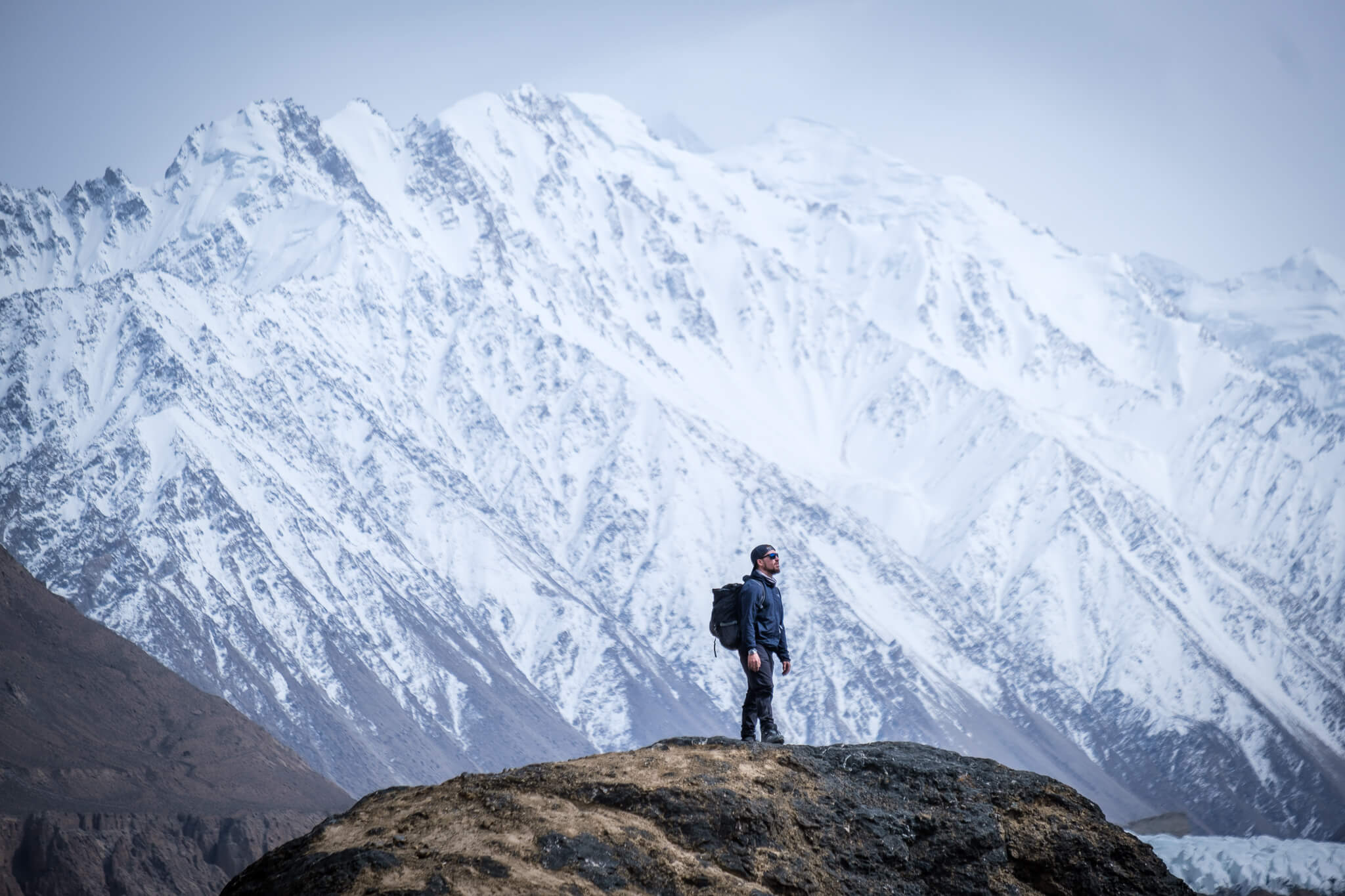
The Broke Backpacker is supported by you . Clicking through our links may earn us a small affiliate commission, and that's what allows us to keep producing free content 🙂 Learn more .
The 7 Reasons to Go Budget Travelling NOW
Final tips for new budget backpackers….
- Buy Us a Coffee!
I’m a firm believer that everybody should explore this weird, wild, and wonderful planet at least once in their lives. AND I’m a firm believer that that journey should be accessible to everyone , no matter where they come from or what their background is.
Enter budget travel.
If your circle of friends back home doesn’t involve any loveable vagrants or international men of mystery, you might not even have a clue that it’s possible to travel the world with little to no money. You might have been taught that travel is a bougie hobby for people that drink chilled chardonnay while chortling from behind the curtains of first-class at the plebs in economy.
WRONG. Travel is for everyone.
But while learning to travel while spending as little money as possible is a delicious banquet, that’s not today’s main course. Nay – today is about why you should throw caution to the wind and hit the road now.
Starting with my top reason…
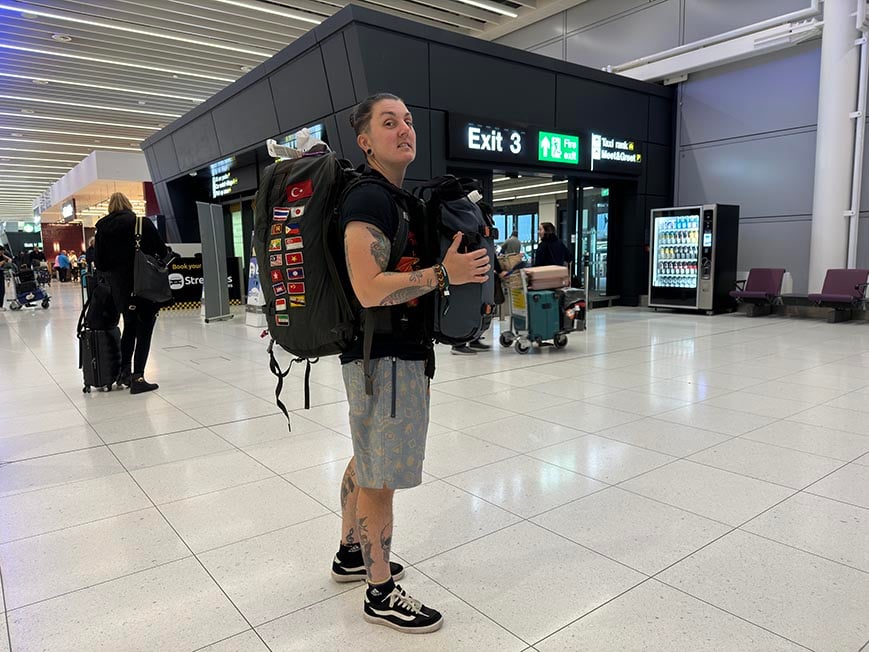
1. Budget Travel Makes You More Resourceful
The trade of budget backpacking is not all butterflies and unicorns shitting out rainbows – in fact, more often than not, it’s challenging as hell! When the going gets tough… well, a lot of less resourceful people will just toss cash at the problem hoping to buy their way back into that scrumptious unicorn poop.
But when your wallet is filled with more mothballs and bartenders’ phone numbers than actual dollar bills, that option goes out the window.
Budget travel is a game for the clever people. It’s figuring out where to sleep that night, how to get your next meal, and how to keep going with seriously limited resources. Your biggest resource is your mind.
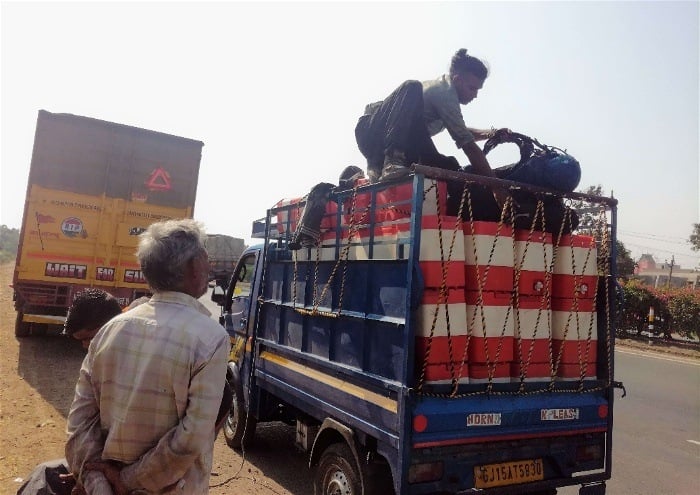
The thing is… stuff goes wrong on the road all the time . But one of the first lessons you learn as a budget traveller is that you WILL survive it. Look at you go, amigo – you’re a champ!
Coddling yourself with luxuries is the biggest mistake you could make in life. Sure, it’s nice feeling safe and secure, but it also gets kind of boring. You never grow as a person when you keep yourself sheltered away from the discomforts of life.
Travel should be all about forcing you out of your comfort zone – that’s when you find that sweet spot for some spicy and excellent self-development.
2. Budget Travel is Travel in Its Rawest Form
Before backpacking became such a rite of passage for half of the Western world (and some of the rest of the world too), the scene was dominated by hippies and vagabonds who had big dreams in place of big money. When you let go of luxury, you get to experience travel like it was before.
Side note: if you want to know how backpacking and “being a backpacker” have changed over the years, check out our backpacker statistics guide !
You get to experience travel as it should be. Raw and uncut.
The experience puts you through a washing machine of emotions: it’s exhilarating, exhausting, crazy, fulfilling, rewarding, at times, dangerous, but most of all… it’s endless fun. The lows are very low but the highs are so fucking high. Isn’t the whole point of leaving your home to experience things that really make you feel alive?
We’re not talking skydiving here – budget travel puts you into REAL adventures way off the beaten-down tourist trail, and that’s where all the best stories come from.
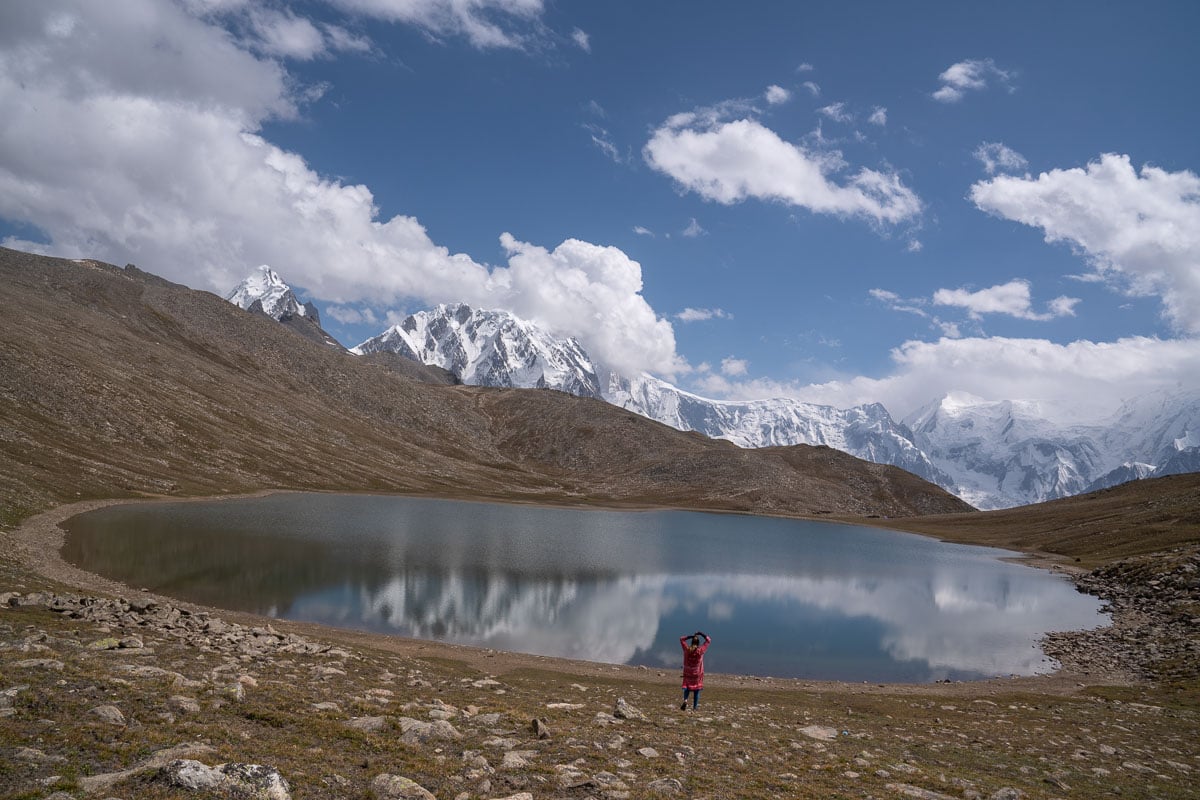
When I’m backpacking, I don’t have any clue what’s going to happen that day. Hitchhiker’s luck might land me hundreds of miles past my wildest goals or five minutes from where I started. I never know who I’m going to meet that day. In a world of wannabe Instagram influencers and people tethered to their smartphone screens , raw and slow budget travel remains the most authentic way to travel.
I live for the uncertainty. Things often go wrong in the best ways possible, and when you’re able to walk through the new doors that misfortune opens wide, you find yourself in the middle of adventures that are definitely not listed in your Lonely Planet guide.
3. Budget Travel is Social
I get it: the idea of going solo can be terrifying. Landing in a foreign country alone, braving new lands lone wolf style, or even just those cold and wet nights shivering, tent pitched somewhere in a moonless forest. But that’s not all solo travel is, and that’s where budget travel is your knight in shining armour.
Ladies and gents, I welcome thee to the hostel life . A strict travel budget often means staying in cheap hostels and sharing dorms with a bunch of strangers. (Or as I like to call them, your-soon-to-be amigos). And hostels are downright bloody fantastic!
A point of connection for all travellers, hostels do a fantastic job with helping you make friends on the road. From pub crawls to organised tours, quiet movie nights to debauched party nights, and even just jamming and smoking up together in the common room, there’s always something going on at a hostel!
The very function of the hostel is to bring people together. Hostels collect like-minded adventurous soloists from all over the world, and soon you’ll feel silly for ever thinking you’d be lonely on your backpacking trip.
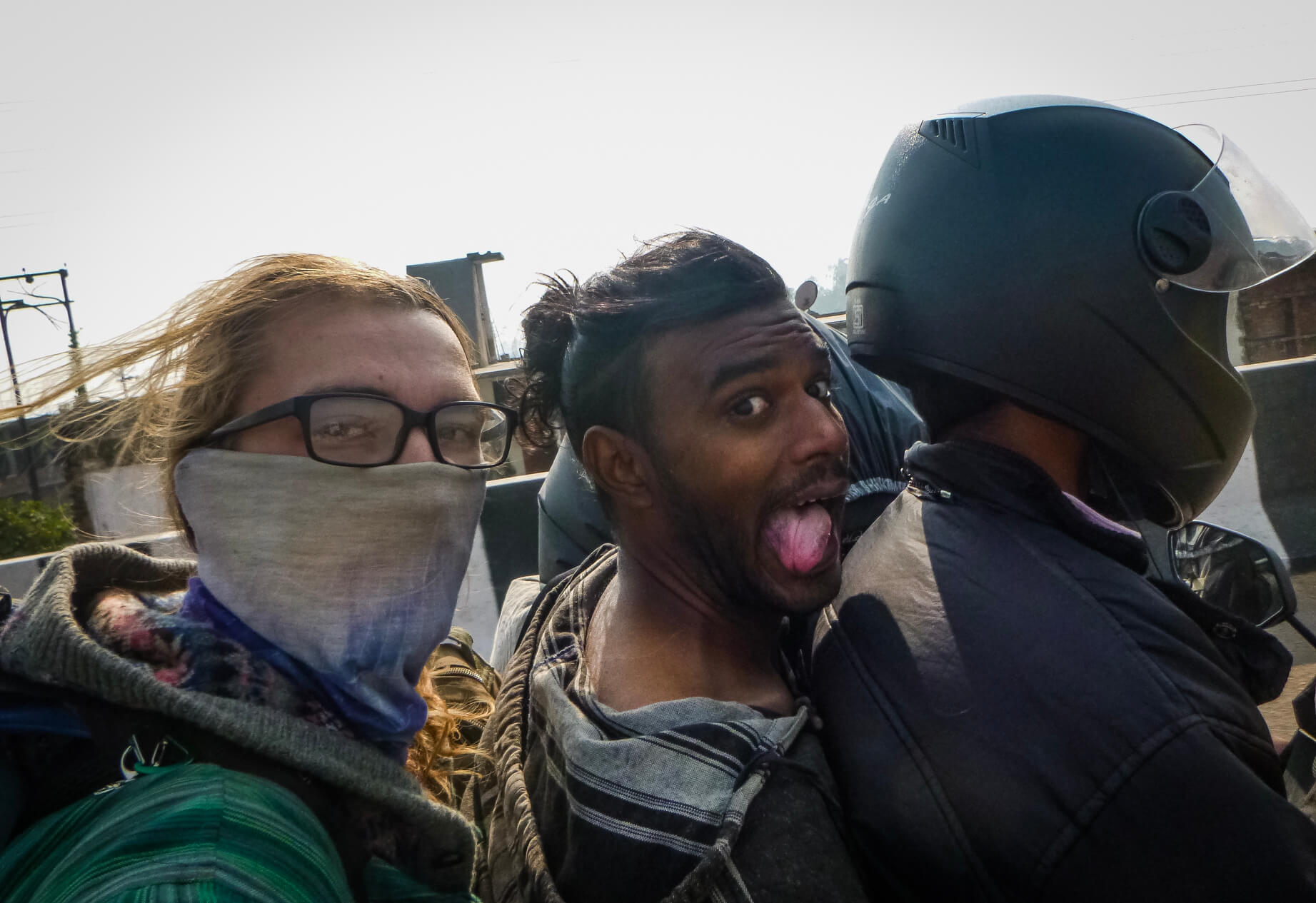
Travelling by Couchsurfing is another excellent option for both accommodation and meeting people, albeit usually local people. AND it’s totally free (though a gracious guest always brings the drinks). In the past, my hosts have always been able to show me the best spots around town, give me tips on the local area, just provide some wicked (and often rather deep) conversations. Budget travel is the reason I have a lot of the life-long friends I do now.
Let alone the fact that to get by as a budgeteer, you HAVE to talk to people. I started out as a painfully shy kid scared of even striking up a conversation with a stranger until budget travel forced me to learn how to talk to people. Now, you couldn’t pay me to shut up!
No matter what, I guarantee you that you’ll make friends when you travel . When you’re working on a minimal budget, you need to dare to ask for help – whether that’s finding an odd job for an extra bit of dough or just hitching a ride to the next town over. At first, asking for help feels awkward as hell, but you’re gonna be surprised at just how many kind souls out are there ready to help a traveller in need.
And talking about restoring faith in humanity…
4. Budget Travel Connects You With People – Real People
There are good people everywhere: that’s something budget travel taught me very early on in my backpacking career. It’s also the reason that questions like ‘ Is budget travel really ethical ?’ grate on my nerves so much. Because questions like that don’t seek to break down systemic barriers between people: they seek to create them.
Everywhere I’ve travelled over my years, I’ve been shown kindness from people from all walks of life. Liberals and conservatives, the wealthy and the poor, Western, Eastern, Southern, and Northern – it doesn’t matter. Because time and time again, I’ve been shown that most people are good.
The best part about travelling is getting to know the local life and culture – and there is literally no better way to do that than to rub shoulders with the people that live in a destination and call it home. The locals.
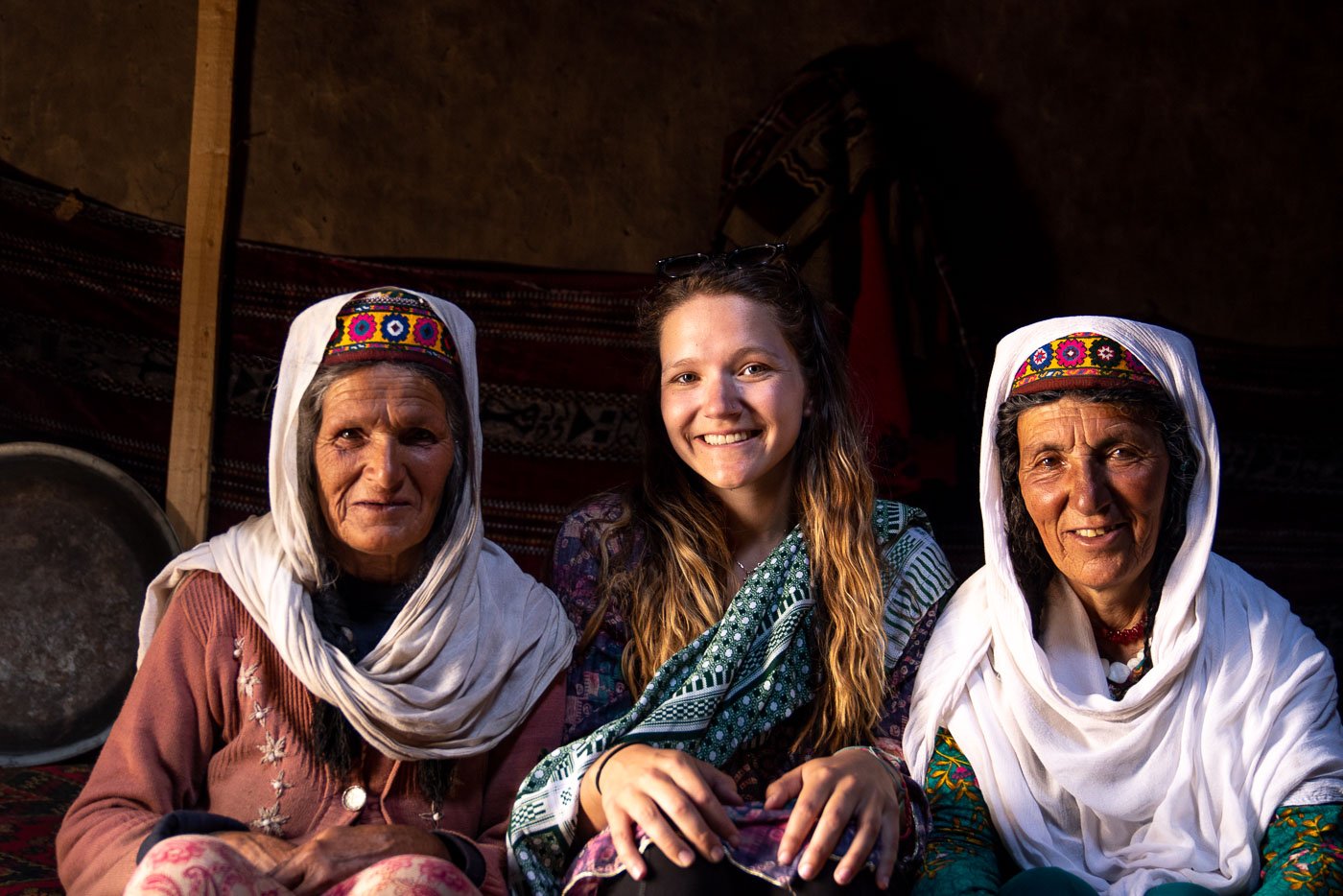
Unfortunately, luxury travel separates travellers from the local side of things. In Western countries, locals deride the rowdy, nosy throngs of tourists ruining the idyllic hideouts of their city (looking at you, Amsterdammers); in developing countries, you’re already richer than the majority of the population simply by being able to be there. And if you only go for the high-end opulent experiences, that divide deepens into a chasm.
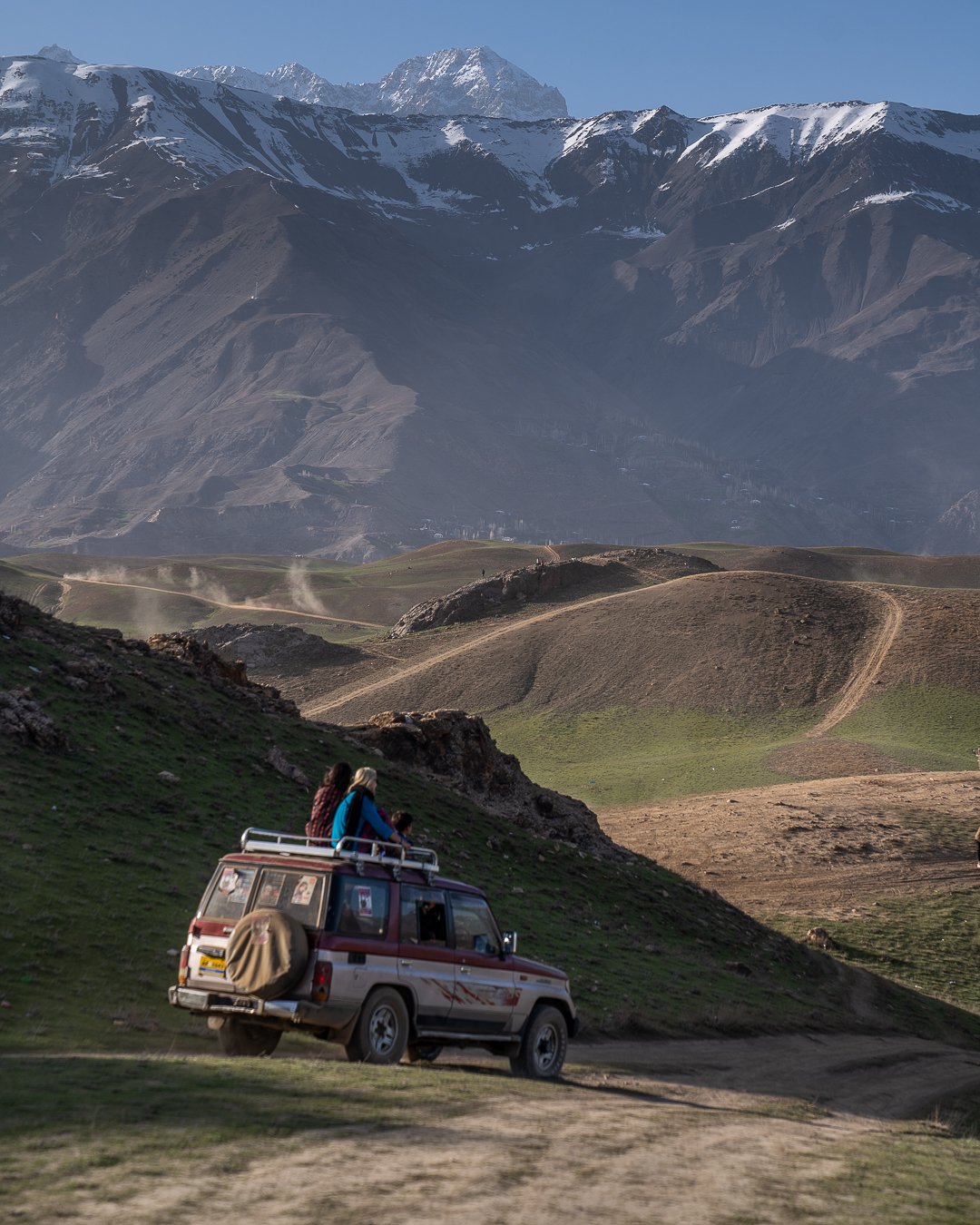
Budget backpackers, while no doubt still tourists, don’t often feel like tourists. Even the word ‘traveller’ vs. ‘tourist’ carries completely different connotations.
Fancy farers usually only meet locals in service positions: waiters, tour guides, hotel receptionists, and that’s one of the biggest travel mistakes you can make. There’s no way to have a real connection with somebody if you put yourself above them.
Broke backpackers dine in dingy street kitchens and packed food markets. Places where menus are in the local language and the best bet to get a delish feed is to just truck your luck and point at something that looks good. (There’s that adventure again!)
Budget backpackers catch public buses, get hella lost, seek help, and sometimes get caught out having to ask locals where the bloody hell they can even get a room in town. And people want to help – somebody always cares.
By adjusting your budget to local levels, you’re accessing, at least in part, the life locals live. And once you start living that budget travel life and stop questioning it, you’ll find that by far and large people everywhere don’t give a shit. They just want to connect.
And that’s a good feeling; it’s warm and tender. It’s like a hug from the universe every time.
5. Budget Travel Gives You More Unique Experiences
If you want to travel properly off the beaten path – and really into the sticks – often the only way is through roughing it. There are no five-star hotels or flushing toilets in the most remote corners of the world. What you’ll find instead are grand tales of adventure, moments of sincere human kindness, and the truly unique experiences of our planet.

Many countries don’t yet have a solid tourist infrastructure, so travel in places like Iran or Pakistan (both a couple of my faves!) is often only possible on a budget. In fact, when I first went backpacking in Pakistan , online information about travel there simply wasn’t even a thing. I really couldn’t find any info about backpacking in Pakistan AT ALL – and that did, I admit, make it somewhat scary to approach. But luckily, it wasn’t scary at all; travelling in Pakistan has been one of the absolute highlights of my life so far, and I try to go back every year.
When you dare to chase after the areas outside of the glitzy over-developed tourist mumbo jumbo, you’ll be rewarded with stories of unparalleled glory. The best tacos in Mexico are not served by the poolside at the Marriott but at a hole-in-the-wall down the street. And with an open mind and a couple of shared shots and cheeky smokes among the locals there, you might just get whisked away to a secret midnight tequila fiesta.
6. Budget Travel is Accessible
Instagram influencers on their caviar and champagne-lined superyachts lied to you: travel is not just a lifestyle of the rich and famous. Almost anyone has the funds to travel as long as you’re a savvy sailor and willing to trade creature comforts for genuine experiences.
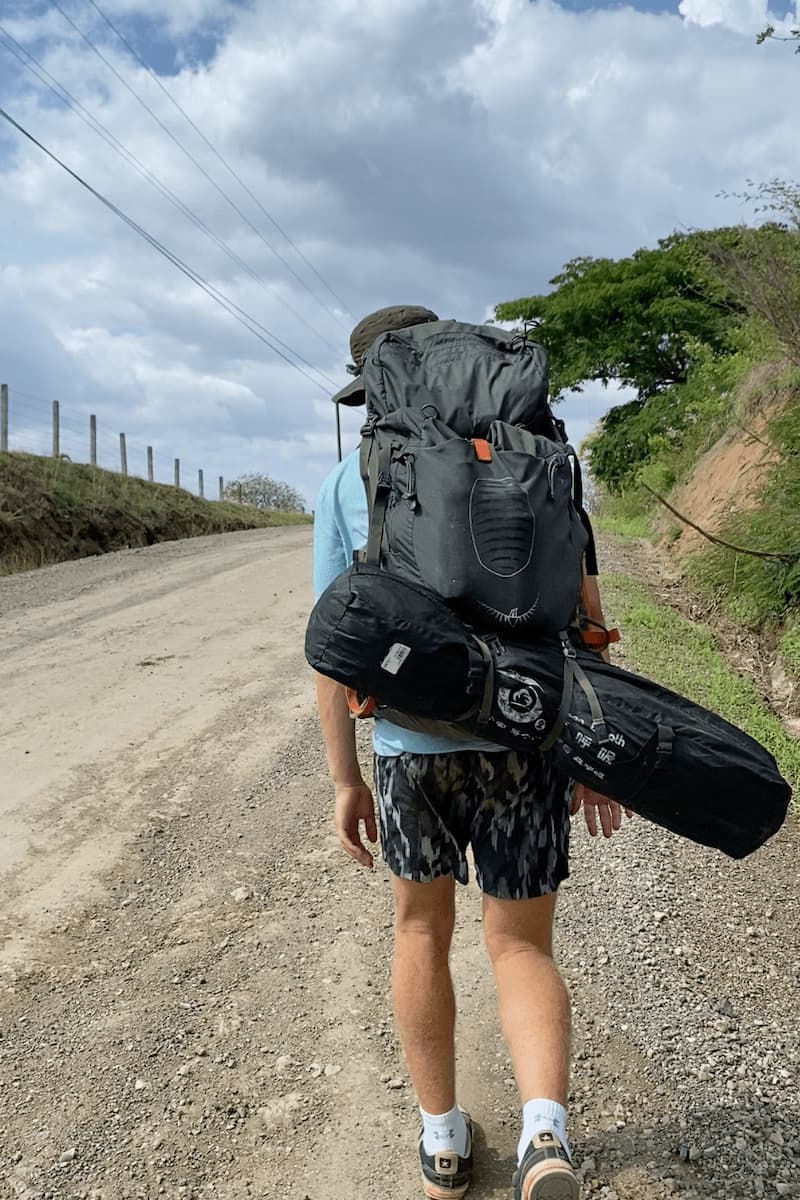
The most common excuse I hear from folks who want to travel but don’t is that they don’t have enough money. However, a lack of funds is rarely as big of a problem as you think. Travelling without much money is entirely accessible to nearly everyone. It can even be as easy as getting yourself a bikepacking bike and just bloody setting off and seeing where the road takes you!
In many cases, travelling is actually cheaper than staying stuck in the hamster wheel of your life. I can guarantee that the monthly rent of your LA shoebox apartment costs three times more than a month backpacking around Southeast Asia – and that’s including scrumptious feasts, bi-weekly foot massages, and the absolute blackout blast of a hedonistic nightlife.
Stretching your cents to their max allows you to travel longer, better, and more often. There’s no reason to break your back working all year for one all-out inclusive getaway on a private island off the Amalfi coast when you could have the most epic adventure of your life travelling in India, Nepal, or other places equally as cheap for the same cost of entry – and instead of five days, you’ll be gone for five weeks… Or five months. 😉
And there’s no better time than right now. With the explosion of low-fare airlines, killer online resources to help with budget trip planning (like, say, this one), and hostels popping up all over the globe, travelling without spending much money is easier than ever before.
7. Budget Travel is More Responsible Than Luxury Travel
Mother Nature is a friend to everyone who’s travelling on a $10/day budget. Broke travellers are often more sustainable than fancy tourists by nature: both from the perspective of the local economy and in regards to environmental sustainability.
As a budget traveller, you end up picking buses and trains over private cabs and planes. You barely have any extra cash so say bye to spending money on tacky souvenirs made in sweatshops (and give a bright and happy middle finger to consumerism in the process).
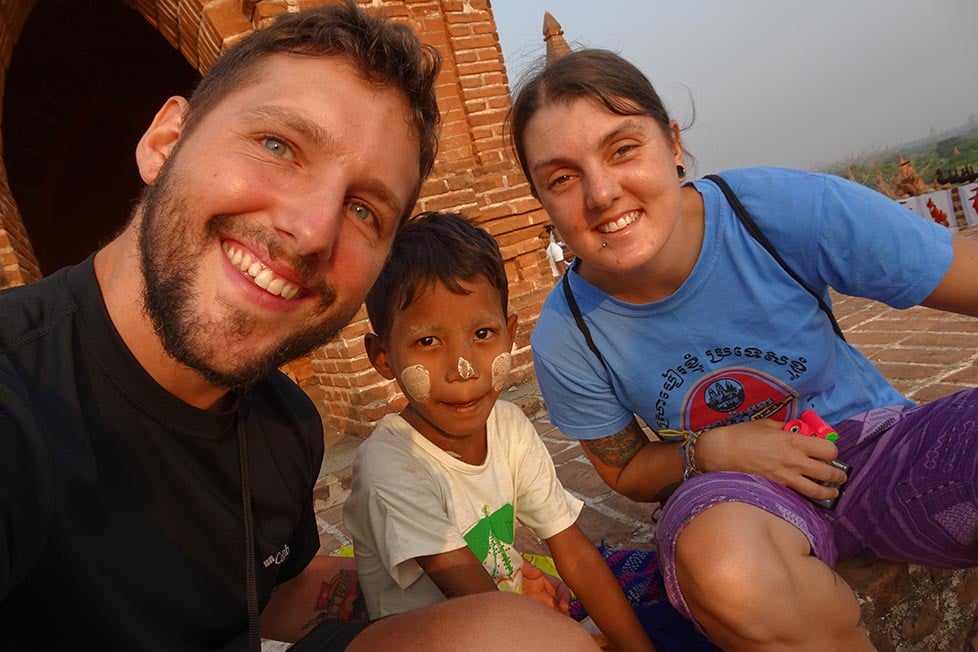
You carry your own water bottle instead of buying plastic ones at every corner, cook your own food with cheap local ingredients, and stay in local family-run guesthouses or hostels where the biggest electrical consumption comes from the disco ball at the bar. (You’d be shocked to learn how much water and power it takes to run a luxury resort.)
Being broke puts you closer to the local folks, and there are tons of reasons just why that’s so excellent. You often hear about how you should be leaving money in the spots you visit (the famed “tourists dollars” ), and by eating, staying, and shopping at locally owned places, that money goes directly into the pockets of locals in full rather than trickling down from some foreign investor.
In a word, budget backpackers are conscious and responsible tourists by design.

Drink water from ANYWHERE. The Grayl Geopress is the worlds leading filtered water bottle protecting you from all manner of waterborne nasties.
Single-use plastic bottles are a MASSIVE threat to marine life. Be a part of the solution and travel with a filter water bottle. Save money and the environment!
We’ve tested the Geopress rigorously from the icy heights of Pakistan to the tropical jungles of Bali, and can confirm: it’s the best water bottle you’ll ever buy!
Backpacking on a budget is EPIC. There’s no reason that you shouldn’t at least give it a go and see how you like it (unless you prefer nights on the couch watching Ross and Rachel umm and uhh for the 16th-billion-time over raw and thrilling journeys into distant lands).
It’s easy to get caught up in all the unreal awesomeness though, so here are a few golden rules to keep in mind when you embark on your adventure:
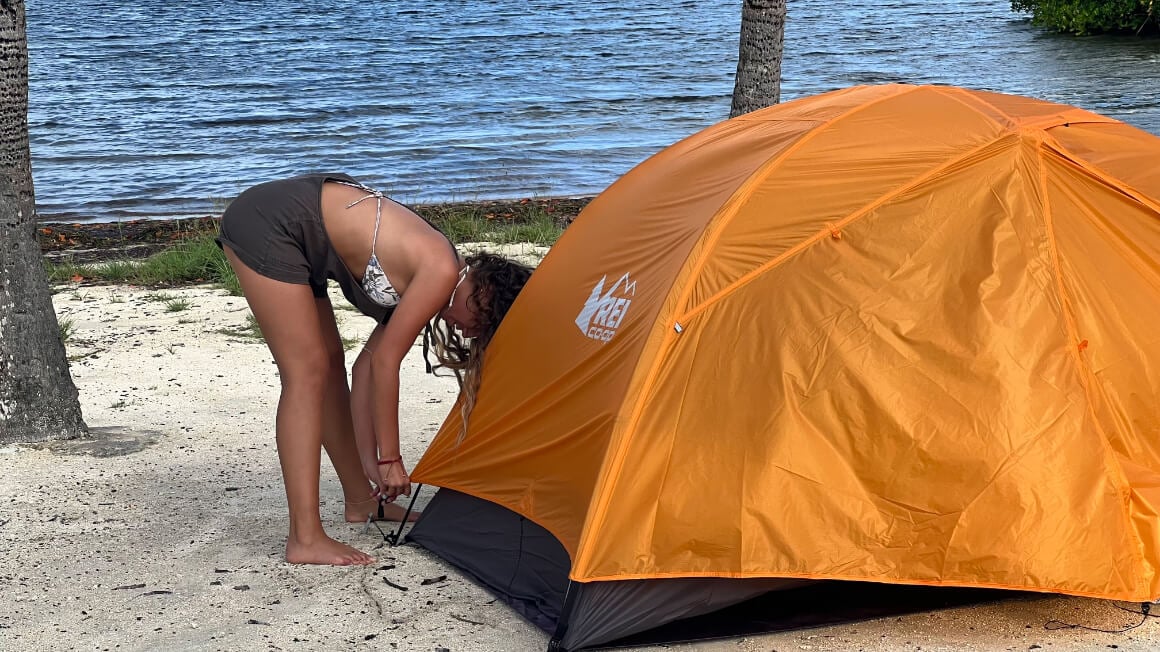
- Experience, don’t exploit. Budget backpacking means compromising on your own comfort – e.g. sleeping rough instead of staying at a fancy hotel – but saving money should NEVER come at the expense of other people. While the art of haggling is a cross-cultural tradition, bartering for fifty cents over some trinket is poor form when the vendor definitely needs that money more than you do. Even if you’re staying somewhere for free through Couchsurfing, it’s always nice to invite your host out for a drink or cook them dinner as a thank you.
- Ask nicely, but don’t mooch. Similar to the last point, you’ll find yourself having to ask for favours, whether it’s hitchhiking a ride or asking for the throwaway produce from a fruit market. Take all kindness with gratitude and appreciation but don’t expect anything – budget travel is your own choice and, ultimately, no one owes you shit.
- Learn the language. Learning a few words of the local language is always appreciated, but when you’re roughing it, it can be absolutely vital. Asking for help becomes ten times easier when you can actually understand each other. And gratitude for the help received from a local is always better shown by saying ‘thank you’ in their native language.
- Check your privilege . Just the fact that you are travelling in another country makes you incredibly fortunate. While budget backpacking is more accessible than luxury travel, even that form of travel is still out of reach for many. Particularly when you’re exploring developing countries, be respectful, be mindful of your impact as a tourist, and leave behind at least a little money where appropriate… and a big fat smile. 🙂
- Budget travel is tough – and you’re not a wuss for feeling like that. Most of the time, travelling on a budget is not a holiday. The uncertainty can really stress you out, and the constant flux of moving around, meeting new people, and sussing out where to sleep that night can become exhausting. I promise you, it’s all worth it, however, travel burnout is real – there’s no shame in calling for a timeout in the middle of your trip and just treating yourself to a peaceful hotel room for a few nights to recharge.
Trust me when I say that budget travel has been the best and most rewarding thing I’ve ever done in my life, and it’s solely responsible for where I am now.
I’m extremely grateful for the person I’ve become over the years of counting pennies and chasing low-cost adventures and off-the-charts experiences. I had some hard times on the road but ultimately budget travel has made me more resourceful, smarter, more positive, open, worldly, tougher, and it kicked the shyness out of me pretty fucking swiftly too. And that’s exactly what it will do for you – I promise.
So stop worrying about your bank balance and get the hell out there – there are mountains to climb, babes to romance, and adventures aplenty. And they’re all gonna seduce the pants off of you. Have a grand ol’ time.
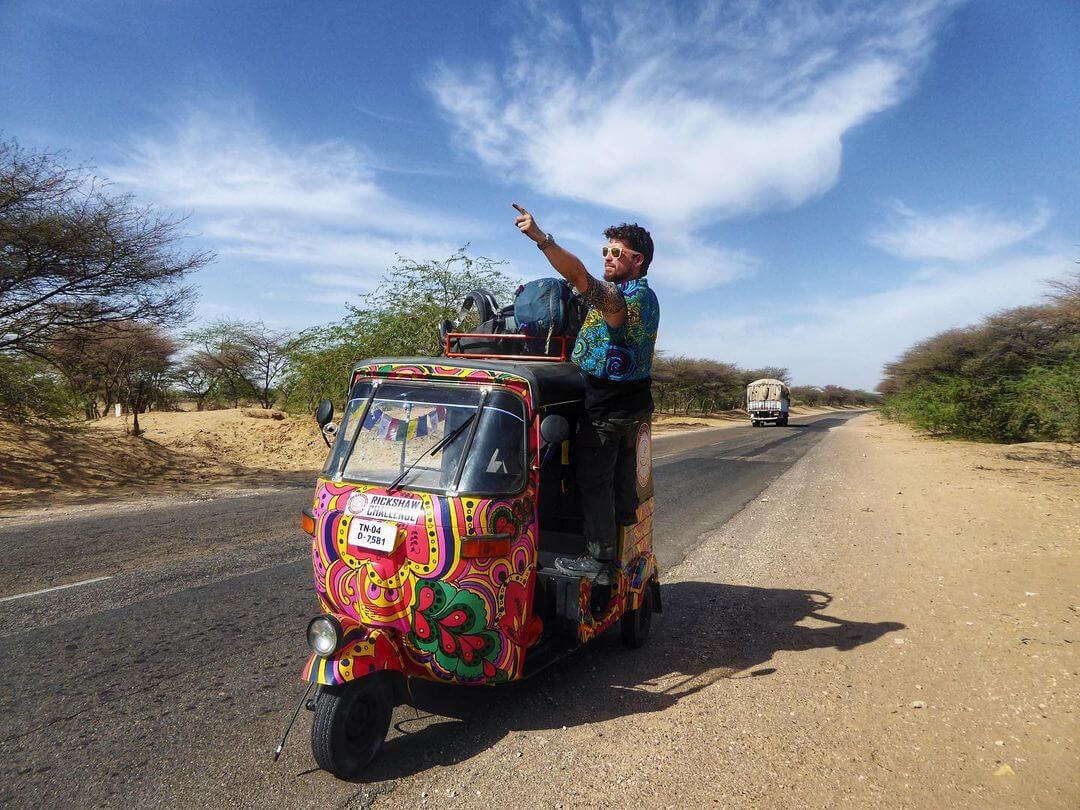
Buy Us a Coffee !
A couple of you lovely readers suggested we set up a tip jar for direct support as an alternative to booking through our links. So we created one!
You can now buy The Broke Backpacker a coffee . If you like and use our content to plan your trips, it’s a much appreciated way to show appreciation 🙂

Will Hatton
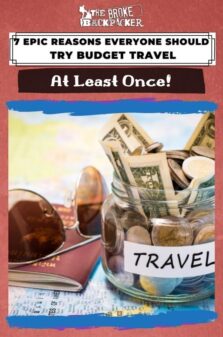
Share or save this post

Leave a Reply Cancel reply
Your email address will not be published. Required fields are marked *
Save my name, email, and website in this browser for the next time I comment.
Notify me of followup comments via e-mail.
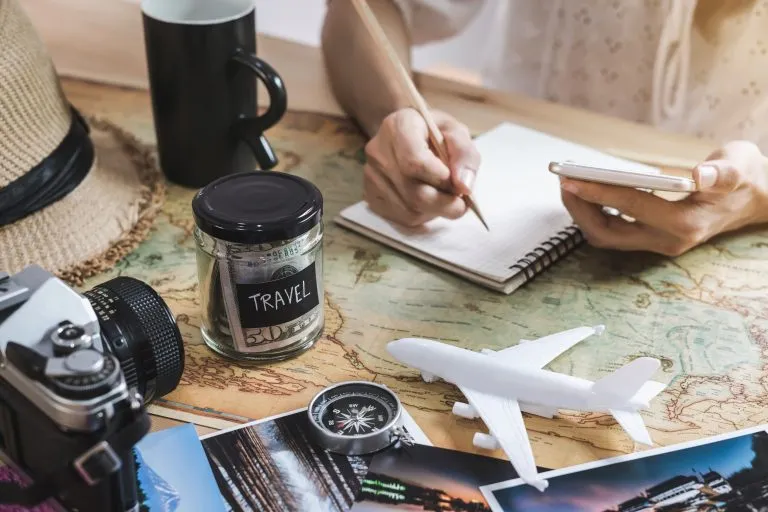
How to Budget for a Trip: The Easiest Travel Budgeting Method (+ Tips!)
Here’s a silly secret: I love budgeting travel… and I also think that most guides to creating a travel budget make it entirely too complicated.
I initially wrote this guide on how to budget for a trip almost 7 years ago, when we were prepping for what we were then calling a 6 month round the world trip (spoiler: depending on your definition of “trip”, it never actually ended).
50+ countries and the better part of a decade later, I’m still using the exact same, simple formula for calculating our budget while traveling–even if our definition of “on a budget” has changed over the years.
Planning to hit the road soon and wondering how much money you need for your trip?
Whether you’re headed off on a 2-week Europe trip or you’re planning to live out of a backpack for years like we did, our simple method for budgeting travel expenses has you covered.
Here’s the travel budget strategy that we swear by to this day!
Table of Contents
Our Formula for Creating a Travel Budget
Why we like this travel budgeting system, example of how to budget for a trip, tips for travel budgeting, planning a trip.
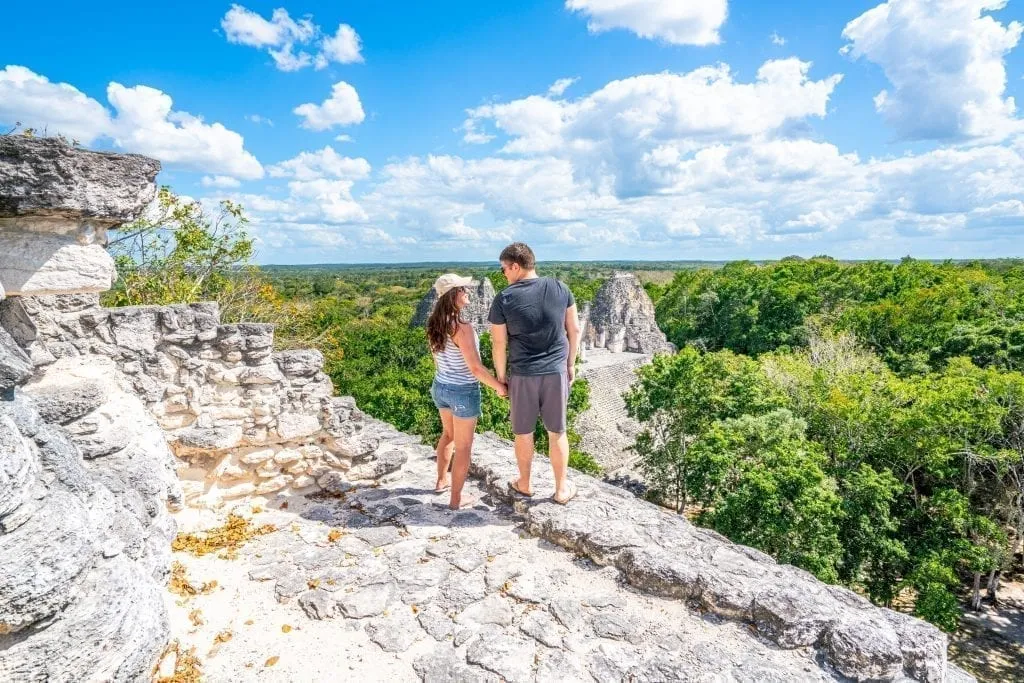
Some links in this post may be affiliate links. If you make a purchase through one of these links, we may earn a small commission at no extra cost to you. Please see our disclosure policy for more detail.
Here’s our incredible simple calculation for travel expenses:
(Money Saved – Major Expenses) / Number of Days Traveling = D aily Budget
That’s it–simple, easy to remember, and allows you to easily translate your savings from a pile of money into an actual travel budget.
Some long term travelers prefer to divide by the number of weeks instead of the number of days, on the premise that some days you may blow a large amount, and then have cheaper days to make up for it.
While that is 100% true and Jeremy and I definitely balance expensive days with inexpensive ones, I still prefer to think in terms of days.
In my experience, smaller numbers tend to be more easily tracked, and are less overwhelming as a result.
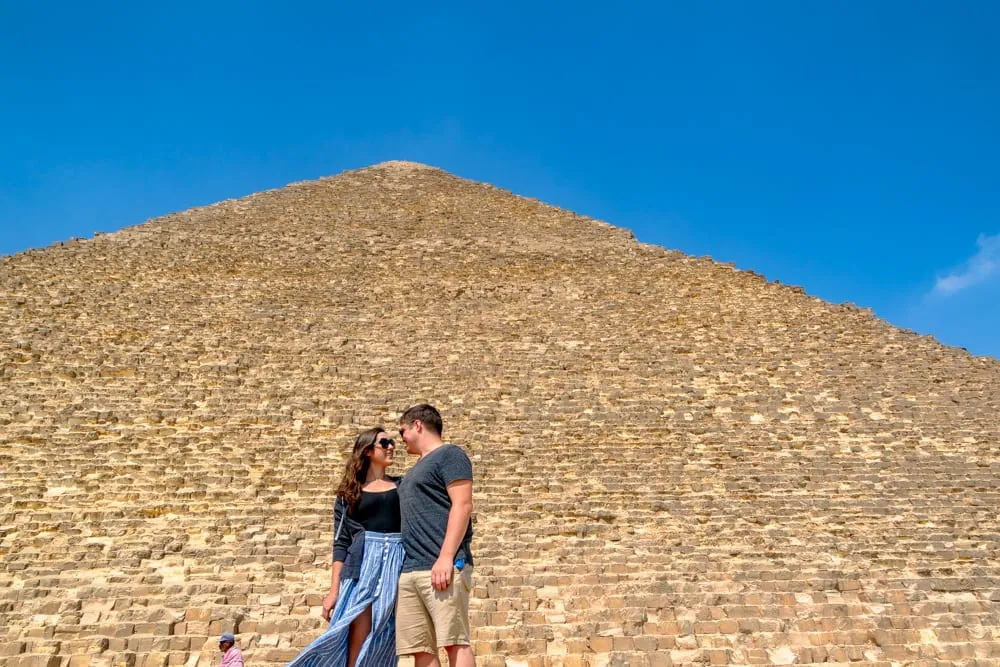
How to Define Major Travel Expenses
“Major expenses” can be somewhat of an ambiguous term, but I tend to use this for pricey plane tickets, travel insurance, and large monthly bills that you’re still responsible for during your trip (say, a car payment or health insurance).
If you’re headed to any destinations that require a visa, be sure to include those costs as well!
For shorter trips, I also like to include lodging and certain cheaper transportation costs (night trains, budget airline flights, rental cars) here, but for long-term travel, that’s obviously not practical.
The point of the major expenses category is simply to remove the money that is allocated for specific expenses from play before determining how much you have to spend.
This is to avoid either a) running around feeling like you have more money than you do and overspending or b) anxiously fretting about the upcoming expense (like a plane ticket home) and saying no to things that you want to do because you’re needlessly stressed about not having enough money.
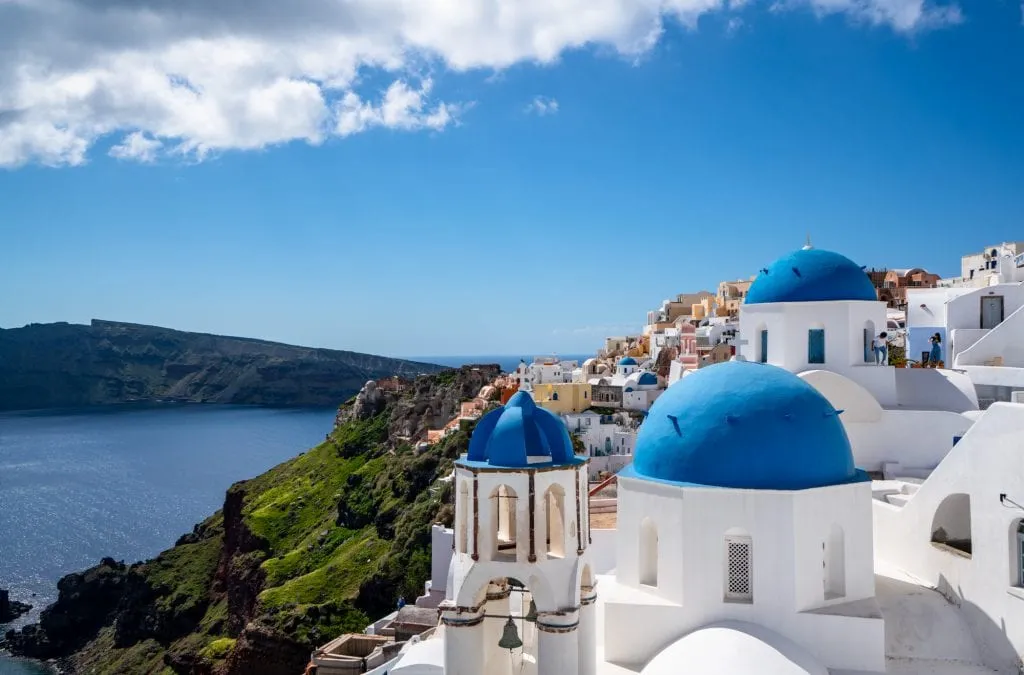
Personally, we’re much more likely to do the second.
Looking back on almost 7 years of travel, I can now definitively say that there have been more experiences than we’ve said no to when we should have jumped at the opportunity than times we splurged on an experience that wasn’t worth deducting from our calculated travel budget.
Luckily, thanks to this travel budgeting system, those experiences have been few and far between.
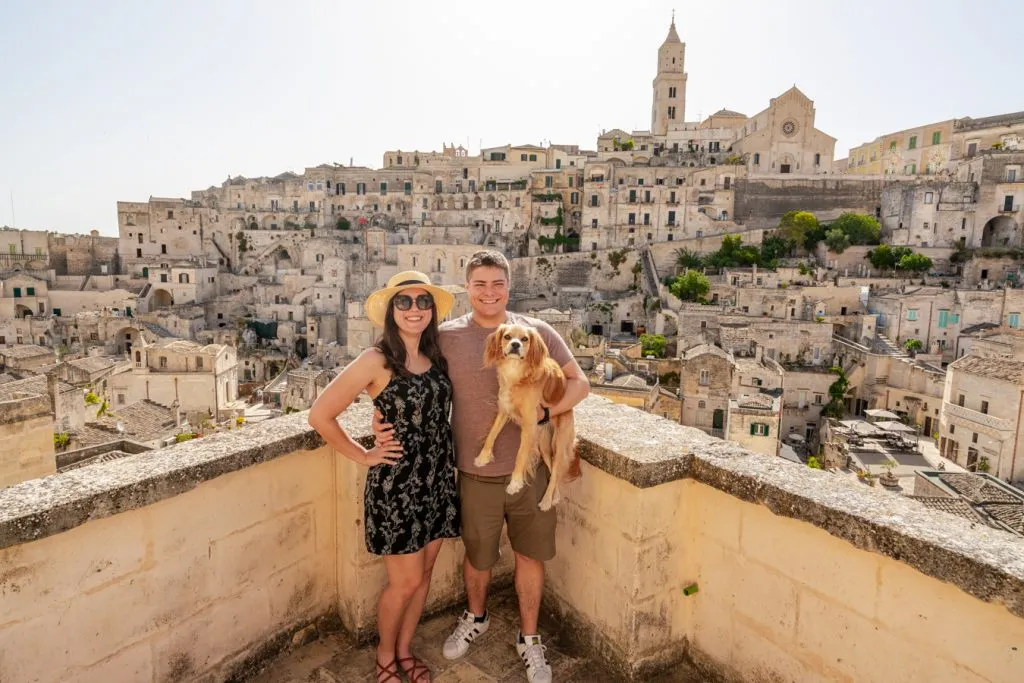
For us, this method of creating a travel budget works perfectly.
Thanks to careful tracking, we have never overspent on a trip, and we’ve also never worried much about money during our travels.
The worst that will happen is that we have a couple of pricey days in a row and follow it up with a day of inexpensive hiking or laying on the beach to make up for it (hardly a tragedy).
While I tend to track our daily expenses via mental estimates, I will write out cash expenses daily and credit card/more easily tracked expenses a couple of times a week–yes, even 7 years later.
It may seem like a drag, but 10 minutes of work can relieve a lot of stress and fear of the unknown that can come with just letting your money slip to the back of your mind.
(At least, it will be in the back of your mind until you start panicking over the thought of where your checking account balance might be when trying to fall asleep at night!).
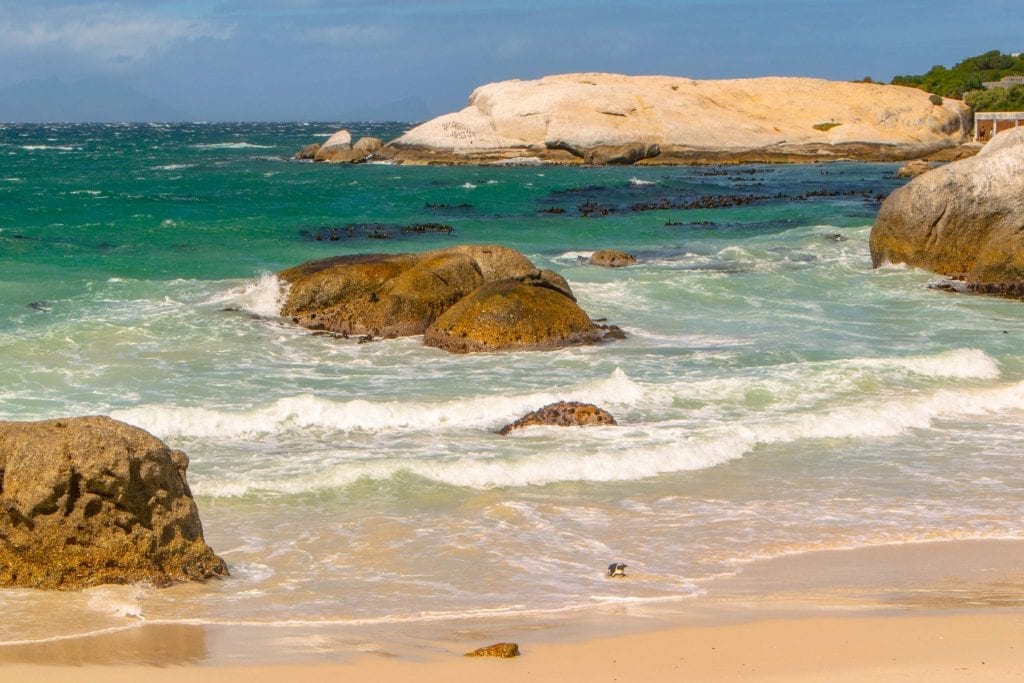
Let’s say that a couple traveling is traveling to Paris from the USA for one week, and wants to calculate their travel budget.
In the interest of not searching too deeply for a pretend trip, I’ll say they buy the first flights they search for don’t stress about that too much. They’re also cautious and want travel insurance for their trip.
Our pretend couple has a $4000 travel budget, in total.
Major Travel Expenses for Our Mock Paris Trip
Round-Trip Flights to Paris: $2000
Travel Insurance : $150
Hotel Room, $130/night for 7 nights: $910
($4000 total budget – $3060 major expenses) / 7 days = $134.28/day to spend, or $67.14/per person, per day.
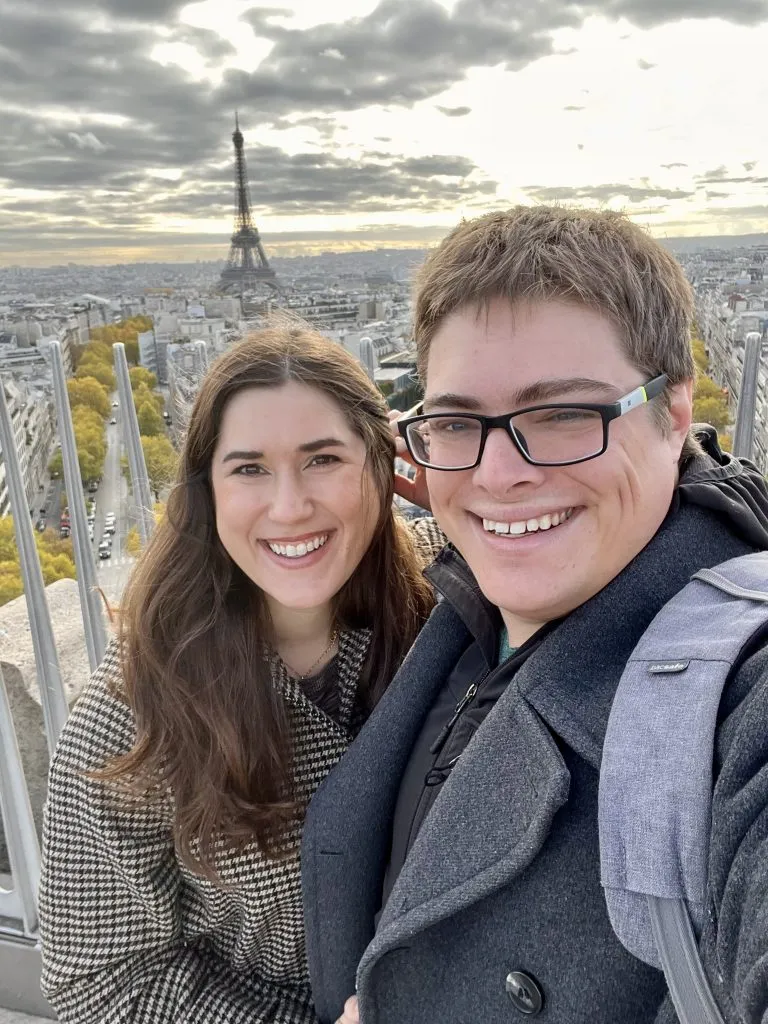
I would round those down to $134 or $67, both for the ease of math and to build in a slightly conservative slant to the budget.
This would need to cover activities/tours, souvenirs/shopping, transportation while in Paris, and food/drinks.
That’s not only doable but completely comfortable in Paris, as long as our pretend couple is not hoping for luxury travel.

Know what’s worth it to you.
If you’re a major foodie, skimping on dining probably isn’t going to work for you–and if you’re a SCUBA lover, suggesting you limit dives on a beach trip may sound miserable.
Whatever your priorities are, focus on those and skimp on other areas, instead–even if other travelers consider the things you skip to be must-see sights.
Check in on your budget regularly.
Even if you don’t check in daily, be sure to track your budget at least every few days.
This will help keep you from blowing off course in either direction and also relieve any anxiety you have about not knowing the status of your budget.
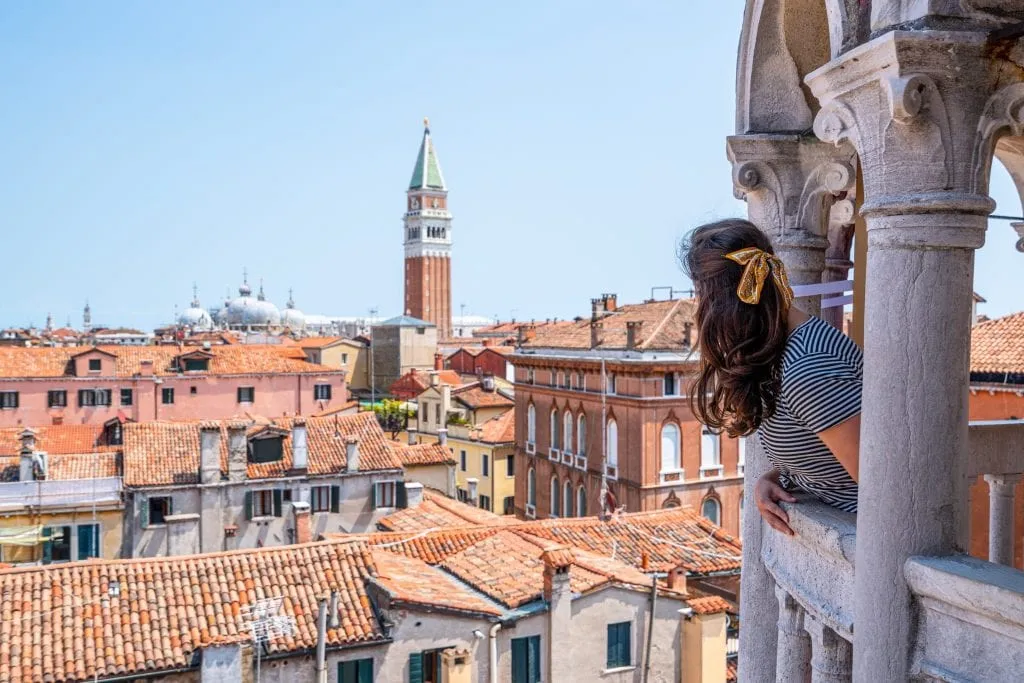
Remember that traveling on a budget doesn’t mean having less fun!
Some of our favorite travel experiences cost little to nothing.
Browsing local markets, enjoying a beach day, going for a hike, wandering aimlessly through cities, sampling street food, and more all make for wonderful and incredibly memorable travel days.
Travel budgeting can be daunting when you get started, but once you get used to it, it enhances, rather than detracts from your experiences.
Not only are there wonderful travel experiences to be had at all budgets, but knowing where you are in your trip financially is much less stressful than constantly worrying that you’re over your travel budget… without having the concrete data to confirm either way.
Subscribe to our newsletter to follow along with our travels and to receive tips and new content via email!
We won’t send you spam. Unsubscribe at any time.
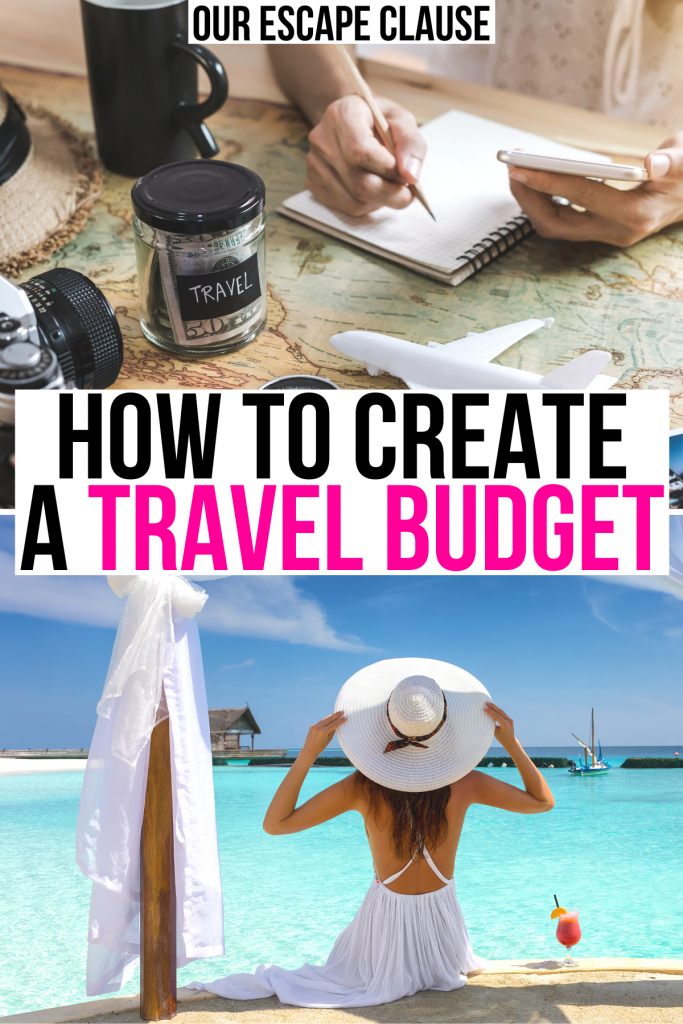
About Kate Storm

In May 2016, I left my suburban life in the USA and became a full-time traveler. Since then, I have visited 50+ countries on 5 continents and lived in Portugal, developing a special love of traveling in Europe (especially Italy) along the way. Today, along with my husband Jeremy and dog Ranger, I’m working toward my eventual goal of splitting my life between Europe and the USA.
11 thoughts on “How to Budget for a Trip: The Easiest Travel Budgeting Method (+ Tips!)”
Excellent post. I was checking continuously this blog and I am impressed!
Extremely useful information specifically the last part :) I care for such info a lot. I was looking for this particular information for a long time. Thank you and good luck.
Thank you! Appreciate you stopping by! :-)
bookmarked!!, I love your site!
Another small thing to consider would be to convert your daily budget amount to local currency.
Great point, thanks for stopping by! :-)
This is by far the best travel blog I have come across. Thank you!!!
So happy to hear that, DeElla!
Great info!
Good info. Thanks we will be traveling Italy for 28 days. The last 7 we are staying with friends. We don’t want to rent a car but use trains between towns and subway/buses in the cities. How do I budget for that? Are there month long passes for each? Excluding airfare we have $7000 food/transportation/entrance fees. Does that sound doable? We are flying into Rome, then Florence and take day trips from there, then ending up in Ugento. Any recommendations?
Thanks, Brenda!
You can definitely get around Italy without a car, that’s not a problem at all. $7000 for for 28 days on the ground also sounds reasonable (I’m assuming you’re traveling as a couple).
Trenitalia does have a monthly pass of sorts for trains, similar to the Eurail pass but for Italy only. However, I wouldn’t necessarily recommend it without knowing your schedule. Most likely, booking each leg individually is fine.
For short distances in rural areas that you travel by bus, you won’t need online tickets or anything like that. Same for any “local” trains you take, like the slow train between Florence and Bologna. You can buy those tickets step by step as you go, as the prices are set.
Where the prices get higher and you’ll need to budget in advance is for the high-speed train routes around Italy, like from Florence to Lecce, for example. Those trains have dynamic pricing, so if you can book your tickets in advance, you’ll both spend less and be able to budget more easily.
Leave a Comment Cancel reply

How to Travel on a Budget: 50 Practical Tips!
Let’s face it, even seasoned travelers like myself want to know how to travel on a budget. Why spend money when you don’t have to? The more you save, the more you have for even more adventures!
Lots of mores!
As I write this post, I am getting excited! Only 3 months to go until we set off traversing the globe again, so I’ve been researching and drawing on my own travel experiences.
Whether you’re a lifestyle entrepreneur , a digital nomad, a professional traveler, or just like planning vacations, here are 50 practical tips for traveling on a budget:
Table of Contents
1. Set a Daily Budget
Determine a reasonable amount to spend each day and try to stick to it.
This will help you prioritize your spending. Include all your expenses, such as accommodation, meals, transportation, and activities. This will make you more conscious of your expenses and less likely to splurge on unnecessary items.
2. Travel Off-Peak
Travel during shoulder seasons —the period between peak and off-peak seasons.
You will find that flights and accommodations are much cheaper, and destinations are less crowded. This not only saves you money but also enhances your travel experience.
3. Use Flight Comparison Websites
Utilize websites like Skyscanner , Kayak, or Google Flights to compare prices across various airlines.
These websites aggregate prices and show you the cheapest options. Sometimes they even have exclusive deals that you might not find on the airline’s website.
4. Use Travel Reward Cards
Credit cards that offer travel rewards can be incredibly valuable.
By spending on everyday items, you can accumulate points that can be redeemed for flights, hotels, and other travel-related expenses. Make sure to pay off the balance every month to avoid interest charges.

5. Pack Light
Save on checked luggage fees by packing only the essentials in a carry-on.
Besides saving money, packing light also saves time, as you don’t have to wait for your luggage at the carousel, and it makes moving around much easier.
6. Travel Overnight
Opt for night buses or trains when moving from one city to another.
Not only is it often cheaper than daytime travel, but you also save on one night’s accommodation. Make sure to bring earplugs and an eye mask for a more comfortable sleep.
7. Use Public Transport
Public transportation is usually much cheaper than taxis or rideshares.
Plus, it’s a great way to experience how locals live. Before you travel, check the public transportation options of your destination and familiarize yourself with routes and tickets.
8. Book in Advance
Many transportation companies offer lower rates if you book weeks or even months in advance.
This also applies to some attractions and accommodations. Just make sure to read the cancellation policy in case your plans change.
9. Cook Your Own Meals
By staying in hostels or Airbnbs with kitchens, you can save a lot by cooking your own meals.
Visit local markets for fresh ingredients, and try making some local dishes. This is not only cost-effective but also a fun cultural experience.
10. Travel with Friends
When you travel with friends or family members, you can share expenses such as accommodation, transportation, and even meals. This can significantly reduce the financial burden on each person.
11. Free Walking Tours
Many cities offer free walking tours. These are not only an inexpensive way to see the city but also a great opportunity to learn about the local history and culture. Don’t forget to tip your guide if you enjoyed the tour.
12. Use Travel Apps
There are many travel apps designed to help travelers save money.
These range from maps and transportation apps to those that find the best local deals. Some popular ones include Maps.me, XE Currency, and TripAdvisor.
13. Use Hostels
Hostels are usually much cheaper than hotels. They’re also great places to meet other travelers. Look for hostels with good reviews and the amenities you need, like free Wi-Fi or a kitchen.
In many countries, particularly in markets, prices are inflated for tourists. Don’t be afraid to bargain.
It’s often expected. Be polite, and if you feel like the price is too high, it’s okay to walk away.
15. Use Airbnb
Airbnb can be a cheaper and more authentic alternative to hotels. Staying in a local’s home or apartment can also provide a different perspective on the place you’re visiting.
16. Book Flights on Tuesdays
Many airlines release their sales early in the week, making Tuesday often the best day to find deals. It’s also said that booking around six weeks in advance can get you the best rates.
17. Use Couchsurfing
Couchsurfing allows you to stay with locals for free. It’s not just about free accommodation but also about cultural exchange and making new friends. Be respectful and considerate when staying with a host.
18. Travel Insurance
Though it seems like an extra expense, travel insurance like SafetyWing can save you money in the long run in case something goes wrong, such as a medical emergency or loss of luggage. Make sure to read the policy details.
19. Pack Snacks
Food at airports and tourist spots can be overpriced. Bring your own snacks, like nuts or granola bars for those moments when hunger strikes.
This small habit can save you quite a bit in the long run.
20. City Tourist Cards
Many cities offer tourist cards that provide free or discounted access to major attractions and public transport. If you plan to visit many attractions, this can save you a substantial amount.
21. Use a VPN
Sometimes prices for flights and accommodations can be cheaper when booking from a different country. A VPN changes your virtual location , allowing you to check prices from different countries.
22. Eat Street Food
Street food is often cheap and delicious. It’s also a fantastic way to experience local cuisine. Just make sure it looks clean and safe. Opt for busy stalls as high turnover usually means fresher ingredients.
23. Use a Water Bottle
Bring a refillable water bottle. It’s more environmentally friendly and saves you money. In countries where tap water is not safe to drink, look for water refill stations or use a bottle with a filter.
In compact cities, walking is often the most economical and enjoyable way to get around . You can take your time, take photos, and discover hidden gems that you might miss when using public transport.
25. Avoid Tourist Traps
Places near major tourist attractions are usually overpriced and not always the best quality. Walk a few blocks away from the tourist areas to find better and cheaper options.
26. Go to Free Museums
Many cities have museums that are either always free or have specific free-entry days. Plan your visits around these times. These cultural experiences can be just as enriching as the costly ones.
27. Travel Slowly
Constantly moving from one place to another can be expensive. By staying longer in one place, you can take advantage of weekly accommodation rates and have more time to find cheap local spots.
28. Use Currency Exchange Wisely
Currency exchange centers, especially at the airport, usually have bad rates. Withdraw money from ATMs for better rates, but be aware of fees. Also, always choose to be charged in the local currency.
29. Use Student Discounts
If you’re a student, always ask if there’s a student discount. Many places offer reduced prices for students. Just make sure to carry your student ID with you.
30. Work Exchange
Websites like Workaway and WWOOF connect travelers with locals looking for help with various tasks in exchange for food and accommodation. This is not only a way to save money but also a unique cultural experience.
31. Use Local SIM Cards
Roaming fees can be exorbitant. When you arrive, buy a local SIM card. This will allow you to use the internet and make calls at a much lower rate.
32. Choose Cheaper Destinations
Some countries are significantly cheaper to travel in than others. Countries in Southeast Asia, Eastern Europe, or Central America often have lower living costs compared to Western Europe or North America.
33. Pack a First-Aid Kit
Having basic medicines and first-aid supplies can save you from having to find and purchase them at a local pharmacy, which can be particularly expensive in some countries.
34. Share Meals
In many countries, especially in the USA, portion sizes can be very large. Consider sharing a meal with a travel companion. This saves money and prevents food waste.
35. Research
Knowledge is power. The more you know about the place you’re visiting, the better decisions you can make about where to save money. Look for local blogs and forums for insider tips.
36. Avoid Single Supplements
Some hotels charge a single supplement , essentially penalizing solo travelers. Look for accommodations that don’t charge this fee or consider staying in a hostel or Airbnb.
37. House Sitting
Websites like TrustedHousesitters connect travelers with homeowners looking for someone to take care of their home and pets while they are away, often in exchange for free accommodation.
38. Bike Rentals
Many cities offer bike rental programs. Biking is often cheaper than public transport and gives you the flexibility to explore at your own pace.
39. Find Free Entertainment
Look for free entertainment options such as concerts , street festivals , or public events . These can often provide some of the most memorable experiences of your trip.
40. Ask Locals for Tips
Locals often know the best places to eat , visit , and shop . Don’t be shy about asking for advice. They can often direct you to hidden gems that are not on the tourist radar.
41. Use Library for Freebies
Some local libraries offer free or discounted passes to local museums , zoos , and other attractions . Check the library’s website or ask the librarian for information.
42. Use Deal Websites
Websites like Groupon can offer substantial savings on activities, meals, and even accommodations in the country you’re visiting.
43. Alternative Airports
Sometimes flying into or out of a secondary airport can be significantly cheaper than using the main airport. Just make sure to factor in the cost and time of getting to and from the airport.
44. Carry Small Change
Having small denominations of the local currency can be handy for small purchases, and in some places, it is necessary for public toilets or local buses.
45. Flexibility
Being flexible with your travel dates and destinations can save you a lot of money. Sometimes changing your departure date by just one day can make a big difference in flight prices.
46. Avoid Expensive Alcohol
Alcoholic beverages can be pricey. Limit your consumption or buy it at a local store and enjoy it at your accommodation.
47. Use a Money Belt
Protect your money and essential documents by using a money belt or hidden pouch. This is especially important in areas known for pickpocketing.
48. Take Advantage of Duty-Free
If you need to purchase gifts or specific items, sometimes buying them in the duty-free area of the airport can save you money.
49. Volunteering
Some organizations offer food and accommodations in exchange for volunteer work . This can be an incredibly rewarding way to immerse yourself in the local culture while giving back.
50. Set Fare Alerts
Many flight search engines allow you to set alerts for specific routes. They will notify you when prices drop, allowing you to book at the best possible price.
Remember that traveling on a budget is also about making choices.
Sometimes it’s worth spending a little more on an experience that will really enhance your trip, and other times it’s better to save. The key is finding the right balance.
Here are three top considerations for how to travel on a budget safely and healthily;
3 Top Considerations for Traveling on a Budget Safely & Healthily
1. budget travel styles.
Understanding and choosing a travel style that suits your budget is essential. The way you travel can significantly impact your expenses. Here are a few budget travel styles:
- Backpacking: Involves traveling with minimal luggage, often staying in hostels or budget accommodations, and using cost-effective transportation. It is popular among young and solo travelers.
- Slow Travel: Staying longer in one place to immerse yourself in the local culture. This style can save money as you can avail of long-term accommodation discounts and reduce transportation costs.
- Working Holidays: Involves volunteering or taking short-term jobs while traveling. This can offset some of your travel costs and is also a great way to immerse yourself in a new culture.
- Travel Hacking: Utilizing credit card points, frequent flyer programs, and other rewards to reduce the cost of flights and accommodations.
2. Staying Healthy on a Budget
Maintaining your health during your travels is crucial , as getting sick can be both costly and disruptive. Here are some tips:
- Travel Insurance: Invest in a good travel insurance policy that covers medical expenses. This can save you from hefty hospital bills in case of an emergency.
- Vaccinations and Medications: Ensure you are up-to-date with necessary vaccinations and carry essential medications. This prevents avoidable illnesses and the associated costs.
- Eat Wisely: Opt for hygienic eateries and avoid street food if you have a sensitive stomach. Drink bottled or purified water in countries where tap water isn’t safe.
- Stay Active and Rested: Engage in physical activities but also ensure you get enough rest. A balanced routine keeps you healthy and energized.
3. Travel Scams and How to Avoid Them
Falling victim to a scam can be a major setback for budget travelers. Here’s some travel safety tips to stay vigilant:
- Research Common Scams: Before you travel, research common scams in the destination you are visiting. Being aware is the first step to avoid being tricked.
- Keep Valuables Safe: Carry only what you need for the day, and use a money belt or hotel safe for important documents and valuables.
- Be Skeptical of Unsolicited Offers: Be cautious if someone approaches you with an unsolicited offer, especially if it seems too good to be true.
- Stay Calm and Walk Away: If you feel like you’re being scammed, remain calm. Often, scammers rely on pressuring you into making hasty decisions. If something feels off, it’s okay to walk away.
By considering your travel style, staying healthy, and being vigilant against scams, you can make the most of your travels while sticking to your budget.
These considerations are fundamental to having a smooth and enriching travel experience without unexpected expenditures.
How to Travel on a Budget – Summary
Traveling on a budget doesn’t mean skimping on experiences; rather, it’s about making smart choices that maximize the value of each dollar spent.
The key takeaways for a rewarding budget travel experience include:
- choosing a travel style that aligns with your preferences and budget
- prioritizing your health to avoid unexpected medical costs
- staying vigilant to protect yourself from scams
Being informed and planning ahead can significantly enhance the quality of your travels while keeping costs in check.
One crucial aspect of planning is ensuring you have reliable travel insurance.
For budget travelers, a highly recommended option is SafetyWing Insurance .
SafetyWing offers affordable travel medical insurance , which is invaluable for peace of mind and financial protection in case of unforeseen medical emergencies. It’s flexible, designed with the traveler in mind, and easy to purchase even after your journey has begun.
As you embark on your next adventure, don’t forget that smart budgeting is an enabler, not a constraint. Take that leap, explore new cultures, make lifelong memories, and do it all without breaking the bank.
Subscribe to the Working Traveller Newsletter and alongside weekly money making and nomadic lifestyle tips, get instant access to my FREE ebook – 200+ Side Hustle Ideas for 50+ Nomads !

How to Travel on a Budget – FAQs
What is the meaning of budget travel.
Budget travel refers to the practice of traveling while minimizing expenses and seeking ways to make the most of a limited budget. This means being cost-conscious regarding transportation, accommodation, food, and activities.
Budget travelers often look for the best value options rather than the cheapest, aiming to have enriching travel experiences without overspending. This can involve staying in hostels or budget accommodations, using public transportation, eating at local eateries, and looking for free or low-cost attractions.
How do you travel for a year on a low budget?
Traveling for a year on a low budget requires careful planning and flexibility. Here are a few steps to consider:
- Choose Affordable Destinations: Opt for countries with lower living costs, such as those in Southeast Asia or Central America.
- Plan and Save: Prioritize saving money before your trip and set a realistic daily budget for your travels.
- Work or Volunteer: Consider working holidays, remote work, or volunteering in exchange for accommodation.
- Travel Slowly: Slow travel not only lets you immerse yourself in the culture but also saves money on transportation.
- Be Frugal: Cook your own meals, use public transport, and avoid expensive tourist traps.
- Travel Hacking: Learn the art of travel hacking to utilize credit card points and frequent flyer miles for flights and accommodations.
- Have Travel Insurance: Make sure you have travel insurance to avoid unexpected medical costs.
How can I travel the world with little money?
Traveling the world with little money is challenging but possible through creativity and adaptability. Here are some tips:
- Work Abroad: Take up short-term jobs or freelancing work as you travel.
- Couchsurfing and Hostels: Use platforms like Couchsurfing for free accommodation or stay in hostels.
- Hitchhiking and Rideshares: In safe and common areas, hitchhiking or using rideshare apps can save on transportation costs.
- Earn While Traveling: If you have skills like writing, web development, or photography, you can earn money online while traveling.
- Utilize Reward Programs: Use airline and credit card reward programs to your advantage.
- Travel Light: Pack minimally to avoid additional baggage fees.
What is the cheapest way to travel around the world?
The cheapest way to travel around the world involves a combination of strategies:
- Round-The-World (RTW) Tickets: Consider purchasing RTW tickets from airline alliances, which can be cost-effective for extensive travel.
- Low-Cost Carriers: Use low-cost airlines for regional flights and always be on the lookout for promotions and deals.
- Overland Travel: Where feasible, use buses and trains instead of flying.
- Hostels and Alternative Accommodations: Opt for hostels, guesthouses, or services like Couchsurfing .
- Eat Like a Local: Shop at local markets and eat street food.
- Free Attractions: Take advantage of free museums, parks, and walking tours.
- Travel Slowly: Longer stays often mean reduced accommodation and transportation costs.
Remember that while traveling cheaply, it’s essential not to compromise your safety and well-being. Always be informed and make sensible decisions.
Disclaimer: Please note this post may contain affiliate links, from which, at no additional cost to you, I may earn a small commission. Also as an Amazon Associate I earn from qualifying purchases. I only recommend products and services I’ve used or would use myself. If you choose to purchase from any of my links, thanks so much for your support! 😊
75 Best Gifts for Beach Lovers
The art of slow travel: how to become a slomad.

Monday debate: Can you define Budget Travel?
‘happiness is different for everyone’.
Quote, from my Charlie Brown notepad
Given I write about Budget Travel I thought it would be appropriate to write a post to attempt and arrive at some sort of definition of Budget Travel.
Personally I hate definitions. It’s boring to put everything in a box.
However given this Budget Travel is a big part of my life and I get asked a lot about this on my travels and by people within the travel industry….. I will try an attempt to explain my philosophy of Budget Travel.
Given the subjective nature of travel is and how personal the experience I think it is difficult to pin down an exact definition of what budget travel means.
Plus one person’s idea of budget might be another person’s idea of luxury.
Even though as a travel blogger I have my own personal interests in travel, I often try and balance this with what my readers are looking for.
My tagline for BudgetTraveller is ‘Budget Travel doesn’t have to be boring’
For me Budget Travel isn’t about travelling as cheaply as possible. My focus is on about discovering a great travel experience without breaking the bank. I think what all Budget Travellers ( all travellers in fact!) have in common is trying to find a travel experience that is unique and fun. We don’t mind luxury but prefer budget hotels or hostels if there is more fun involved in staying with the latter.
I was having this debate with fellow budget traveller enthusiast Chris Richardson ‘The Aussie Nomad’ in the summer and he told me that as a solo traveller he enjoyed hostels because they were convenient, great place to meet people, well located and also cheap. Which is great and exactly why when backpacking solo, hostels are always hands down the best place in town to stay in.
Ok. So here’s a question for you and a thought –
When you are travelling with your loved one and you’re on a budget do you tend to stay in hostels or prefer staying in a budget hotel chain, apartment or a bed + breakfast?
While travelling on a budget can limit one’s travel options it doesn’t necessarily limit or hinder your experience.
I recently went on a 48 hour, £100 challenge to Paris. £50 a day in Paris. It was similar in concept to the Frugal Traveler’s $100 Paris challenge .
Exception here was that I did not include is the cost of my stay in St Christopher’s hostel within my daily allowance. Whereas the Frugal Traveler couchsurfed.
So technically it was a £150 challenge.
For me the essence of setting a budget was to give people fun ideas of what cool things they can try within that budget.
I think couchsurfing is great and fun way to meet people but I don’t think it’s a realistic way of travel for most of my readers. Or am I wrong?
[ To find out more about my readers I am launching the first BudgetTraveller annual survey this week with prizes for those kind enough to spare a few minutes and fill out the survey! ]
The Paris challenge for me was all about seeing how far could I go with £100.
I found out that £100 doesn’t really stretch far inParis, especially when you’re looking at costs of transportation, basic lunch and the odd treat like a maison cocktail with a friend.
I got creative. I walked and avoided the tube.Paris is a city made for walking.
I had recently read Hemingway’s moveable feast and was keen to check out all his Paris haunts. So it turned into a bit of an adventure quest hunting down all the places he used to hang out or live in. It was such good fun.
In the end I was exhausted by late afternoon and spent a few hours just on the banks of the Seine River watching the people walk with their dogs or waving to the tourists on their river cruises. Was great.
I enjoyed the St Christopher’s Hostel- great vibe and I enjoyed hanging out with a bunch of travellers there. Good wifi-free. Nice breakfast.
However sleeping in a dorm of 10 with a bunch of drunk Brazilians was an experience.
After a few too many mojitos at the bar they all stumbled in at 3am and soon snarling like hyenas.
I am a light sleeper so once I wake up I find it very hard to sleep again.
Then one of them at 4am starting eating a big pack of crisps. He was eating slowly. It was the equivalent of Chinese Water Torture. Terrible.
Which brings me onto the next point:
I think the concept of budget travel changes as we grow older .
Probably we become less tolerant and more fussier?
When I was backpacking around Europein my 20’s I would happily stay in hostels.
Now that I am older, I find that if I am travelling with someone or in a group- I enjoy staying in an apartment which sometimes works out as the same cost of staying in a hostel.
Also if I get the opportunity to stay in a 5 star luxury hotel at a reduced price- I won’t say no. In my opinion if I can stay in a 5 star luxury on a budget at sub £100, that counts as a very good deal and value for money . It’s amazing with a bit of planning in advance how you can get some amazing deals and that is something I will be covering more in the blog soon.
Lotof luxury chain hotels can be soulless affairs so again my point here is that irrespective of the pricetag, travel has to be about having fun.
I am planning a hostelling project with a difference next year. Can’t reveal much but its going to be fun.
It’s the experience that counts.
That is the focus of my travels & my blog. Price tag is just part of that equation.
How would you define budget travel?
I’d love to hear your thoughts….so please comment!
- Latest Posts
Hi I am Kash aka the BudgetTraveller I'm the Luxury Hostels guy and for the last 14 years are sharing ways of how you can travel in style on a budget. Say hello to me here or on Instagram/Twitter. Lets connect!
That’s why they call it the beautiful game
12 years a digital nomad- reflections and life coming full circle, athens evening food tour of koukaki reviewed, you may also like.

Things to do in Odense- What to see, where to eat and drink

Day trips from Rome for under €50

Where to eat in Gozo on a budget
Leave a reply cancel reply.
Your email address will not be published. Required fields are marked *
Save my name, email, and website in this browser for the next time I comment.
Notify me of follow-up comments by email.
Notify me of new posts by email.
This site uses Akismet to reduce spam. Learn how your comment data is processed .
More Stories

A free, self guided food walking tour of Seville
First time I ate in Seville I came to Seville at the end of a hectic 6 weeks of interrailing back in 2012….
Solo Traveler
Solo travel tips, destinations, stories... the source for those who travel alone.
How to Plan Your Travel Budget: Luxury or Frugal
March 28, 2023 by Janice Waugh

Creating your solo travel budget is an important part of any trip planning process. In fact, it's the first step.
While I'd rather not be constrained by money, I'd also prefer to travel and return home without debt and future trips delayed. A realistic travel budget makes this possible.
I feel pretty capable of planning travel on just about any budget. I've traveled frugally and luxuriously. It just takes some research and thought to do it right so that you get the most out of your trip.
Now, for my travel budgeting process that you can apply to your own upcoming trips.

Table of Contents
Two Ways to Travel Budget
There are two basic approaches to planning and budgeting travel. One focuses on realizing specific travel dreams. The other makes travel fit the finances available.
1. How to Travel Budget for a Luxury Trip
If the where and how of your trip is really important to you (if the destination and your travel style–whether it's luxury, eating at special restaurants, taking classes, or relaxing at a resort–are not flexible), then your planning starts with how much money the trip will actually cost. Start by calculating the cost of the trip using the guidelines in the next section. If the cost exceeds your budget:
- Shift your dates to the shoulder or off-season and see whether that improves matters. Read How to Save on Shoulder Season Travel .
- If date-shifting is not possible or doesn't make enough of a difference, then you may have to wait and travel later so that you can save the money for the trip. Read How to Save Money for Travel for a solid how-to approach on saving cash for travel.
2. How to Plan Your Travel Budget with Limited Funds
If the fact that you're traveling is more important than where and how you travel, then your planning is based on the money you actually have. You may need to choose less expensive destinations or book more affordable accommodation. Determine how much money you have to spend and use the tips below.
- Best Budget Destinations for Solo Travelers
- How to Make Solo Travel Affordable, Cheap and Even Free
- Your Solo Travel Budget: It’s All About Balance
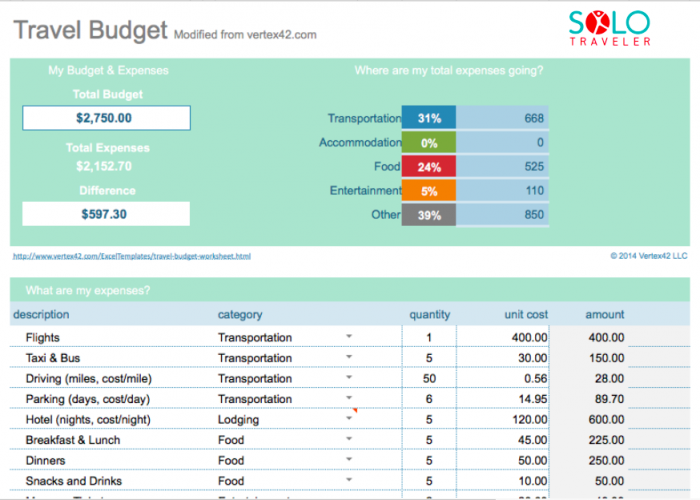
How to Budget Your Trip
To calculate the cost of your trip, begin with the big expenses and work down to the smaller ones. The biggest costs are always transportation or accommodation, depending on where you're going. If you're taking a flight (or flights), this may be your biggest expense. But if you're taking a short flight to an expensive city, accommodation may be your big ticket item. Determine which is likely to be your biggest expense and calculate what the cost will be.

1. Download our free travel budget spreadsheet.
Click here to download our free travel budget spreadsheet . There are numbers already entered into the spreadsheet to show you how it works. To begin, enter your budget for the trip. As you fill in your information for each travel expense, the financial summary at the top will tell you whether you are over or under budget. This allows you to play and decide where you want to save and where you want to splurge and still stay within budget.
2. Determine your transportation costs.
You need to consider the cost to get you to your destination and the cost of transportation on the ground. I use Rome2Rio.com to help my determine approximate costs of ground transportation. For flights, I use Flightnetwork.com . The cost of flights, bus, train, transfers, taxis, transit and car rentals, including gas and insurance must be considered.
3. Set your accommodation budget.
Determine your average nightly rate and multiply it by the number of nights you'll be there. You can read how I came in at an average nightly rate of $73.39 in Kauai even though I spent a couple of nights at a luxury resort in Budget Accommodation in Kauai: Four Ways to Stay . Also read: How to Save Money on Hotels and Other Travel Accommodation .
4. Consider your culinary desires.
Food is an expense that can vary widely. If going to the restaurants of celebrity chefs is your thing, plan for it. It will be expensive and you'll likely have to book long in advance. If you're happy cooking for yourself or eating street food, your food budget will be far less. With food it's easy to accommodate your travel budget, simply save sometimes (have a picnic of food from the grocery store) and splurge at other times (enjoy a special restaurant).
5. Factor in entertainment and activities.
Whether it's a kayaking day trip or attending a Broadway play, it's rare to go somewhere and not incur additional expenses for entertainment of some form. It's important to budget for these. Also note that it may be less expensive to purchase tickets before you go. Check out our posts on free and low-cost tips for many expensive destinations like London , Paris , Sydney , and New York .
6. Plan for walking-around money .
You may need money for things like transit, a snack, or sun block. There are dozens of small things you'll likely buy over the course of your trip. Set a daily contingency fund in your travel budget for those little extras along the way.
7. Don't skimp on travel insurance.
I believe this to be an absolute necessity. Here are the the things you need to know to ensure you get the right coverage for your needs, along with our recommended providers: A Complete Guide to Travel Insurance for Solo Travelers . If you're a senior, read Best Travel Insurance for Senior Solo Travelers .
8. Allot money for souvenirs.
This is not a line in my travel budget because shopping isn't my thing. But if it's yours, make sure you've calculated it as part of your budget. If you're shopping in a currency other than your own, read: Your Currency or Theirs? The Decision Makes a Difference .
9. Figure in some “breaking the budget” money.
Travel should be fun and it's no fun being on a tight financial leash. The amount of your “break the budget” money will depend on how long you're traveling and your overall budget. I like to have at least 15% of my overall travel budget available for spontaneous purchases.

Travel Budget, Money and Meaning
Travel budgeting inevitably means money choices and trade-offs.
As a solo traveler, you choose the trade-offs you want to make.
Take a moment to reflect. Stress can be the trade-off to consider when making money decisions. You may want to stay at a five-star rather than a four-star resort but that extra expense may cause you financial stress. You may want an amazing bike for your cycling trip but the fear of it being stolen may cause you unnecessary stress.
Rather than breaking the budget, consider shifting where you spend your budget. Some people will eat on the cheap in Italy to have the money to spend on a fabulous pair of Italian shoes. Others will stay at a hostel so they can afford to eat at a Michelin Star restaurant.
Good money decisions are about being aware of your financial constraints, stress, passions, and the trade-offs you're willing to make.
According to happiness theory, when money is spent on travel, happiness grows over time. However, when money is spent on things, happiness tends to diminish over time.
So, yes, buy travel with your money. Plan and budget your trips according to what you can afford.
Sharing is caring!
Publisher Janice: info @ solotravelerworld.com
Editor Tracey: tracey @ solotravelerworld.com
Sales Simon: simon @ solotravelerworld.com
Get Solo Travel News & Deals
- Login to Your Advertiser Account
- Solo Travel Statistics
- Media & Speaking
- Privacy Policy & Disclosure

The content of Solo Traveler and any resources published by Solo Traveler are meant for entertainment and inspiration only. Please note that while we have advertising clients promoting destinations, products, services, trips and tours on Solo Traveler and that we endeavour to only work with companies in which we have confidence, we are not responsible for the delivery or quality of their products or services. Every person and every travel situation is different. Your safety, satisfaction and fun traveling solo are your responsibility alone and not that of Solo Traveler, its publisher, editor and/or writers.
PRIVACY POLICY & DISCLOSURE: In accordance with FTC guidelines, I disclose that I may be compensated if consumers choose to utilize links located throughout the content on this site. Additionally, some posts might be sponsored to support this site. Please do the appropriate research before participating in any third party offers. All opinions are my own. Please read our full Privacy Policy here.
In a previous blog post , we discussed the importance of understanding the different traveller segments and targeting them the right way , with the right offers. In this article, we will touch on a segment which is often overlooked by hoteliers, an oversight which makes them miss out on the potential incremental revenue they can generate from these travellers.
The segment we will cover in this blog is "budget travellers". We know that most people in general love to travel; however, budget travellers take this passion very seriously and travel frequently. This article from Skift outlines the four primary travellers based on their age demographic and shows that the two biggest and growing demographics i.e. Millennials and Generation Z look for the best deal when booking their holiday, in essence making them budget travellers.
What makes a traveller a Budget Traveller?
Everyone has his or her own view of what a budget traveller is. To magazines like Budget Travel and Travel and Leisure, or even writers like Rick Steves, “budget” means travellers who do not want to spend more than $120+ hotels and $40 on meals per day. The idea of a fixed and often tight budget has given budget travellers a very negative image, one where they are often perceived to be cheapskates.
However, being a budget traveller has nothing to do with how much money one spends; rather, it has everything to do with how one spends it. In other words, it is about being frugal and smart — not cheap. For example a budget traveller wouldn't go to Bordeaux and turn down a wine tour. Instead they would find the offer which provides the best value.
How you can attract Budget Travellers?
Keeping in mind that the Budget Traveller segment is a growing one and that the focus lies on value for money, let’s see how you as a hotelier can attract them.
- Lovely Reviews Budget travellers usually hear about a destination/hotel/thing to do in a city from their friends and family; they also get influenced by online ads, posts on social media or pure instinct to travel which leads to hours of online research, a common trait in this segment. During pre-trip research, they check reviews posted by other travellers as they want to know what kind of experience they can expect. Since today online reviews probably have the biggest influence on travellers’ decision-making process, be it positive or negative, always encourage guests to write reviews.
- Offer the coolest thing at a fair price Budget travellers are looking for the best deal and coolest thing to do when they are on vacation. Hence, you as a hotelier should be aware of the city’s main local events as in this way you can offer them services or deals specific to these events.
- Convenience is king Convenience is another factor for budget travellers. By mapping your hotel to show how close it is to public transport stations, airports and business centres you highlight your hotel’s geographic proximity to these areas of interest. Perhaps you can offer transportation between these locations to add value and convenience.
How to offer better value to your budget traveller
Now that you have defined and attracted budget travellers, let’s see how you can add more value to their stay at your hotel. We have understood that budget travellers go for convenience, good deals and well-rated destinations.
Put yourself in the “customer’s shoes” and think of what kind of deal could appeal to a budget traveller, what unique experience can you offer them at great value for money or something that could make their trip a bit more convenient.
Here are a few ideas:
- Make life easy Offer local public travel cards, bike rentals, shuttles/taxis between places of interest or walking tours from the hotel. Do you charge the same or perhaps a better rate than tour operators? Let your guests know - so another hour of searching the internet is saved.
- Offer something they don’t want to miss out on Local gastronomic experiences are something we all love, right? If you have a restaurant, craft an appealing two or three-course local dinner at a fair price. Don’t have a restaurant? Then offer to reserve a table at an authentic local venue. And since all travellers are likely to indulge in some local liquor at some point, why not offer them some local wine, bubbles or a craft beer deal along with their tasting menu or as a fun night cap.
- Offer surprising-yet-relevant deals If you have a spa, offer a foot massage to help those aching feet after long hours of exploring or a free yoga lesson to relax. If there is a big party (like the Amsterdam Dance Event) in the city, provide hangover recovery packs or breakfasts, or if you know it's going to be a rainy few weeks coming up, have ponchos and umbrellas ready.
Now, imagine you had a surefire way to identify budget travellers - a rate code for example. Oaky provides exactly that and lets you create personalised welcome emails and deals for a specific group of guests. For example, if you know this group travels during the week because that’s when flights are cheaper, you can offer them extra value via exclusive targeted deals specific to certain weekdays.
What’s in it for you?
Offering budget travellers deals they will go for has two great advantages. Firstly, it generates incremental revenue for you in the short run. Secondly, because they talk about the amazing experience they had at your property, they become promoters (Net Promoter Score) who influence future travellers to come and stay at your hotel.
This will increase future revenue and create an ongoing positive cycle. Sounds like an awesome win-win situation, right?
By Maria Giovanna Argiolas
Subscribe to our newsletter to receive our latest content!
Any questions about oaky feel free to reach out.
Senior Marketing Manager
Don’t want to miss any news from Oaky?
Subscribe to our newsletter to receive a curated selection of our best content.
Your web browser is out of date.
Update your browser for more security, speed and the best experience on this site.
Travel Hacking on a Budget: How to best manage your travel money with the Australia Post Travel Platinum Mastercard®
Planning a trip overseas? Worried about managing your money abroad? Don't sweat it, this guide will show you how to become a travel money whiz with the Australia Post Travel Platinum Mastercard® by your side.
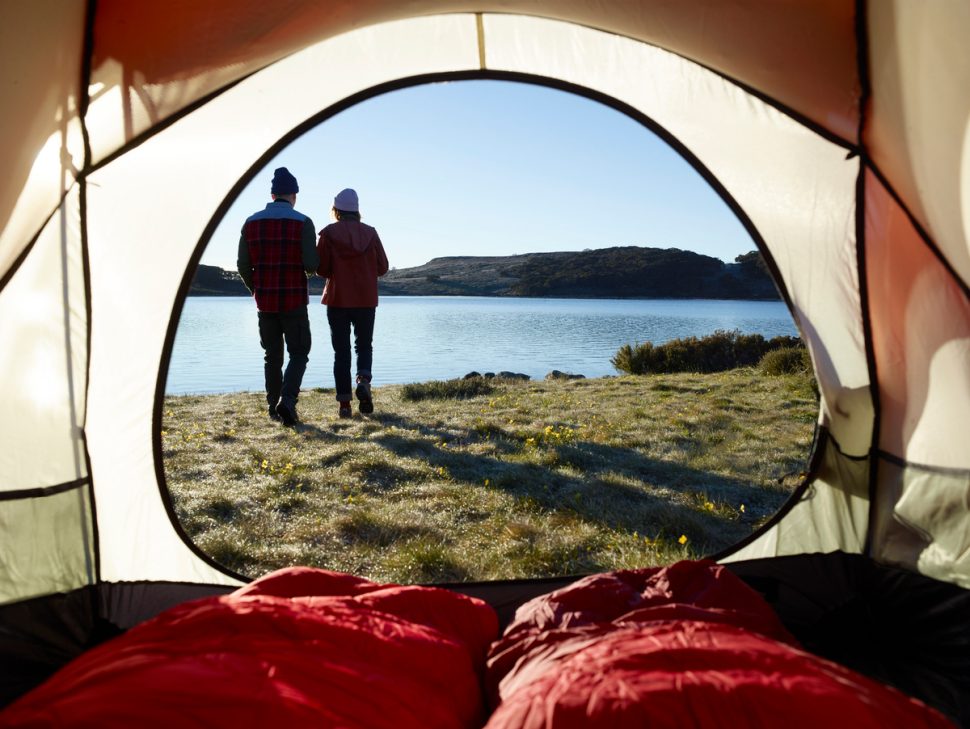
Become a Flight Ninja:
- Embrace flexibility: Be open to different travel dates and times. Weekdays and off-peak seasons often offer cheaper flights. Consider flying into less popular airports near your destination city, and lesser-known airlines.
- Utilise flight deal websites and apps: Several websites and apps like Google Flights, Kayak, Skyscanner, and Hopper aggregate deals and track flight prices. Set price alerts for your desired destinations.
- Consider Alternative Routes: Sometimes flying direct can cost more, so you might consider exploring connecting flights or open-jaw flights (flying into one city and out of another) which might be cheaper, but also allow you to see another city.
Master the art of affordable stays:
- Hostels and guesthouses: Hostels offer dorm-style rooms or shared accommodations at a fraction of the price of hotels. Guesthouses often provide a more local experience with a lower price tag.
- House sitting and home exchange: Some companies connect travellers with homeowners willing to swap houses or have their homes looked after while they're away. This provides free or low-cost accommodation and a unique cultural experience.
- Consider alternative locations: Research neighbourhoods outside the city centre or lesser known outside of tourist hotspots. You might find charming and affordable options where you may see more of the authentic side to the city.
Embrace the budget-friendly mindset:
- Free activities rule: Many destinations offer free walking tours, museums with free admission days, and hidden gems waiting to be explored. Utilise travel blogs and local resources to discover these options.
- Become a foodie on a budget: Skip expensive restaurants and explore street food stalls or local markets for delicious and authentic meals. Consider cooking some meals in your accommodation to save even more.
- Slow travel: Instead of rushing through multiple destinations, focus on exploring one place in depth. This allows you to appreciate the local culture and save on transportation costs.
Bonus hacks:
- Travel prepaid cards: Consider a travel card that offers $0 currency conversion fees like the Australia Post Travel Platinum Mastercard (when you spend and load in the same currency). Manage your budget better with a travel card – as you can only spend what you load, and it is not connected to your everyday savings or credit card accounts. Locking in rates before your travels means you’ll know exactly how much you have to spend. 1
- Avoid dodgy exchange tellers who may offer unfriendly rates: Instead tap and swipe your Australia Post Travel Platinum Mastercard at millions location worldwide. 2
- Use public transport: Many cities have excellent public transport systems with passes offering unlimited travel for a set period. This is a much cheaper alternative to taxis or rental cars, especially in larger cities.
- Discount passes: Make sure you check out the local tourist centre and ask if there are multi-passes to save on admission fees to top tourist attractions.
- Use travel apps: Look up things to do or restaurant reviews and places to stay on the go (like TripAdvisor). Use the Australia Post Travel Platinum Mastercard App to keep track of your spend or top up your card anywhere, anytime.
- Work abroad: Volunteering or working holiday programs allow you to experience a new culture while earning money to support your travels.
Remember: Travel hacking is about being resourceful and creative. With a little planning and these tips, you can embark on amazing adventures without sacrificing your budget. So, pack your bags, embrace the adventure, and get ready to explore the world on your own terms.
The Australia Post Travel Platinum Mastercard® is your travel mate so you can manage your finances like a pro. Focus on creating amazing memories, not stressing about finances. Visit your local Post Office or auspost.com.au/travelcard to get your card.
Ready to travel?
Get your travel money sorted with a prepaid travel card. Lock-in rates and add up to 11 currencies.
Mastercard Prepaid Management Services Australia Pty Ltd (ABN 47 145 452 044, AFSL 386837) arranges for the issue of the Australia Post Travel Platinum Mastercard in conjunction with the issuer, EML Payment Solutions Limited ('EML') ABN 30 131 436 532, AFSL 404131. Australian Postal Corporation (ABN 28 864 970 579, AR No. 338646), the card distributor, acts as an Authorised Representative of Australia Post Services Pty Ltd (ABN 67 002 599 340, AFSL 457551). You should consider the Australia Post Travel Platinum Mastercard Product Disclosure Statement, Financial Services Guide and Target Market Determination before deciding to acquire the product. Any advice does not take into account your personal needs, financial circumstances or objectives and you should consider if it is appropriate for you.
1 Lock in your exchange rates means the exchange rate is locked in for the initial load only. The exchange rates for subsequent reloads will be set at the prevailing exchange rate at the time of the transaction.
2 Excludes ATMs, over the counter at financial institutions and merchants who elect not to accept Mastercard Prepaid™ cards. Merchants or other providers may impose limits on use of the Australia Post Travel Platinum Mastercard®.
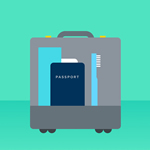
AusPost Travel Team
Share this article
Australia Post acknowledges the Traditional Custodians of the land on which we operate, live and gather as employees, and recognise their continuing connection to land, water and community. We pay respect to Elders past, present and emerging.
Example sentences budget traveller
Not for the budget traveller but expect service that's second to none.
The bus takes twice as long as the train but it's a great option for the budget traveller .
Spotting a niche in the market for low-cost ski holidays, he set up a firm offering package deals for budget travellers.
You cannot run up credit on these cards, so they are good for budget travellers, though some charge about 10 for the card and some insist on minimum loads.
But the lodge, which started out as a backpackers' hostel, still makes room for families and budget travellers.
Definition of 'traveller' traveller

Definition of 'budget' budget
Related word partners budget traveller.
Browse alphabetically budget traveller
- budget squeeze
- budget surplus
- budget traveler
- budget traveller
- budgetary concerns
- budgetary constraints
- All ENGLISH words that begin with 'B'
Wordle Helper

Scrabble Tools
Quick word challenge
Quiz Review
Score: 0 / 5
- Access the entire site, including the Easy Learning Grammar , and our language quizzes.
- Customize your language settings. (Unregistered users can only access the International English interface for some pages.)
- Submit new words and phrases to the dictionary.
- Benefit from an increased character limit in our Translator tool.
- Receive our weekly newsletter with the latest news, exclusive content, and offers.
- Be the first to enjoy new tools and features.
- It is easy and completely free !
Industries Overview
Latest articles, search saw consistently higher clickthrough rates than social and retail media worldwide in the last year, the new era of peer-to-peer resale: how major brands are entering the secondhand marketplace, out-of-home advertising lifted by digital formats, an election year, and investment in transit, us senate passes bills that restrict social media usage for minors, most gen z and millennials are comfortable making travel purchases on mobile, exclusive: marketers project sales growth to outpace ad spend in q4 2024, 3 ways gen z is paving their own path to purchase, 4 factors supercharging ad spend the rest of 2024, kroger cuts prices to keep pace in fight for us consumers’ grocery dollars, bad ad breaks and latency hamper ctv's advertising potential, about emarketer, the daily: how travel is changing—has it actually fully recovered, how budget airlines are pivoting, and more.
On today's podcast episode, we discuss the travel stats that sum up how the year has gone, if a full recovery is even on the cards, and what’s next for budget airlines. Tune in to the discussion with host Marcus Johnson, forecasting writer Ethan Cramer-Flood, and forecasting analyst Zach Goldner.
Subscribe to the “Behind the Numbers” podcast on Apple Podcasts , Spotify , Pandora , Stitcher , YouTube , Podbean or wherever you listen to podcasts. Follow us on Instagram
Episode Transcript:
Ethan Cramer-Flood:
I would be cautious in assuming that things are "back to normal." We're acting as if the world has now returned to pre-pandemic times. Let's compare everything to 2019 and see if things are better or worse, and then make some decision from that point. I'm not sure things are really back to normal. I think there's still distortions in how regular people are choosing to spend their money.
Hey gang. It's Thursday, September 12th, Ethan, Zach, and listeners, welcome to the Behind the Numbers Daily, an eMarketer podcast. I'm Marcus. Today I'm joined by two folks. We have one of our senior forecasting analysts based in Colorado. His name is Zach Goldner.
Zach Goldner:
Hey, Marcus. Thanks for having me.
Hello, sir. Yes indeed. Thank you for being here. We're also joined by our visible forecasting writer. He is over in New York City and we call him Ethan Cramer-Flood.
Marcus. It's apple picking season.
But instead of apple picking, I'm here with you on a podcast. Let that sink.
Okay. Don't say it like that.
Ethan, how many apples did you have last year?
So many. The amount of apples that you come back from an apple picking sojourn with will dominate your kitchen for the next two months. It's just outrageous.
I think you're taking too many. I think that's what's happening.
Yeah, no, yes.
Leave a few behind.
We take too many. I'm not taking full blame for this. But let's say things happen and you end up eating nothing but apple related content for the next two months.
Sounds like a crime taking place, but we'll talk about it later.
The only crime here is that Ethan didn't give me me an apple, but I-
The only crime here is apple pie and that Americans think that's a socially acceptable dish.
Ooh. Shots fired.
Yeah, it's truly awful.
I enjoy apple pie, but after two months of nothing but apple related food, I don't enjoy any of it.
Okay. All Americans, apple pie, peanut butter?
Chicken and waffles.
You got to keep these hot takes to yourself.
My ears are bleeding.
They know I'm right. If I ever ran for president.
You got to keep these takes to yourself.
Is that not true? Do you guys not like peanut butter?
No, I love peanut butter. I love apple pie. I'm a normal person.
There we go. Exactly.
It's a staple.
See? All Americans. If I ever ran for office, free peanut butter for everyone, and I'll get elected like that. Marcus 2028. Look out. All right, we probably don't need a fact of the day because we've been talking about American foods the whole time. So let's just start the episode. Today's real topic, how travel is changing. Has it fully recovered and how budget airlines are pivoting.
All right, let's talk about the state of travel. So at the start of the year globally, a record 4.7 billion people were expected to fly this year surpassing 2019's figure of 4.5 billion according to a projection at the time by the International Air Transport Association, IATA. The travel world certainly had a tailwind going into this year. US and tourism related spending grew 7% last year, outpacing 2019's previous high, according to the World Travel and Tourism Council. US domestic travelers, zooming in on America for a second, spent 9% more than they had in 2019.
So those numbers all look good. But looking at major travel periods for this year in America, couple for you, 7.7 million folks flew around the country over Memorial Weekend. That's over half a million more than a year ago. And around 44 million families hit the road over the holiday weekend as well. It's close to the 2005 record. Juliana Kim of NPR notes that Labor Day, another major holiday, travel holiday, in America, was expected to see the busiest ever for the holiday at airports with 17 million passengers playing to fly through Wednesday, according to the TSA. The best we've seen in five plus, six plus years. Ethan, I'll start with you. What has been the most interesting travel stat to you that you've seen this year and why?
So one thing I just recently discovered via these articles that you sent around, although they were primarily about flying, the stat that was buried in there was about gasoline prices in the US and the fact that they're actually down. Which I found somewhat counterintuitive and in some cases they're tremendously down. So if we're talking about these travel related data points that we constantly see, it seems like every holiday weekend there's a new record being set, more people are spending money traveling, more people are flying, more people, just everything. We set a new record all the time. It's also that gas prices are actually down and there's almost no category I can think of in the world across any industry or any product set where prices are lower now than they were just a couple of years ago.
Good point.
But they're significantly lower. It was like $5 in 2022 and then in 2023 it got under four and now it's like 3.50. That's a major decline.
So people have the ability to drive around. Now once you get there, the pricing reality of after you travel, we spend a lot of time talking about ticket prices and airlines and whether they're up or down and whether flying internationally is higher and we're going to talk about low cost airs and then gasoline prices being down. Once you get there, hotel prices and the cost of everything that you intend to do once you arrive in your destination, those are still outrageous. But it is fascinating that there's almost nothing in America that's cheaper now than it was a couple years ago, but in travel, some of it is.
I mean, lower gas prices definitely helping, particularly on that Labor Day weekend. Gas prices over that weekend were about 3.35 a gallon for regular down from 3.82 a year ago. So a significant drop. And that has contributed to Americans hitting the road a lot more. AAA reporting domestic travel over Labor Day weekend was up 9% year-on-year and that seems to be something people are doing instead of international travel. That was down 4%, international travel over Labor Day weekend, according to AAA down 4%, as international travel costs up 11%. Zach, for you?
What jumps out?
So as you had mentioned the article and what our own forecast show in terms of ad spending on travel, but we're seeing that the industry remains elevated here in the US and internationally. And that is as inflation continues to hurt the average American's pocketbook, the effects that we're seeing are not being distributed equally. So the statistic I want to share with you guys is something from CoStar Group and a Wall Street Journal piece regarding ultra luxury hotels.
The number of US hotels with an average daily rate of $1000 plus in the first half of this year was 80. That's compared to 22 in 2019. Now, if we were to look across the pond in Europe, you have the number of places have tripled in that time. So I don't know about you, I can't afford $1000 hotel a night, but what we're seeing in travel is also being reflected in the economy. As when the middle class is getting a little more squeezed, we're seeing luxury being hotter than ever before. Those that do have the money to spend are making up from their time during COVID being spent inside their homes and they're splurging.
It's interesting to hear you make this observation about that in Europe as well because one of, at least an anecdotal experience I had is that although, I mean to Marcus's point, international travel declined 4% even while we're seeing these explosive travel figures for within the US. But in my experience as an individual, I would encourage everyone to think about the cost of their trip after they've landed. So while it is true that flying overseas is incredibly expensive, the ticket, the airfare, is prohibitively expensive and can be scary, once you land, things are a lot cheaper. Every hotel I've stayed in in Europe in the last couple of years has been less expensive and better than what it would be in the US where prices have absolutely exploded. So what it takes for you to have a good time on your trip after you've gotten there can often actually be less expensive if you leave the country. But the problem is that barrier. It's getting on the flight in the first place.
Personally, I'm a big skier. I've seen on social media a lot of comparisons comparing the US ski resorts to that of the European ski resorts, which can be five times the size or larger. And when you look at day pass here in the States, some resorts are up to $300 a day. Compare that to Europe where you might be spending 25, 50, 75 bucks?
Yeah, exactly.
But to your point, Zach, there does seem to be a bit of a travel bifurcation that's getting worse. And you mentioned hotels. Marriott's high-end brands, Ritz-Carlton, St. Regis, W Hotels, outperforming those of the lower chains that they have. Also home rentals. Rachel Wolfe, who writes for our retail briefing was pointing this out. Slowing demand from US guests in Q2, except for those in higher income brackets who pick more expensive listings, that was according to Airbnb CEO, Brian Chesky. And then in terms of airlines as well, Delta and United reporting strong growth in revenues from their premium cabins in Q4, up 15% year-on-year for Delta and 16 for United. While budget carriers like Spirit and Frontier had to resort to steep discounts to fill the seat. So it does seem like it's getting harder for travel for people in the lower income brackets. And Deloitte's summer travel survey showing consumers with incomes under 50 grand making up 19% of travelers. That's down from 31% of travelers a year ago.
It did feel to me though, I mean maybe we said this last time, it does feel like travel is back and there's some numbers from the TSA showing this summer, so June, July, August, the TSA screened an average of 2.7 million passengers a day versus 2.3 million over the same period in 2019. And then Labor Day, I mentioned that 17 million figure, 17 million Labor Day flyers would be 4% more than last year, 11% more than pre-pandemic 2019.
And Marcus, as you do mention how some of those more budget airlines are changing up some of their features and their offerings, they're moving more towards a premium strategy where they're allowing you to maybe block off the middle seat or allowing wifi on all plans, which are going to eventually increase up the price of the ticket, squeezing the middle class even more for a pricier ticket.
Let's talk about those budget airlines for a second because there was an Economist piece that was titled from Southwest to Spirit, Budget Airlines are in a Tailspin, pointing out that today Southwest is America's biggest domestic carrier and the world's fourth-largest airline, turning an annual profit every year since inception in 1973 to 2019. However, it points out the pandemic has hammered profit. Southwest's revenue of 26 billion last year was above pre-pandemic levels, but net profits fell from 2.3 billion in 2019 to just 500 million, the article noting that neither Spirit or JetBlue have turned an annual profit since the pandemic. Ethan, what's next for budget airlines, particularly in America?
Well, unfortunately it seems like what's next is basically what Zach said in that they're going to attempt to turn their fortunes around by leaning into more premium options and trying to compete maybe a little bit more with the legacy carriers. That doesn't seem like the way to go.
I mean, my initial instinct was they need to get back to actually competing at being low cost options because they hardly seem like they are anymore. Again, this is anecdotal. I live in New York City, so I realize that my experience as a frequent traveler over the last 10 years or so may be distorted because we have weird idiosyncrasies with how competitive it is flying in and out of New York and the airport fees, et cetera. But rarely do these low cost airlines actually present the lowest option anymore.
It used to obviously you would know that they would be your lowest price option and then you would make the decision as to whether you want to deal with everything that comes with that. Nowadays they don't even, when you're searching for your airfare and your flight here, they're not even the ones that come up because the legacy carriers have done such a good job at competing at the lower end. They put you in the back, the very end of economy, coach class, whatever. That's fine. And you're going to have to pay for all your add-ons. But very frequently for us, it would be more JetBlue. We don't have as much Southwest here, but something like JetBlue that always used to be the cheapest just isn't anymore except for in certain routes. And very frequently they're being undercut. So be low cost. This is what people are looking for. It's expensive to ride on these guys now, so why wouldn't you just go with the legacy carriers that give you more ancillary benefits?
I do wonder if they can compete with that because those folks, to your point, they're offering lower cost seats. Keith McMullan, Aviation Strategy, agreeing with you, Ethan, saying legacy carriers are filling up the empty seats to the back with no frills fares. And I wonder how to look, I mean I'd known because booked flights recently and I'd seen the tickets, but there's a couple of examples. Virgin Atlantic that flies from the US to Europe, they split their economy ticket into economy light, classic, and delight. United split their economy into basic economy, economy, and economy fully refundable. Americans split economy into basic economy, main cabin, and main plus. And so they have taken that lower end ticket option they had, made an even lower end one, one in the middle, and one that's a little bit above that, and it seems to be working.
Zach, my question is, can low cost airlines exist in the US the way that they exist in Europe? And I say that because, so Ryanair, that's Europe's biggest airline by passenger volume and their main low cost carrier over there, they hit record profit and their August numbers were also at record highs. So they're doing well. Wizz Air is another Hungarian based one. They're doing well as well. But part of the reason they're doing well, Europe has more secondary airports, so they don't fly you necessarily to the big hub airport. They'll fly you to an airport just outside the city, so it's cheaper for them to rent the space from those secondary airports for low cost airlines. And two, the country's a lot smaller, and so when you're flying between places, there's an hour flight here and there. You can get an hour flight here and there to some parts of the US, but it's just so much bigger. So can they even exist at low cost airlines in America?
You look at what's happening in the economy right now, they're trying to merge and be acquired by a bigger group. The consolidation among US airlines right now is intense. There's only a handful of real competing airlines.
I think you brought up a great point about Ryanair. I think that if an airline really were to just be cheap, there are two factors that Americans look for most. One, they want to look at the cheapest price, and two, they want to make sure they get to their destination and on time. If you were to get those two factors down, I think that you could replicate a strategy like Ryanair. Yes, the airline that even openly mocks its customers for giving negative reviews.
It's true.
People don't care about the experience on the actual plane nearly as much, where if you're able to just get those two factors down, I think you'd really be open up to a big base of Americans that are making under $50,000 a year that would be willing to take more flights if the fares were lower.
Yeah. Ethan, do you agree?
I would be cautious if I was these companies and anyone thinking about this. I would be cautious in assuming that things are back to normal, "back to normal." We're acting as if the world has now returned to pre-pandemic times. Let's compare everything to 2019 and see if things are better or worse and then make some strategic decision from that point. I'm not sure things are really back to normal. I think there's still distortions in how regular people around this country are choosing to spend their money in terms of the balance between services and consumer goods and retail and also we have this incredibly distorted housing market and this sort of frozen housing market, which also changes the availability of money in people's pockets. And at the end of the day, I think we will get back to a point where more consumers will go back to looking for the low cost carriers.
I mean, right now their legacy ones are able to fill up all their seats and the low cost ones are not able to fill up all their seats, but when these spending decisions actually get back to a truly "normal" level, I think the demand will pick back up, if they're there offering those low cost options. That's my concern is like they're going to shift their strategy and they're going to go premium, and then three years from now when people are making normal decisions again and they're looking for these cheap options, they're not going to be there.
Yeah. Good take.
I think what you see that has the most amount of momentum at the moment is with business travel and with first class, upper class people, that are getting a premium offering on planes, and since we're now three, four years post-pandemic, we're looking at that momentum is going to eventually slow down and you're going to want to tap into a bigger audience. And that's where I see that airlines are continuing to want to price segment their demographics and airlines might want to try to open up more towards lower income individuals here in the US.
Yeah. Budget airlines seem to be working around the world, just struggling more in the US. The Economist was pointing out in 2001, budget carriers accounted for less than a 10th of global flight capacity. That figure now at one-third, according to the consultancy OAG. In America, yeah, things just aren't great. The share prices of America's four biggest low cost airlines tanked by nearly 50% on average since the start of last year, 2003. Those of America's three legacy carriers, American, Delta, and United are up by 5%.
Marcus, I know we're up against time, but let me get in a plug on something here.
Because we're thinking about these airlines and how they can get back to profitability and become sustainable. We have a possible solution to that coming out relatively soon. Our forecasting team is hard at work on our debut forecast for travel media ad spending, which is part of this whole commerce media trend.
Oh, interesting.
And when you think about additional sources of revenue, particularly in a low cost environment where part of the deal is that you're going to have a relatively bad experience, but you're going to get a cheap ticket and you're going to get where you want to go. If you think about these, that travel media is the way in which all transit and travel related companies, be they car services or airline services or anything in the travel world, can leverage their first party data to deliver advertising to their customers or their passengers or whatever. You think about the screen in the front of the seat when you're sitting in an airplane or all the different ways that there could and probably will be more ads coming at you in the future.
Now all the airlines are doing this, not just the low cost ones, but it's a pretty obvious way for more revenue to come in. That's the trade off that, again, maybe the premium travelers are going to say, "I want an ad-free experience." But the low cost providers are going to be like, "We're going to drown you in ads, but the ticket's going to be cheap because we're making up all this revenue." So we're going to have a forecast on how much money is in that.
That's a great point.
And your seat, the screen in front of you, knows who you are.
Yeah. They've got a lot of information about you.
Or personalized ads.
Ethan, one more time. The title of that forecast?
Digital Travel Media Ad Spending.
Okay. ProPlus subscribers, you can head to eMarketer.com and get hold of that. This month, it's coming out?
Within the month. Yeah.
Yeah, by the end of the month.
Okay, perfect. All right, that's all we've got time for this episode. Gents, thank you so much for hanging out as always. Thank you to Ethan.
Thanks a lot.
Thank you, Zach.
Thanks for having me.
Yes, indeed. Thank you to everyone who took time to listen to this episode. Thank you to Victoria who edits the show. Stuart runs the team. Sophie does our social media. We hope to see you tomorrow for the Behind the Numbers Weekly Listen, an eMarketer video podcast that you can of course check out on YouTube if you want to follow along to some of the data and the charts that we put up on the screen and see our faces. Or you can of course listen to us on any of the podcast platforms.
Industries →
Advertising & marketing.
- Social Media
- Content Marketing
- Email Marketing
- Browse All →
- Value-Based Care
- Digital Therapeutics
- Online Pharmacy
Ecommerce & Retail
- Ecommerce Sales
- Retail Sales
- Social Commerce
- Connected Devices
- Artificial Intelligence (AI)
Financial Services
- Wealth Management
More Industries
- Real Estate
- Customer Experience
- Small Business (SMB)
Geographies
- Asia-Pacific
- Central & Eastern Europe
- Latin America
- Middle East & Africa
- North America
- Western Europe
- Data Partnerships
- Client Testimonials
Media Services
- Advertising & Sponsorship Opportunities
Free Content
- Newsletters
Contact Us →
Worldwide hq.
One Liberty Plaza 9th Floor New York, NY 10006 1-800-405-0844
Sales Inquiries
1-800-405-0844 [email protected]
Quiet Travel On The Algarve Coast
The Algarve is one of Europe’s most popular tourist destinations but a stay at Wyndham Grand Algarve places you in reach of quieter spots, close to the Ria Formosa and Quinta do Lago.
- Share to Facebook
- Share to Twitter
- Share to Linkedin
Even in the peak season, you can lose yourself for a few hours, away from the tourists, amid the quiet nature of the Ria Formosa. This unique coastal maze of sand dunes, mud flats and salt marshes, on Portugal’s Algarve coast, stretches 60km, linking some of the region’s most dramatic beaches and barrier islands. Some five million visitors may have descended on the Algarve coast in 2023, but its beauty lies in its vastness—meaning you can still find uncrowded beaches, stunning coves and beauty spots that immerse you in nature.
Faro Island borders the Ria Formosa and Atlantic coast.
In fact, the Ria Formosa, one of Portugal’s most-lauded protected nature reserves, is often more alive with wildlife and birds than human visitors: with Glossy Ibises, Spoonbills and Woodchat Strikes making their nests within the habitat and swooping across the skies. Wooden and sustainable boardwalks criss-cross the waterways (designed to have minimum effect on the natural landscape) meaning it’s easy to soak up the gentle atmosphere. Meanwhile at seaside towns, such as Tavira and Faro Island, that border the reserve, you can traverse the salt flats as fishermen catch oysters, and head to the beach to set up for the day by the Atlantic shore.
The Laranjal Course at Quinta do Lago is found 2km east of the resort, in the Ludo Valley, and is renowned for its five lakes, umbrella pines, cork-oaks and orange trees.
Nearby, Quinta do Lago , a sprawling enclave of luxury hotels, chic restaurants, charming shops and desirable real estate, puts you at the heart of the beauty. The resort is home to a series of championship golf courses, but also embraces the allure of nature and outdoor life that the Algarve is known for.
The lobby at Wyndham Grand Algave.
Wyndham Grand Algarve is one of the Quinta’s flagship hotels. The petite bolthole may come under the big-brand Wyndham umbrella, but it is nonetheless boutique in feel. Even with 132 rooms, it manages to offer an intimacy not usually associated with larger hotel brands, and focuses on a family-friendly offering—from its apartment style suites (some come with a kitchen, dining and living area) to the Kids’ Club, with its line-up of innovative activities, such as gardening workshops, pastry classes and treasure hunts.
A two-bedroom suite at Wyndham Grand Algarve is designed to feel like an apartment.
Step inside the hotel and the property oozes style and a slick sophistication with a polished, granite floor, towering plants and flashes of dusty pink. There’s modern art lining the walls in the public spaces—you can scan a QR Code to tell you about each artist and see more of their work—while an impactful, statement chandelier, hanging from the three-storey circular lobby, sets the scene. Rooms echo this aesthetic with comfy, modular furniture, a smart terracotta and dove-grey palette juxtaposed with plenty of natural textures (think: leather seating, stone flooring and wood panelling).
Boutique-style bedrooms offers elevated living.
Best of all, there’s space to spread out, with balconies overlooking one of Quinta do Lago’s manicured golf courses, large bedrooms with en suite bathrooms and a light-filled living space that means families can chill out, eat together and rustle up a snack or coffee (or even cook, if they wish, as the contemporary open-plan kitchen has a cooker, toaster and Nespresso machine).
Oasis Pool Bar is the perfect spot for lunch.
In truth, you’ll probably be more tempted to dine in one of the hotel’s restaurants. Breakfast is served at Caravela—where tables groan with fresh fruits, artisan breads and pastries—while the poolside Oasis offers easy-going, crowd-pleasing dishes—from salmon and avocado tacos to club sandwiches. A highlight is chef Olivier da Costa’s XXL by Olivier Restaurant which offers a European-fusion menu. Start with Spanish Croquettes, made with parmesan and basil, or ‘head to’ France and opt for Escargots. A standout dish is the Shrimp a Guilhi, slathered in herb butter. As well as the signature XXL Steak, there is a Lobster Steak and Dory Fillet with Tomato Rice. For dessert, make sure to leave room for the signature Dulce de Leche Souffle—a heavenly ending to a gourmet adventure.
XXL by Olivier Restaurant brings a fusion of Mediterranean cuisines.
Sitting in the heart of Quinta do Lago, Wyndham also puts guests in reach of a wide collection of activities found under its roof as well as in the region. There’s golf, of course, on one of the three pristine, championship courses and the hotel also offers a calendar of fitness classes—such as Full Moon Yoga and training in its gym.
The Campus offers elite training facilities.
For true sports fans, found just 1km away is The Campus , an elite sporting destination, where you can try your hand (and book in for a lesson) at a huge array of sports and adrenalin-fuelled activities—whether it is tennis or Padel (there are indoor and outdoor specialist courts). One of the most prestigious sport complexes in Europe, The Campus attracts world-renowned athletes to use the cutting-edge training and rehabilitation facilities so you might well brush shoulders with renowned track stars or football or rugby players. That’s not to mean that guests at Wyndham can’t be part of the action. As well as bespoke lessons, training programmes and one-on-one coaching, you can utilise the two state-of-the-art gyms and recovery facilities or try one of the fitness classes—there’s a bulging timetable, from Reformer Pilates to Yin Yoga. As well as a 25m heated outdoor pool, there are also hydrotherapy pools as well as hot and cold plunge baths. It’s easy to spend a whole day here.
Dano's gives a relaxing twist on the sports' theme.
Post cool-down, head to Dano’s , a sports-bar concept carved out of a warehouse-inspired space, to refuel. On the menu? Vietnamese Chicken Salad, Spiced Lamb Skewer, Yellowfin Tuna Tostadas as well as protein shakes and smoothies.
Umami is inspird by Japanese fish dishes.
One of the advantages of being a guest at Wyndham Grand Algarve is the fact that you can enjoy all that Quinta do Lago offers, including tapping into its elevated restaurant offering. To get around, a car is a good idea, although you can arrange transfers with the concierge. For Asian dining with a twist—think: Shellfish Bao Buns, Crispy Wontons and Wagyu with a Szechuan Sauce—head to Umami . With its Japanese-inspired setting, wooden jellyfish art installation and lakeside location, it is a serene spot.
Bovino offers a convivial atmosphere and a tradtional steakhouse vibe.
The buzzy Bovino Steakhouse , on the other hand, has an Argentinean feel, with its velvet seating, scrubbed wood tables and boho aesthetic. There’s Oysters from Ria Formosa or Sautéed Shrimps on Flatbread to start; for mains, a must is one of the cuts from the steak menu—a Rump Cap, perhaps, or Ribeye—and don’t forget to leave room for the Key Lime Pie.
Casa Velha has a tradional Portuguese feel.
For Portuguese flavours, you can’t beat Casa Velha . Headed up by chef José Botelho, the charming restaurant, with al fresco dining amid olive trees, offers a sharing concept menu—from Clams in White Wine to Chicken Piri Piri.
Casa do Lago offers a culinary escape.
Caso do Lago , a nautical-themed restaurant with lakeside views, manwhile, brings a different ambiance and is perfect for long-lunches or glamorous, candle-lit suppers by the water. Championing local seafood, there’s Prawn and Crab Bon Bons or Tuna Crudo, Chargrilled Octopus Salad and Monkfish Loin. Bag a table on the deck to watch tiny boats go by and Egrets drift over from the nearby Ria Formosa.
Enjoy relaxing days at Wyndham Grand Algarve.
A stay at Wyndham Grand Algarve also means you are in reach of Quinta do Lago Beach—a wide expanse of sand where the hotel has its own beach club—or you can simply relax by the hotel’s pool. Make sure to hire a bike to cycle the trails that lead to Ria Formosa. Further afield, you can explore local, pretty towns, such as Faro Old Town and Loulé, as well as the coastline’s famous beauty spots, such as the Benagil Caves. After a day exploring, you can head back to Wyndham Grand Algarve to its Grand Spa, where you can book in for Cinq Mondes body massage–from hot stones to detox (perfect for tired legs, post cycling jaunt), a cleansing facial or Moroccan hammam ritual. Afterwards, there are cocktails in the Grand Bar & Lounge—try the gin based Basil Smash, for a herb-spiked treat. It’s as nature intended.
- Editorial Standards
- Reprints & Permissions
Join The Conversation
One Community. Many Voices. Create a free account to share your thoughts.
Forbes Community Guidelines
Our community is about connecting people through open and thoughtful conversations. We want our readers to share their views and exchange ideas and facts in a safe space.
In order to do so, please follow the posting rules in our site's Terms of Service. We've summarized some of those key rules below. Simply put, keep it civil.
Your post will be rejected if we notice that it seems to contain:
- False or intentionally out-of-context or misleading information
- Insults, profanity, incoherent, obscene or inflammatory language or threats of any kind
- Attacks on the identity of other commenters or the article's author
- Content that otherwise violates our site's terms.
User accounts will be blocked if we notice or believe that users are engaged in:
- Continuous attempts to re-post comments that have been previously moderated/rejected
- Racist, sexist, homophobic or other discriminatory comments
- Attempts or tactics that put the site security at risk
- Actions that otherwise violate our site's terms.
So, how can you be a power user?
- Stay on topic and share your insights
- Feel free to be clear and thoughtful to get your point across
- ‘Like’ or ‘Dislike’ to show your point of view.
- Protect your community.
- Use the report tool to alert us when someone breaks the rules.
Thanks for reading our community guidelines. Please read the full list of posting rules found in our site's Terms of Service.
I spent nearly $3,000 on a Disney vacation. I'm canceling all my plans this month to limit my spending.
- I recently returned from a vacation to Disney World, and it was too expensive.
- I now have to curb my spending this month by staying home and cooking my meals.
- Though my mental health may take a hit, I'd rather budget like this than not travel at all.

I am in the middle of what I'm calling Stay Home September.
It's something I made up — a catchy phrase to distract me from the fact that I have to stay home for the month to save money .
I recently returned from a trip to Disney World , where the cost of lodging, park admissions, food, and transportation reached shocking numbers. After my trip, I calculated I spent nearly $3,000 for six days and five nights at the parks — far more than I could afford.
To earn some of that money back, I've vowed to stay home for most of September and spend as little money as possible.
Food is my biggest expense and my biggest obstacle
Every month, my biggest expense (beyond my New York City rent ) is food. I often order takeout, go out to eat with friends, and order expensive groceries using InstaCart.
Related stories
On average, I spend close to $1,000 on food a month. But during Stay Home September, I have to curb that expense significantly.
I have deleted my DoorDash app , so there will be no last-minute McDonald's orders. I also deleted InstaCart, so I won't be getting my fancy Wegman's hummus this month.
Instead, I will go to my local grocery store , buy food for the week, and cook every meal. I'm a terrible cook, so I am not looking forward to this change, but I hope this measure will cut my biggest expense in half.
My social life will most likely take a hit
My second biggest expense comes from going out with friends — whether that's attending shows, eating out at restaurants , exploring museums, or going to the movies.
This month, I will abstain from all of those activities. I have told my friends not to entice me with invitations, and I've already had to say no to two comedy shows I really wanted to attend.
I also told my friends that if they want to hang out this month, we must do it at my or their house. Some prefer to go out and explore the city, and I don't blame them, so I know that my social life will take a hit during Stay Home September.
I'm worried about my mental health this month
It seems that every time I leave my house in New York City, I spend at least $50. To avoid that, I will spend a lot of time alone in my one-bedroom apartment .
As an introverted extrovert, I get a lot of my energy from being with people and hanging out with friends. I'm worried that staying home for most of a month will make me feel isolated and left out.
A small part of me fears my friends will forget about me this month because I can't do everything they want to do. But I keep reminding myself that my friendships aren't based on the amount of money we spend to hang out. My friends will still hang out with me, and we will find free things to do together around the city.
When I do feel that inevitable loneliness this month, I have a support system to fall back on, including a therapist. I also have crafts set up to keep my mind busy while at home.
All this is a sacrifice I'm willing to make for travel
Since travel is so important to me, most of my annual savings go toward travel expenses.
I went to Costa Rica last summer, explored cities in Italy the summer before that, and spent a week in Orlando at three Disney parks last month. In between those big trips, I've taken smaller ones throughout the year to cities around the US.
Between flights, hotels, Airbnbs, and excursions, vacationing isn't cheap. Each of these trips took a large chunk out of my savings.
As the cost of travel continues to rise and my savings account continues to dwindle, I am aware that I will probably be having a lot more stay-home months in the future.
Sure, I could have avoided a lot of budgeting pain this month if I had just not taken that costly Disney trip to begin with, but travel is important to me. I'd rather spend money, have adventurous experiences, and explore new cultures than stay home and count my dollars.
If budgeting for a few weeks so that I could see the world — yes, even Disney World — is the price I have to pay, then so be it.
Watch: While Delta's business is 'extremely robust,' the airline's marketing chief stays focused on the data
- Main content
- How to Tie a Tie
- Best Coffee Beans
- How to Shape a Beard
- Best Sweaters for Men
- Most Expensive Cognac
- Monos vs Away Luggage
- Best Luxury Hotel Chains
- Fastest Cars in the World
- Ernest Hemingway Books
- What Does CBD Feel Like?
- Canada Goose Alternatives
- Fastest Motorcycles in the World
What is proof of onward travel? Don’t let this one rule mess up your travel plans
Don't let this rule ruin your trip.

Planning a spontaneous adventure can be exhilarating—buying a one-way ticket, exploring a new country without a set itinerary, and letting your travels unfold naturally. However, one often overlooked rule can throw a wrench in these carefree plans: proof of onward travel.
Many travelers have found themselves stuck at the airport , unable to board their flight, or even stranded in their home country, all because they didn’t have the required documentation to prove they intended to leave their destination at some point. Let’s break down what proof of onward travel is, why it’s required, and how you can avoid this costly and frustrating hurdle to keep your travel plans on track.
What is proof of onward travel?
Proof of onward travel is a requirement imposed by many countries to ensure that visitors have plans to leave the country before their visa or entry period expires. Essentially, it’s a way for immigration authorities to prevent illegal immigration by making sure travelers aren’t planning to overstay their welcome.
This proof typically comes in the form of pre-booked round-trip tickets or a ticket showing that you have arrangements to exit the country, whether by plane, bus, train, or even ferry. Without this documentation, you might find yourself unable to board your flight or enter your destination.
Who enforces proof of onward travel?
The enforcement of proof of onward travel is typically the responsibility of the airline, and countries require them to verify that passengers have a ticket to leave the country before they even board the flight. When you check in for your flight, it’s usually the airline staff at the desk who will ask to see your proof of onward travel.
This policy is in place because if an airline allows you to board a flight without proper documentation and immigration officials at your destination refuse to let you enter, the airline becomes responsible for the cost of flying you back to your home country. Additionally, they may face some hefty fines for not adhering to the entry requirements of the destination country.
Even if you manage to board your flight without a return or onward ticket, be prepared for immigration authorities at your destination to question you. They have the final say on whether you’re allowed into the country, and without proof of onward travel, you could face a complicated and costly situation.
How to get proof of onward travel
If you’re planning a spontaneous trip but need to satisfy the proof of onward travel requirement, there are several ways to do so without completely derailing your plans. Here are some options to consider.
Purchase a refundable ticket
One of the safest and most straightforward ways to get proof of onward travel is to buy a refundable ticket. After you’ve entered your destination, you can cancel the ticket and get your money back, minus any potential fees. This option is ideal if you’re okay with waiting a bit for the refund to process. It provides legitimate proof without the risk of losing your investment.
Use your airline miles
If you have accumulated airline miles, you can use them to book a ticket for onward travel. Once you’ve cleared immigration at your destination, you can cancel the ticket and have your points refunded to your account. This method is cost-effective since no money is spent, and you’ll still have your miles to use for future travel plans.
Use a budget airline to purchase a ticket
Another option is to buy a low-cost ticket on a budget airline. If your plans change or you don’t end up using the ticket, the financial loss is minimal. This approach is less ideal than the refundable ticket, but it’s a quick and easy way to meet the requirement without breaking the bank.
Buy a train or boat ticket
Some airlines might accept a train or boat ticket as proof of onward travel. These tickets are often much cheaper than flights, making them a more affordable option. However, be aware that not all countries accept non-airline tickets, and some might insist on seeing a plane ticket specifically, so this method can be a hit or miss.
A word of caution
Never forge a ticket to meet the proof of onward travel requirement. This could land you in serious legal trouble, including fines, deportation, and even a ban from entering the country in the future. Always opt for legitimate methods to ensure a smooth travel experience.
Which destinations require proof of onward travel?
Proof of onward travel is a requirement in many countries around the world, and it’s important to be aware of these regulations before jetting off. One of the most notable countries with this rule is the United States. Visitors entering the U.S. are expected to have a return ticket or onward travel plans in place.
Other countries with similar requirements include New Zealand, the United Kingdom, Brazil, Indonesia, Costa Rica, Peru, and the Philippines. However, it’s important to remember that these are just a few examples. The list of countries requiring proof of onward travel can change, and the rules might differ depending on your nationality or the type of visa you are entering with. Therefore, it’s always a good idea to check the specific entry requirements of the country you’re visiting before you travel.
Editors’ Recommendations
- This is the biggest signal yet that Dubai is a can’t-miss destination for travelers
- Air travel is a mess: Worldwide IT outage halts flights
- What is a redress number for air travel?
- Don’t commit a faux pas: Your guide to tipping around the world
- Don’t pack these 9 TSA-prohibited items in your checked baggage

Connecting flights is oftentimes a seamless experience, while other times, you may find yourself running full speed through the airport to make it to your plane. Missed connecting flights are an unfortunate aspect of frequent air travel. But what happens if you miss a connecting flight? Navigating the aftermath of a missed connecting flight can be intimidating and challenging, but with the right travel tips, you can make it to your final destination in an efficient manner.
Missing a connecting flight: the common causes Several factors contribute to the common causes of a missed connecting flight. These factors range from airline-related issues to personal oversights. Generally, an airline will not sell you a ticket if they don’t believe you can make your connecting flight, but flight delays of even a few minutes can easily cascade into missed connections.
Flying during the holidays comes with a unique interaction with TSA. The TSA rules become stricter as airports teem with festive travelers and all of their holiday-themed belongings. Before you bring your holiday goodies to the airport, however, it's important to be aware of what you can and cannot bring on the plane.
TSA liquid rules Before diving into the specifics, it's important to be aware of the TSA liquid rules. The TSA liquids rule, often referred to as the 3-1-1 rule, applies to passengers bringing liquids in their carry-on luggage.
Unless you count hot air balloons and hang gliders, there's really only one way to fly from one country to another — an airplane. And to travel successfully to your destination via airplane, that plane will need an airport to land. Air travel has become such an integral part of our lives that it's difficult to imagine an entire country without at least one airport for foreign travelers to fly into. But believe it or not, there are actually five such places in Europe that lack this modern convenience. Nestled amidst stunning landscapes and historic cityscapes, travel to these destinations often requires a multi-leg journey. While it's not necessarily hard to get to these European countries, flying directly there is out of the question.
1. Andorra A country no bigger than the average city, Andorra faces a unique challenge due to its mountainous terrain. Situated between Spain and France and encircled by the Pyrenees mountains, the country's high peaks, reaching almost 10,000 feet, make it quite inhospitable for air travel, especially in adverse weather conditions. In short, building an airport, let alone trying to land a plane among the mountaintops, would be incredibly difficult.
Today is Friday the 13th. Learn the origins of what some consider an unlucky day
Today is Friday the 13th, and in the same way that many people avoid walking under a ladder, breaking a mirror or even crossing paths with a black cat, those who consider themselves to be superstitious (or even just a little 'stitious') may be holding their breath.
Here's what to know.
What is the origin of Friday the 13th?
Why are we so wary on Friday the 13 th ? According to History.com , there is a long history of the number being considered bad luck.
It’s unknown when the superstitions began around the number 13, but they have existed for centuries.
The number 12 has been considered by Western cultures to be a perfect number, so 13 can be unsettling. There also may be some ties to Christianity and Norse mythology because at both the Last Supper and a dinner party in Valhalla, the 13th guest betrays the host.
Has anything bad happened on Friday the 13 th before?
Historically, there have been a few instances of bad things happening on Friday the 13 th . From natural disasters to murder.
- Friday, Oct. 13, 1307 : King Philip IV of France arrested hundreds of Knights Templar and later had them executed
- Friday, Sept. 13, 1940 : Germans bombed Buckingham Palace
- Friday, March 13, 1964 : Kitty Genovese was murdered in Queens, New York
- Friday, Oct. 13, 1972 : A Chilean Air Force Plane disappeared in the Andes
- Friday, Sept. 13, 1996 : Tupac Shakur was shot and killed in Las Vegas, Nevada
- Friday, Jan. 13, 2012 : The Costa Concordia cruise ship crashed off the coast of Italy
Fear of the number 13 has a phobia
Some people are so scared of the number 13 that it has its own phobia. Triskaidekaphobia (sounds like tris·kai·dek·a·pho·bi·a) is the fear of the number 13; and the fear of Friday the 13 th also has a phobia, paraskevidekatriaphobia (sounds like para·skevi·deka·tria·pho·bia).
Friday the 13 th flash sales at tattoo shops
Many tattoo shops like to participate in the Friday the 13th fun by hosting flash sales, where you can choose from specific sheets of tattoos for the day at a discounted price (usually the number plays into the theme as well).
13 is Taylor Swift's lucky number
If you’re a Swiftie, you might not so be so scared of the number 13. While many think seeing the number 13 is a sign of bad luck, Taylor Swift has claimed the number to be her lucky number for years.
Her birthday even falls on the December 13, and while she wasn't born on a Friday, her 13th birthday was on Friday the 13th, as well as her birthday this year.
Eras Tour: Here's 13 things to know about Taylor Swift on Friday the 13th
The most searched superstition in Michigan
In Michigan, the most searched superstition is actually a good luck superstition: the association of luck with prime numbers, USA TODAY reported . For example, some people might see prime numbers — those numbers divisible only by one and themselves — as lucky choices for a lottery ticket.
The most searched superstition nationally was throwing salt over your shoulder, which is believed to ward off bad luck.
Friday the 13th: Here's why the day is so unlucky.
Krispy Kreme is offering a Friday the 13th deal
If you're looking for something to sweeten up this Friday the 13th, Krispy Kreme is offering a dozen Original Glazed donuts for 13 cents with the purchase of any dozen or 16-count Minis at regular price, USA TODAY reported .
The offer is only available today. To redeem online, use the promo code "13."
Friday the 13th freebies: Feel lucky with deals from Krispy Kreme, Wendy's
USA TODAY reporters Janet Loehrke, Gabe Hauari and Kinsey Crowley contributed.
Katie Wiseman is a trending news reporter at IndyStar. Contact her at [email protected]. Follow her on Twitter @itskatiewiseman .

IMAGES
VIDEO
COMMENTS
My destination guides reflect my idea of what a budget traveler is: someone who spends money smartly, not cheaply. They're for the traveler who wants to go away, perhaps doesn't have a lot of money, but still wants to enjoy lots of activities. I didn't visit Italy to skip the nice meals and gelato.
But being a budget traveler is not just about saving money, it's about being resourceful and strategic. It's about finding the best deals on transportation, accommodations, and activities. It's about researching and planning ahead to take advantage of discounts, promotions, and off-peak travel times.
Members receive VIP discounts like 15% off at Brooks Brothers, and up to 60% off at Tumi. Enjoy special offers at luxury hotels like the Four Seasons and Omni Select. For example, you get 15% off at Hyatt Hotels worldwide. But it's not just about the hundreds (or thousands) you could save.
Defining Budget Travel. Budget travel, in its essence, is a style of travel where individuals or groups prioritize economic efficiency without compromising the quality of their travel experience. Unlike luxury travel, which often focuses on opulence, comfort, and extravagance, budget travel emphasizes resourcefulness, frugality, and the pursuit ...
Much of the time, this is accomplished through welcome bonuses earned when you open a travel credit card. For example, a round-trip flight from Los Angeles to Paris costs $1,255 at the beginning ...
BUDGET TRAVELLER definition | Meaning, pronunciation, translations and examples
However, the term "Budget Travel" gained prominence in the late 20th century, especially with the rise of independent travel and backpacking culture, where travelers sought to explore the world on a shoestring budget. Where is the term Budget Travel commonly used? The term "Budget Travel" is commonly used in the travel industry ...
Nepal: Beyond the allure of Mount Everest lies a country rich in culture and light on the wallet. From affordable trekking options to guesthouses and local eats, Nepal is a dream for the budget traveler. Bolivia: This South American country offers incredible bang for your buck. The Salt Flats, the Potosi mines, and Lake Titicaca are just a few ...
BUDGET TRAVELER meaning | Definition, pronunciation, translations and examples in American English
For trips that are a week or longer, Franco suggests people only plan the first three days of their trip and leave the rest to fate. "When you travel on a budget, you're going to be in more ...
Tanzania is one of the most thrilling countries in Africa. The flight is the most expensive part of organizing a trip to Tanzania. But the cost of living is incredibly affordable once you're there. Climb Mount Kilimanjaro or go on a safari in places like the Serengeti National Park and Ngorongoro Conservation Area.
For example, a lightweight scarf can serve as an accessory, a blanket on the plane, and even a makeshift beach towel. Similarly, a compact, quick-drying travel towel can replace bulky regular towels. Tip: Pack snacks for long flights. Long flights often come with the challenge of managing hunger and maintaining energy levels.
However, when you hear the term 'Budget' within the concept of travelling, you know that it could sometimes mean taking a rusty boat or a Roger Moore's James Bond days kinda bus. A view from my €4 per night hut @ Pai, Thailand. In other words, "budget travel" basically means spending only the necessary amounts of money to achieve ...
7. Budget Travel is More Responsible Than Luxury Travel. Mother Nature is a friend to everyone who's travelling on a $10/day budget. Broke travellers are often more sustainable than fancy tourists by nature: both from the perspective of the local economy and in regards to environmental sustainability.
Travel Insurance: $150. Hotel Room, $130/night for 7 nights: $910. ($4000 total budget - $3060 major expenses) / 7 days = $134.28/day to spend, or $67.14/per person, per day. Paris, France. I would round those down to $134 or $67, both for the ease of math and to build in a slightly conservative slant to the budget.
Whether you're a lifestyle entrepreneur, a digital nomad, a professional traveler, or just like planning vacations, here are 50 practical tips for traveling on a budget: Table of Contents. 1. Set a Daily Budget. Determine a reasonable amount to spend each day and try to stick to it. This will help you prioritize your spending.
The upside is: this part of your budget should be much more fun to plan! Once you have a total for this part, divide it by the number of days that you will be traveling. For example: if I am vacationing for 10 days and the Vacation Expenses part of my budget totals $600, my math would look like this: $600 total/10 days = $60/day.
Budget travel is simply traveling within the confines of a low -expense plan. It is far-reaching and covers many areas of travel. Budget travel includes getting great flight deals, and taking public transport or walking rather than hiring a cab. Budget trave l means eating with locals in their traditional
I will try an attempt to explain my philosophy of Budget Travel. Given the subjective nature of travel is and how personal the experience I think it is difficult to pin down an exact definition of what budget travel means. Plus one person's idea of budget might be another person's idea of luxury. Even though as a travel blogger I have my ...
Get Our Ebook! Budget Travel 101. $9.99. Learn how to travel more while spending less. Written by our budget travel expert, McKenna Mobley, this ebook answers to ALL the questions about budget travel that you were too afraid to ask. View Full Description.
Travel Budget, Money and Meaning. Travel budgeting inevitably means money choices and trade-offs. As a solo traveler, you choose the trade-offs you want to make. Take a moment to reflect. Stress can be the trade-off to consider when making money decisions. You may want to stay at a five-star rather than a four-star resort but that extra expense ...
To magazines like Budget Travel and Travel and Leisure, or even writers like Rick Steves, "budget" means travellers who do not want to spend more than $120+ hotels and $40 on meals per day. The idea of a fixed and often tight budget has given budget travellers a very negative image, one where they are often perceived to be cheapskates ...
Travel prepaid cards: Consider a travel card that offers $0 currency conversion fees like the Australia Post Travel Platinum Mastercard (when you spend and load in the same currency). Manage your budget better with a travel card - as you can only spend what you load, and it is not connected to your everyday savings or credit card accounts.
BUDGET TRAVELLER meaning | Definition, pronunciation, translations and examples in American English
While budget carriers like Spirit and Frontier had to resort to steep discounts to fill the seat. So it does seem like it's getting harder for travel for people in the lower income brackets. And Deloitte's summer travel survey showing consumers with incomes under 50 grand making up 19% of travelers. That's down from 31% of travelers a year ago.
Some five million visitors may have descended on the Algarve coast in 2023, but its beauty lies in its vastness—meaning you can still find uncrowded beaches, stunning...
The author is on a tight budget after an expensive Disney vacation. ... All this is a sacrifice I'm willing to make for travel. Since travel is so important to me, most of my annual savings go ...
Use a budget airline to purchase a ticket Another option is to buy a low-cost ticket on a budget airline. If your plans change or you don't end up using the ticket, the financial loss is minimal.
Your plan should define what you want to achieve with your inheritance money in the short- and long-term. For example, you may want to use it to pay down your debts — prioritizing high-interest debts, like credit cards or auto loans, first — or to save for a home, retirement, education or travel.
The number 12 has been considered by Western cultures to be a perfect number, so 13 can be unsettling. There also may be some ties to Christianity and Norse mythology because at both the Last ...